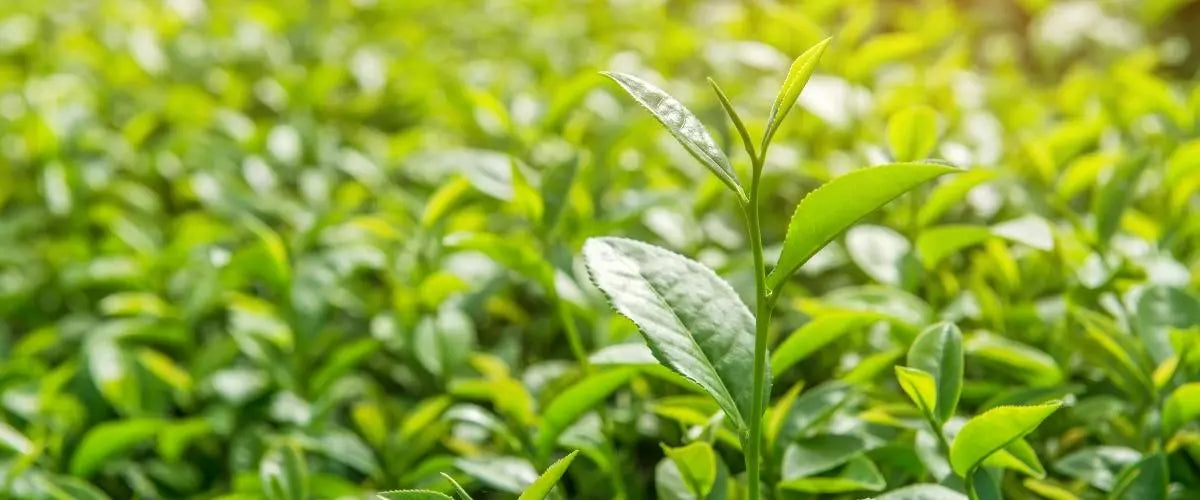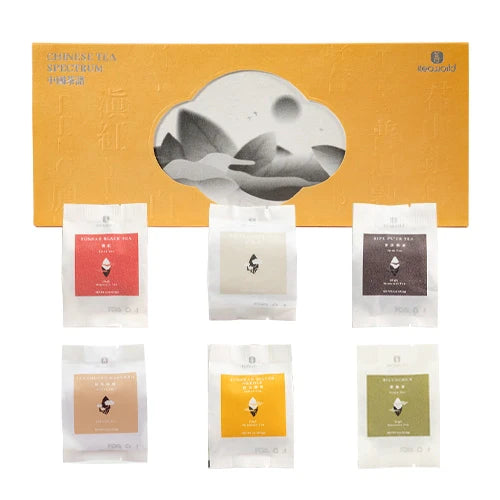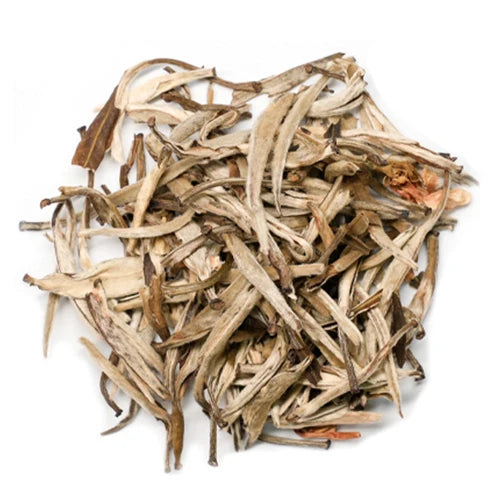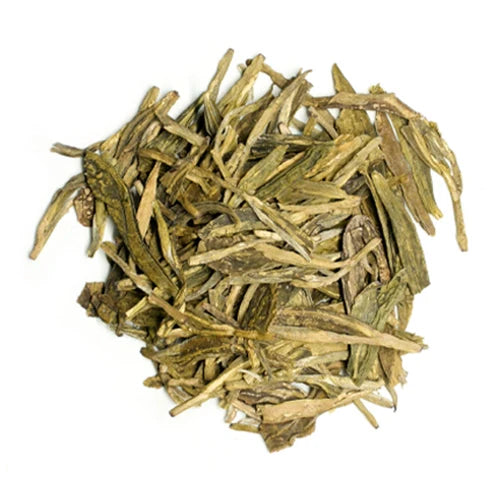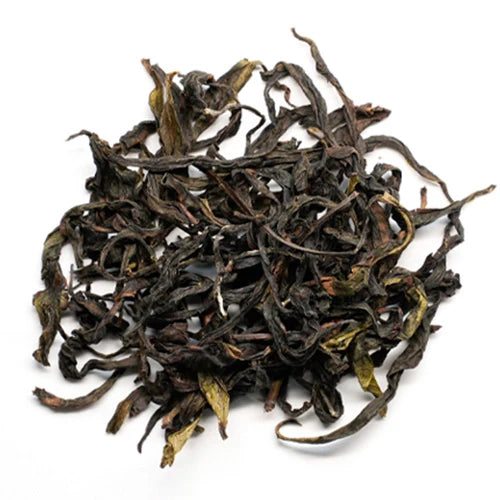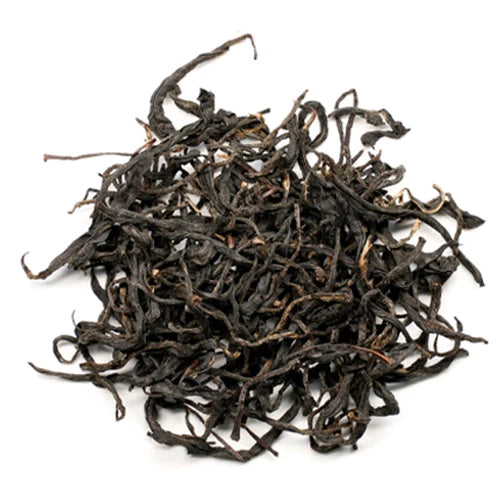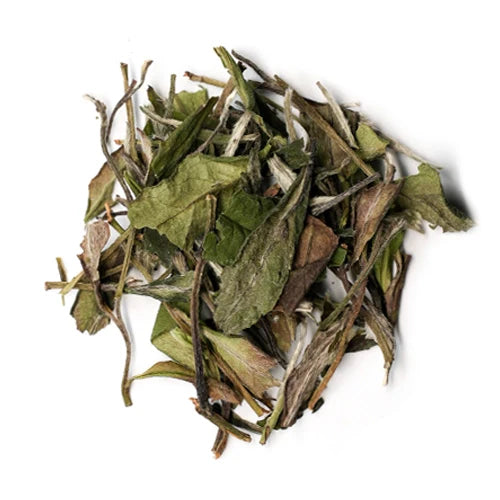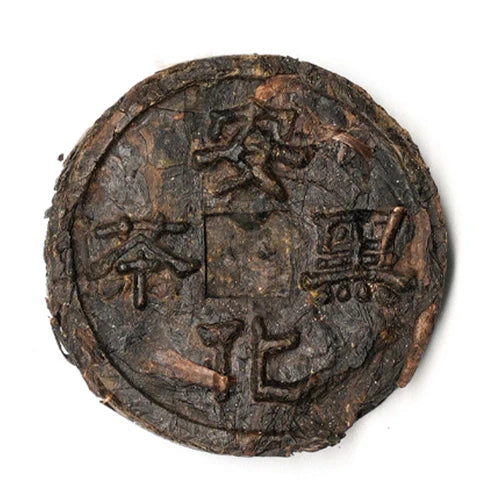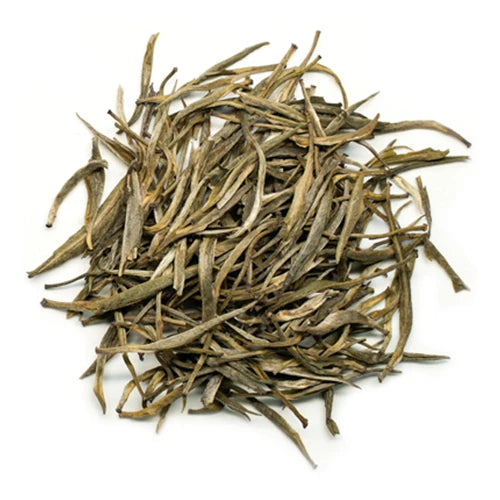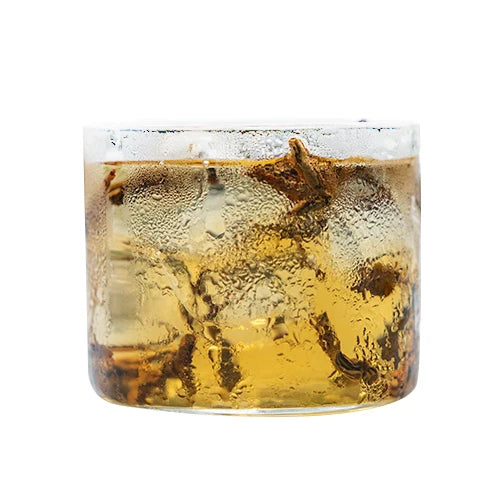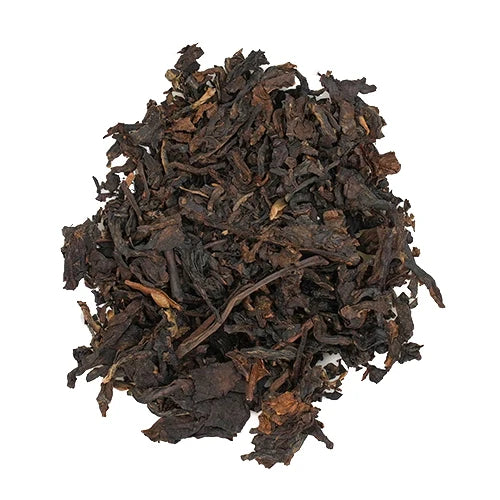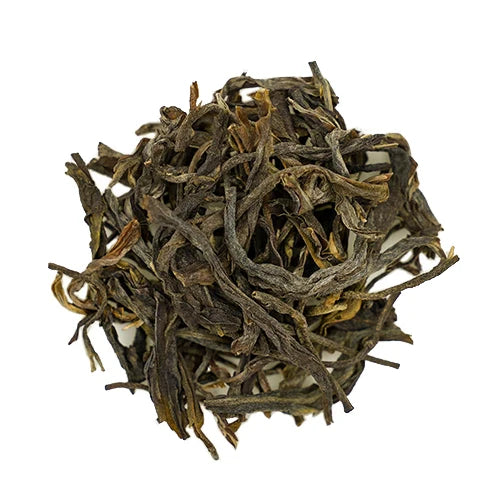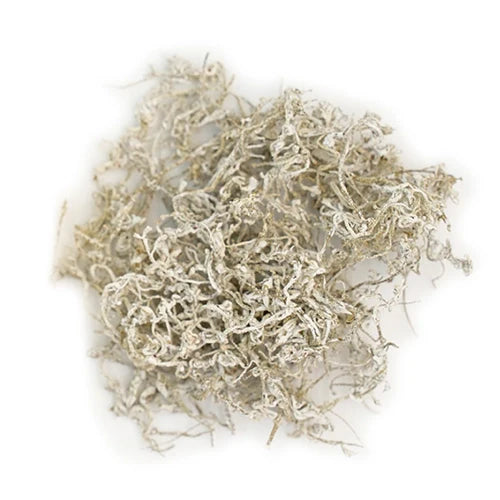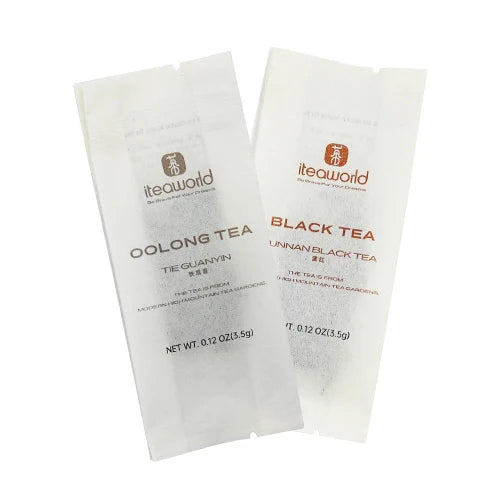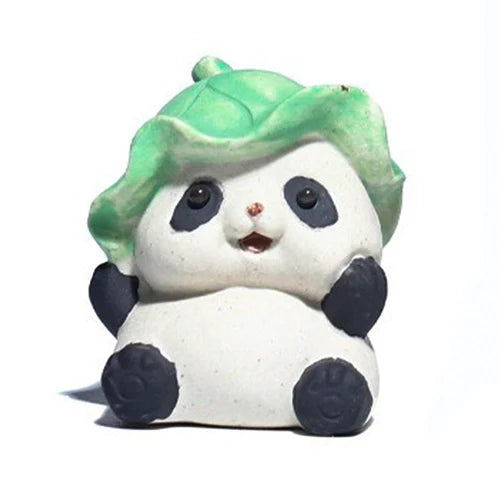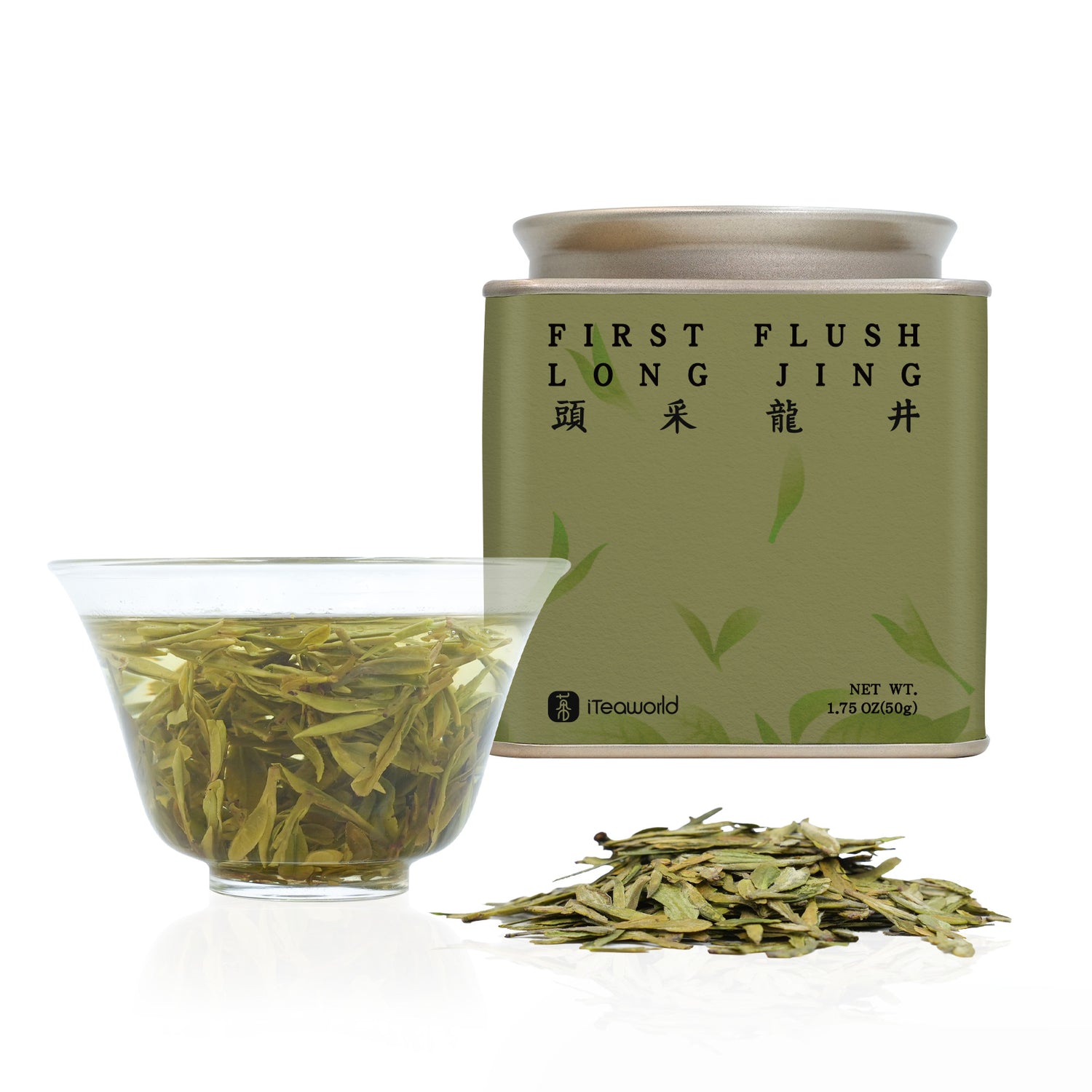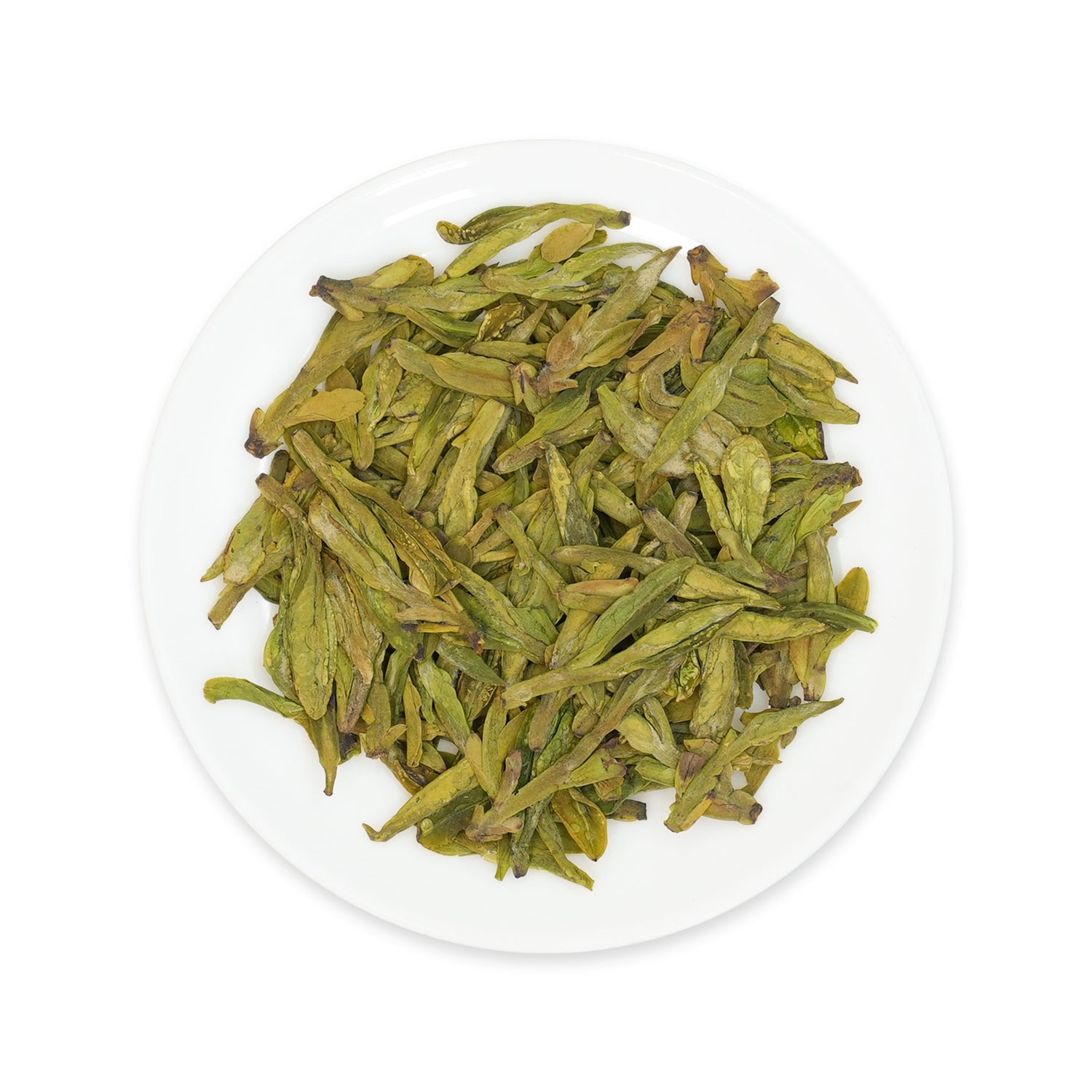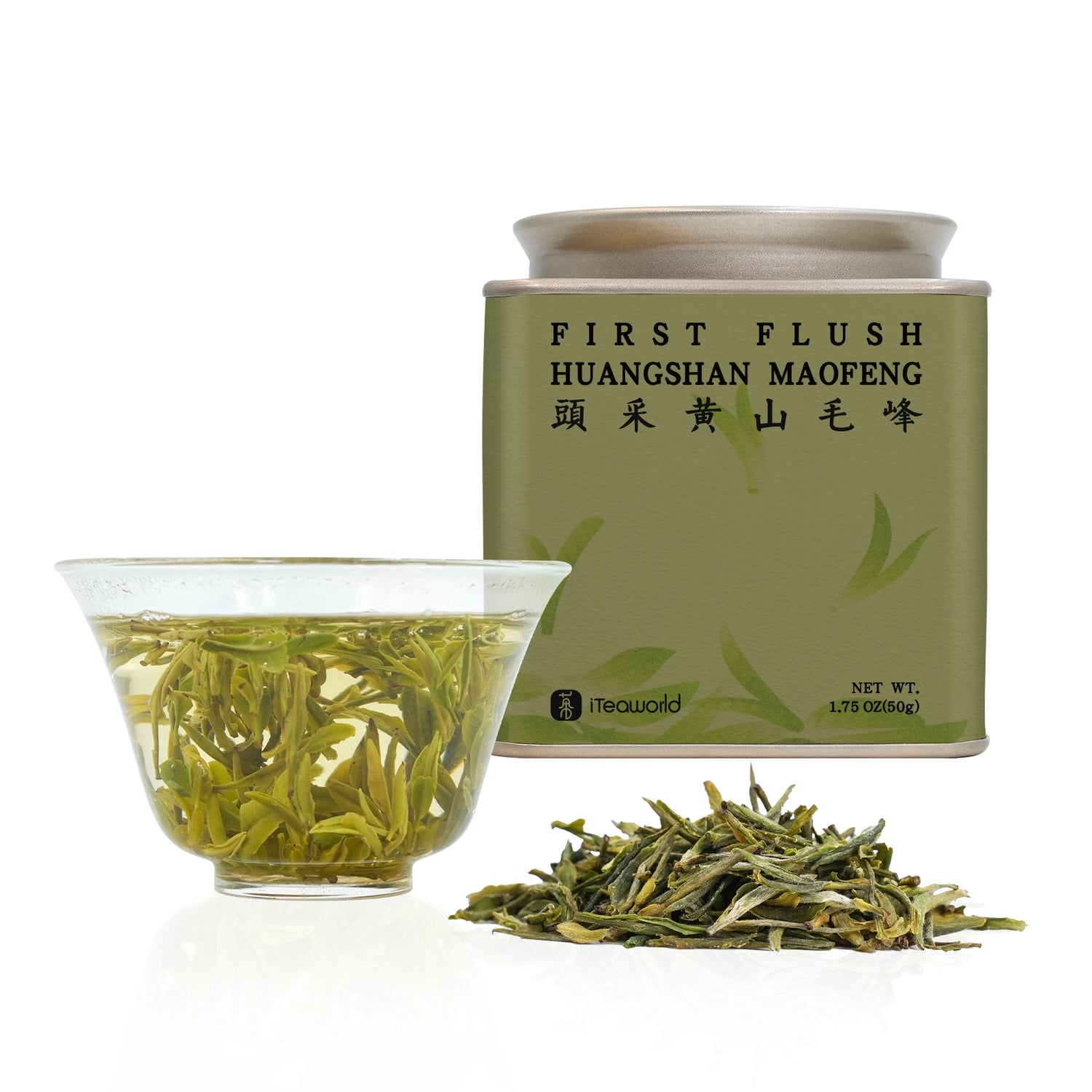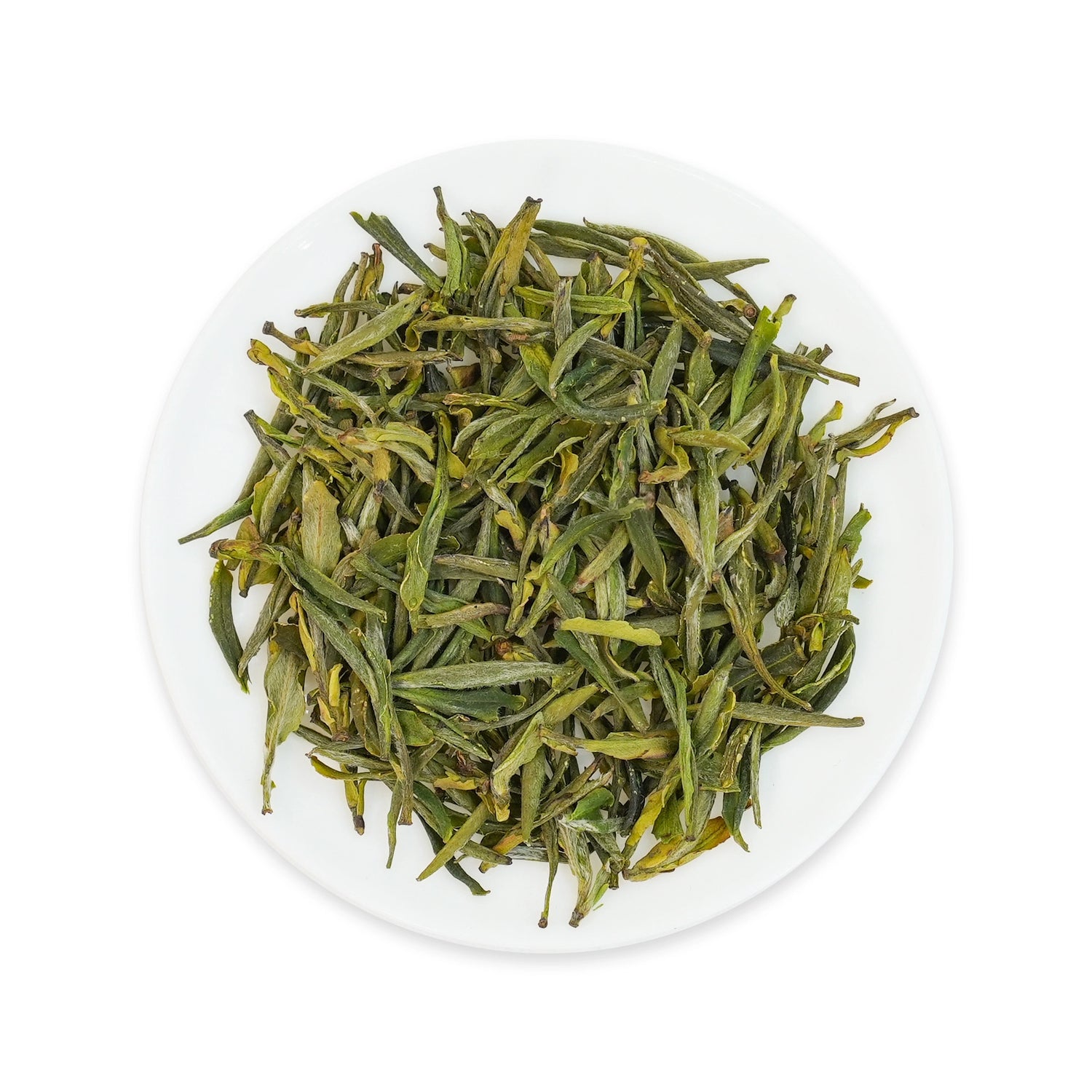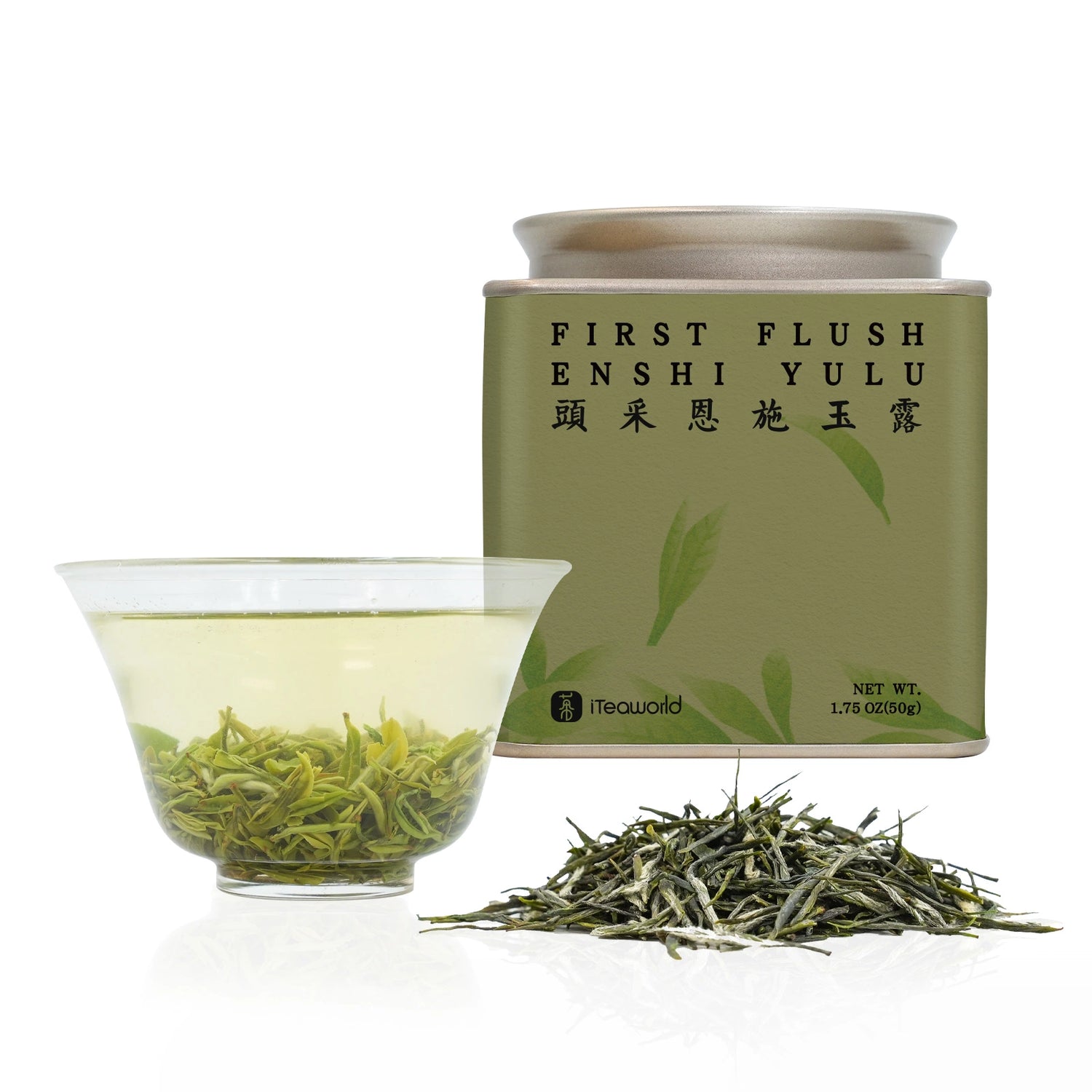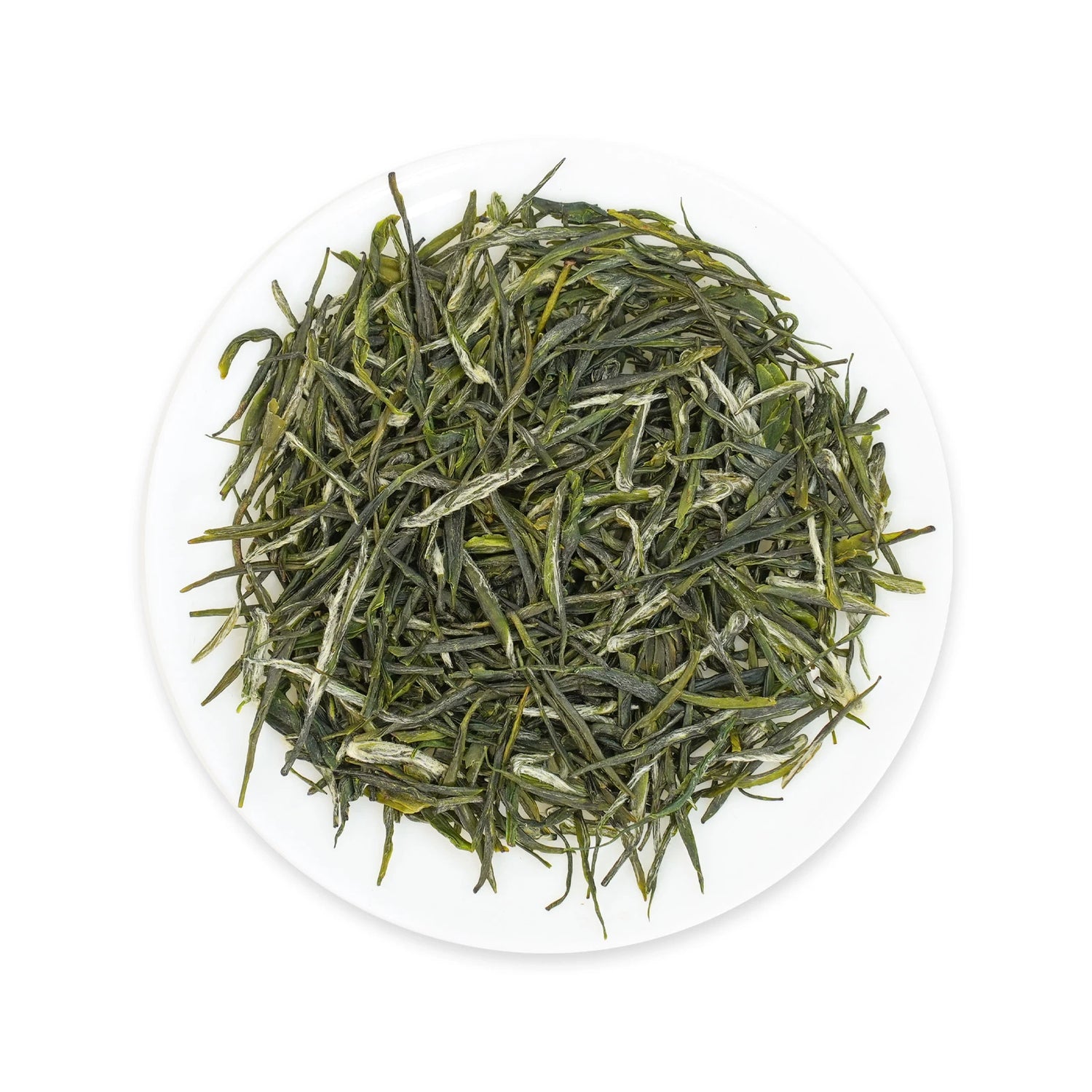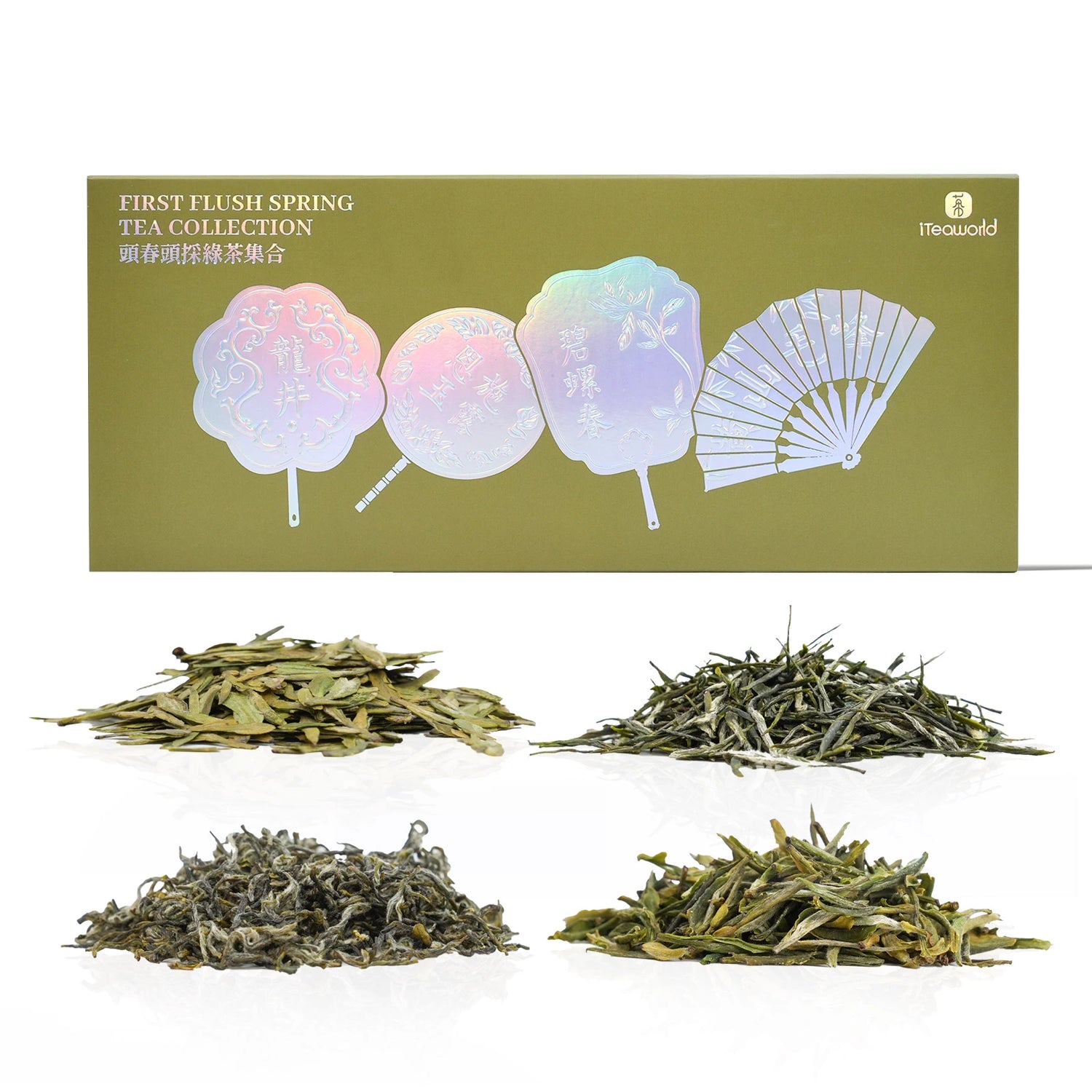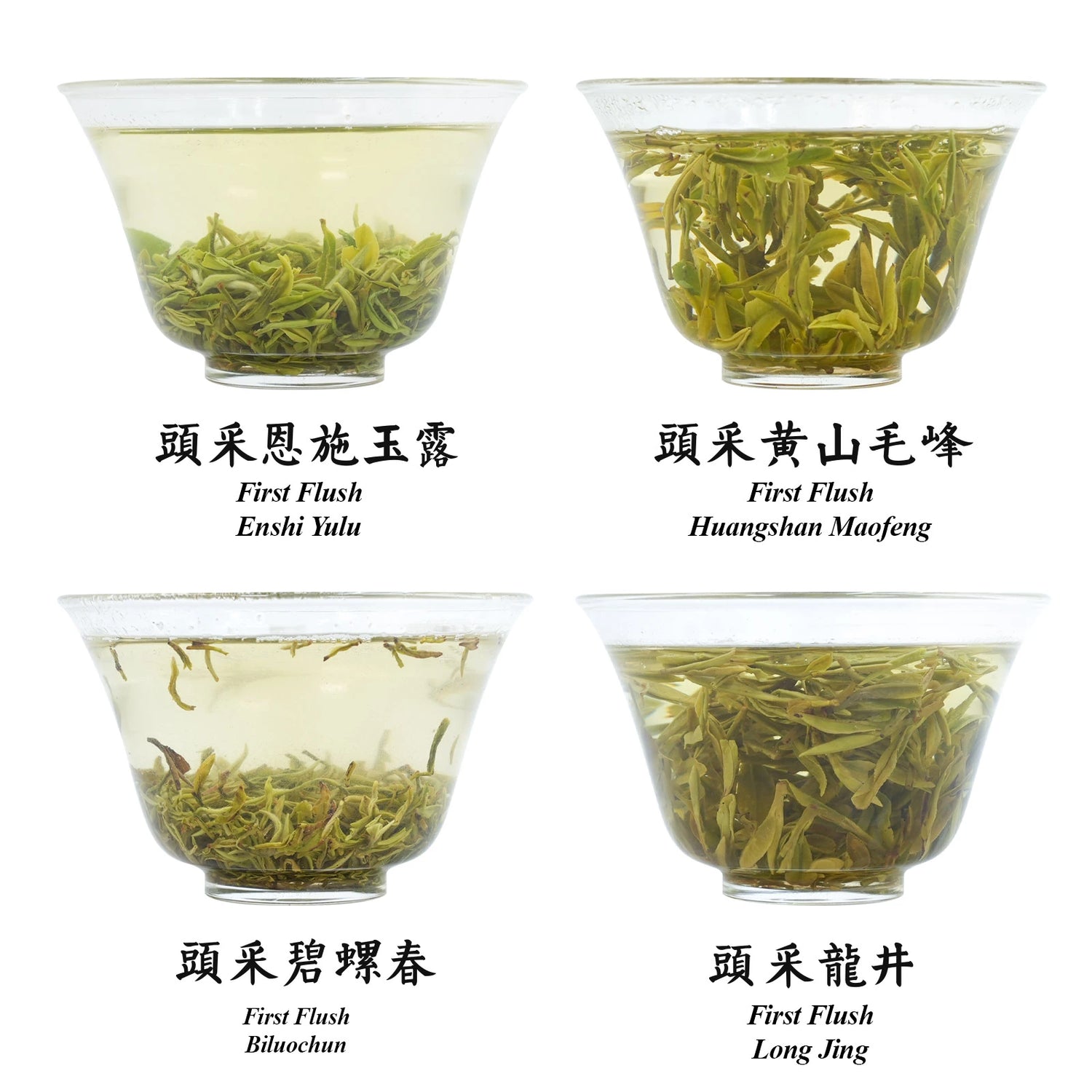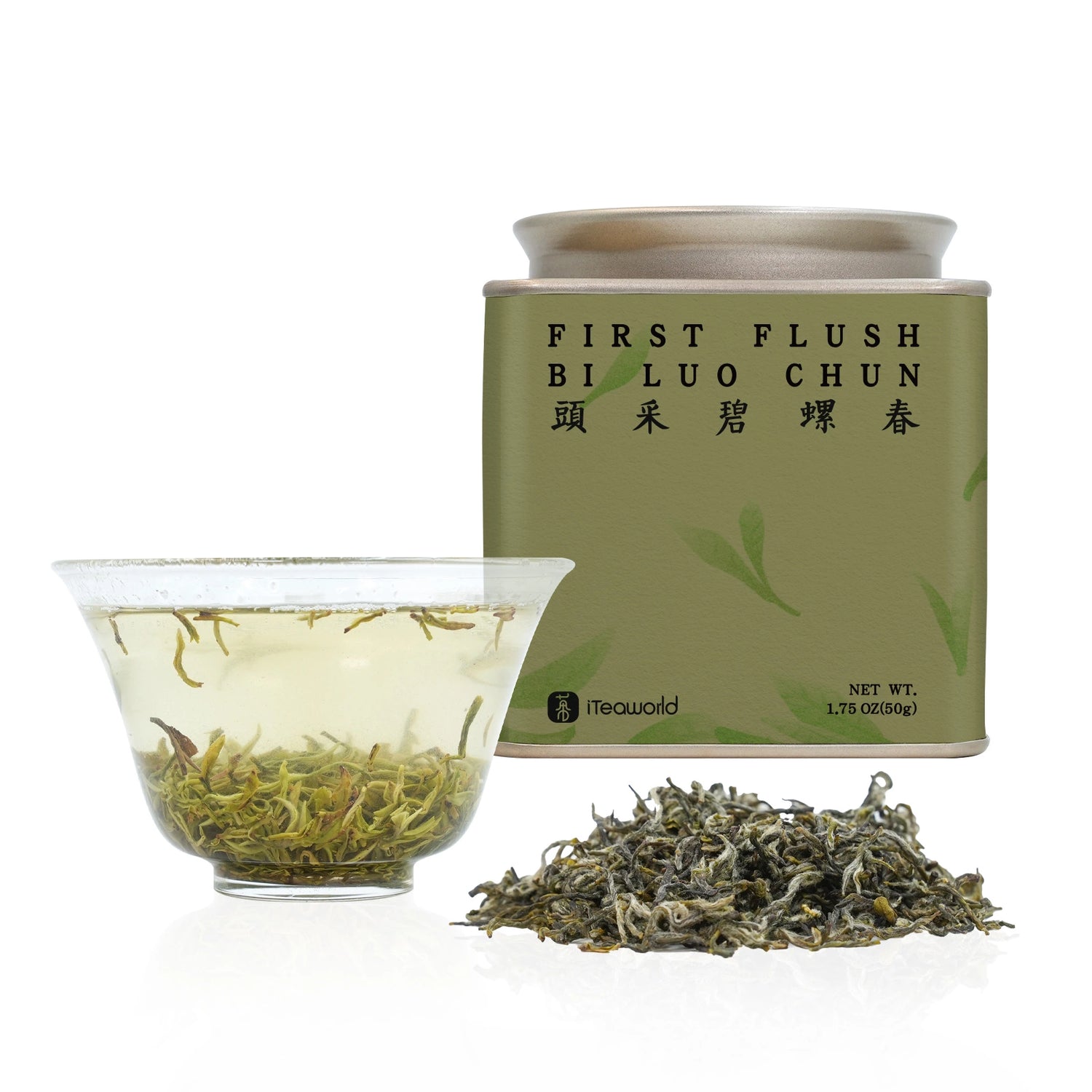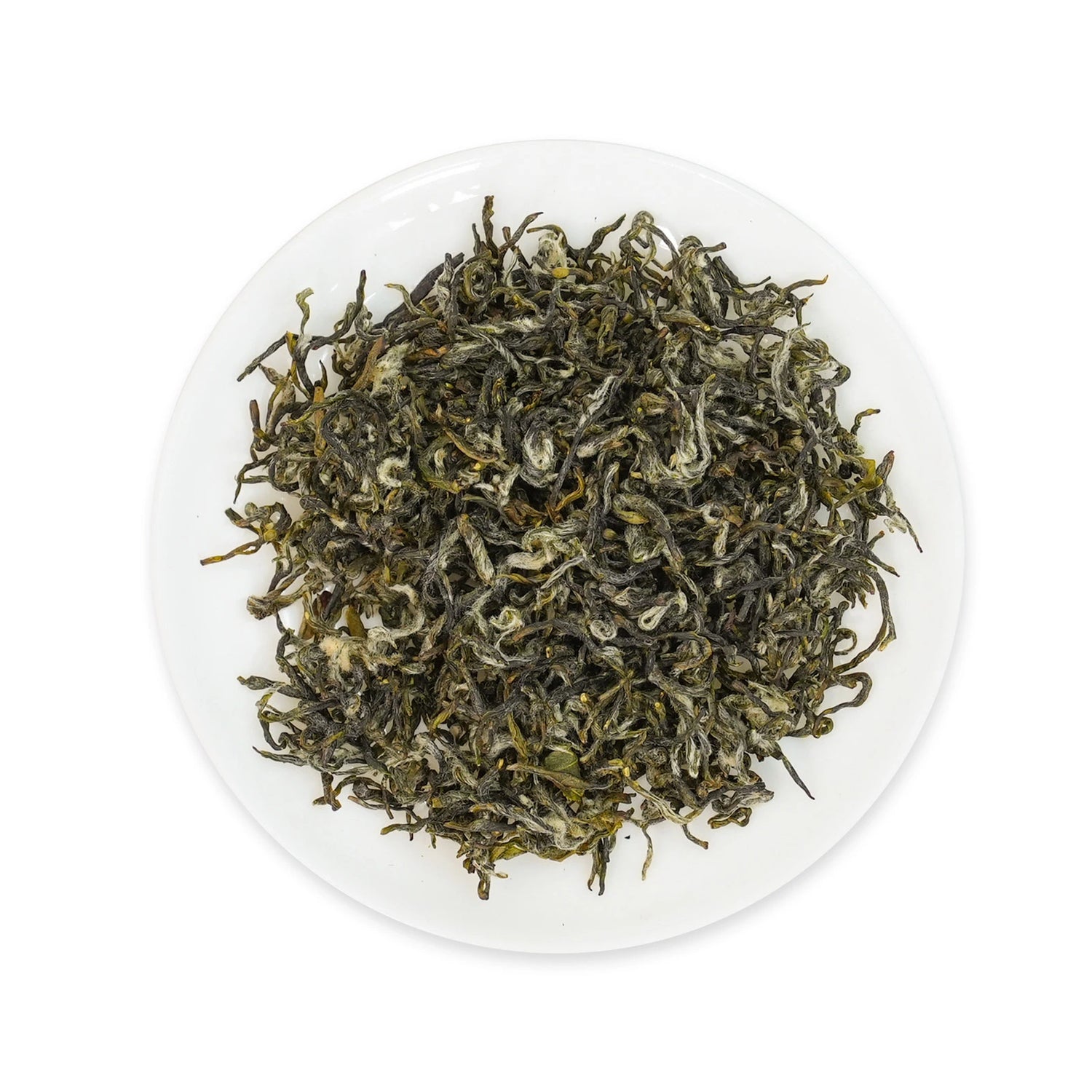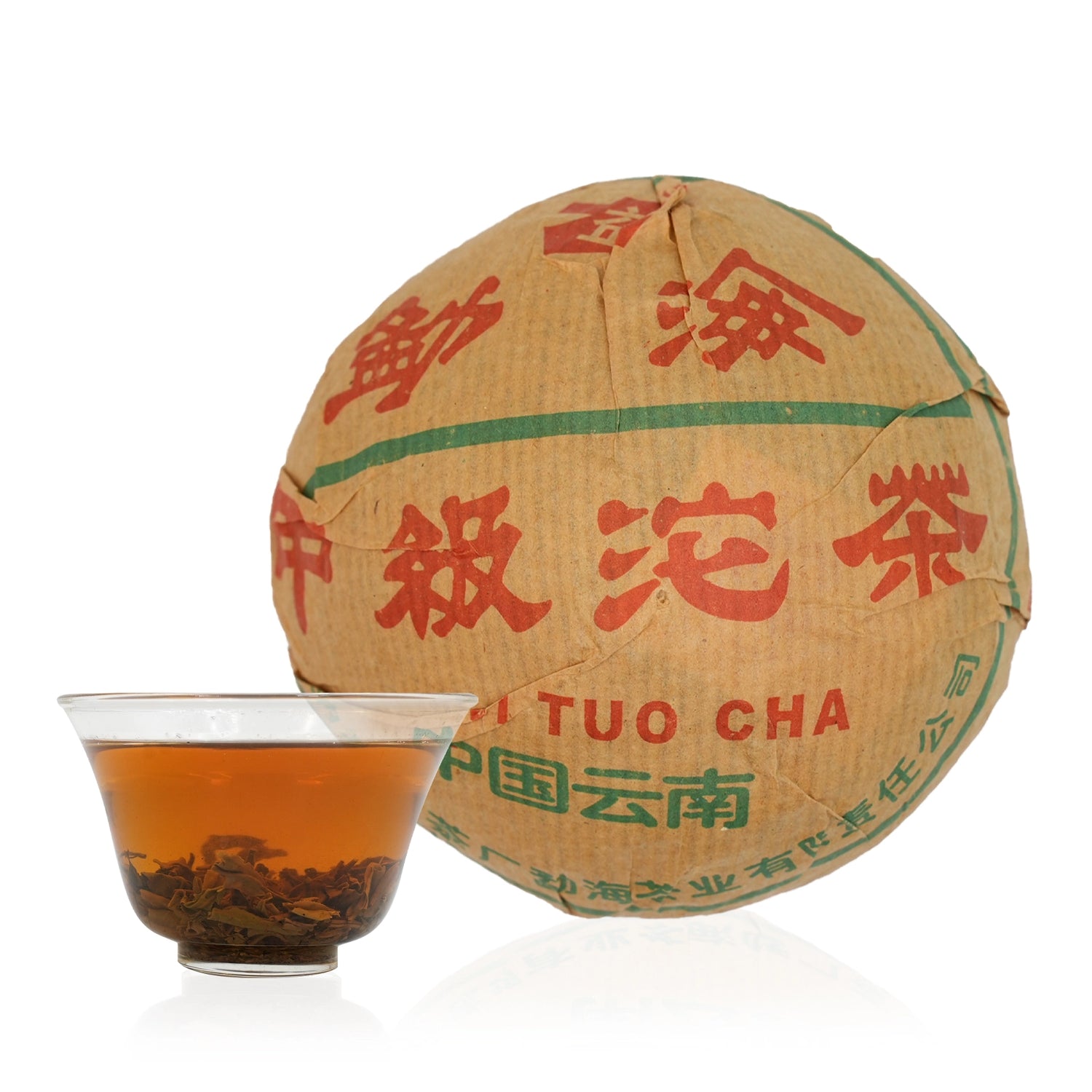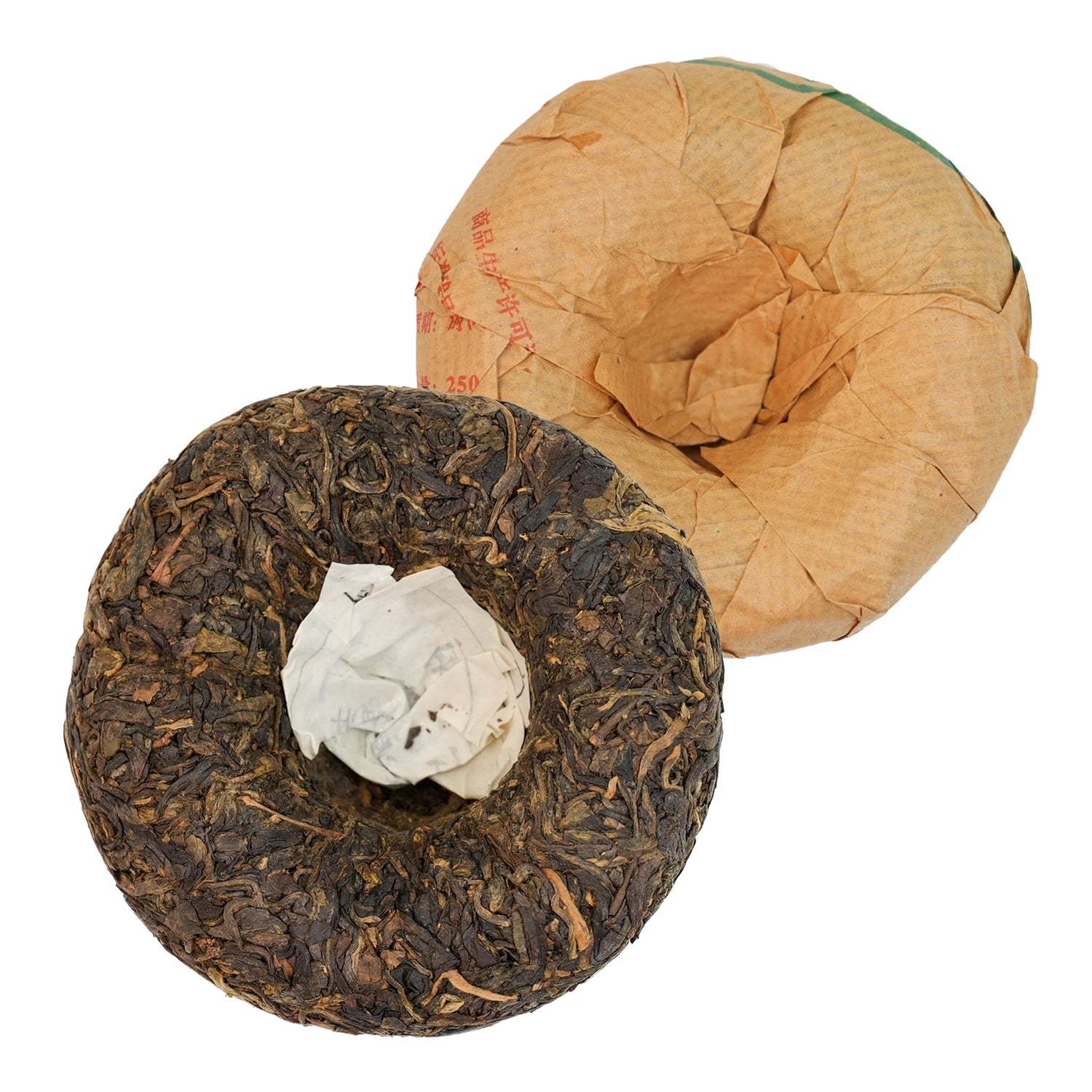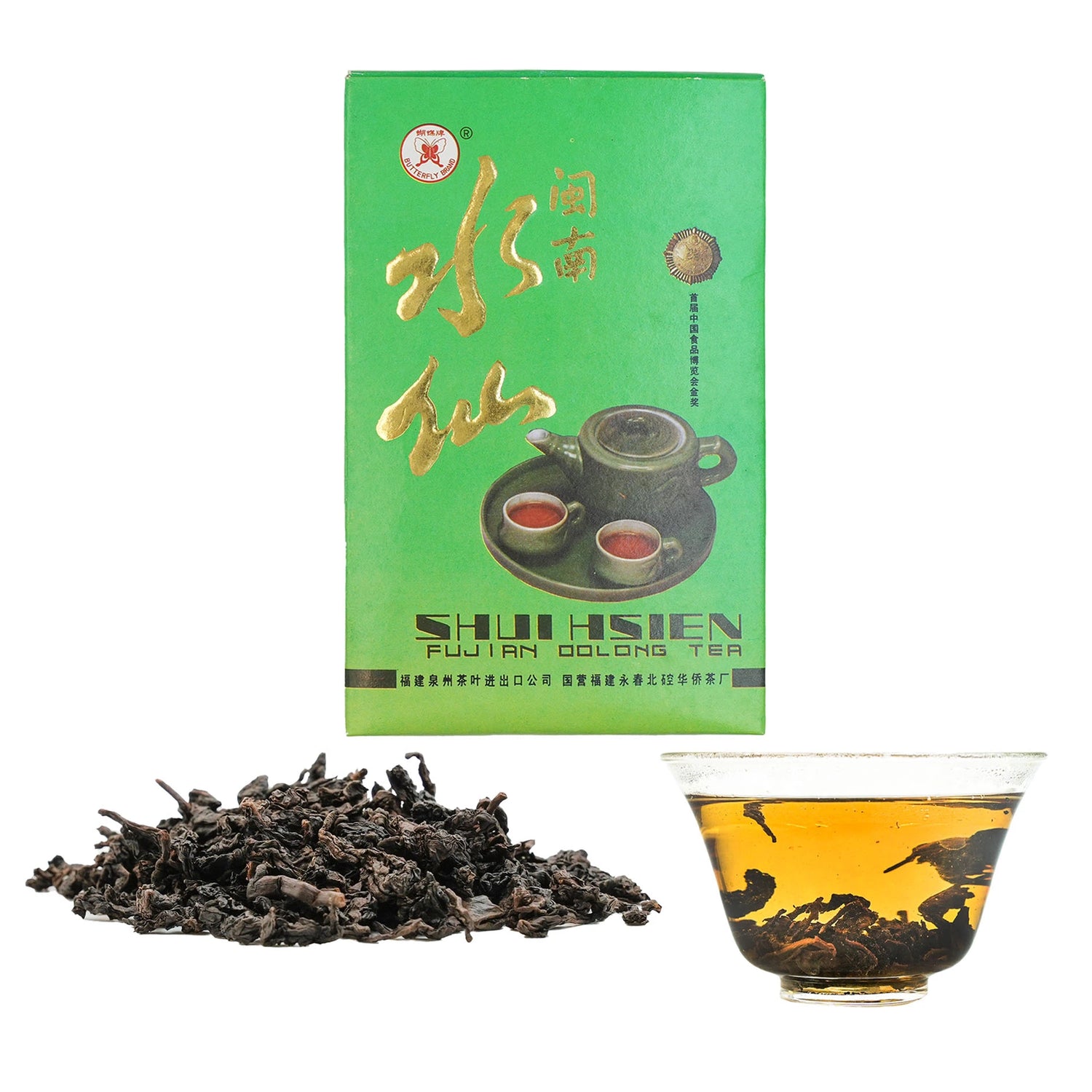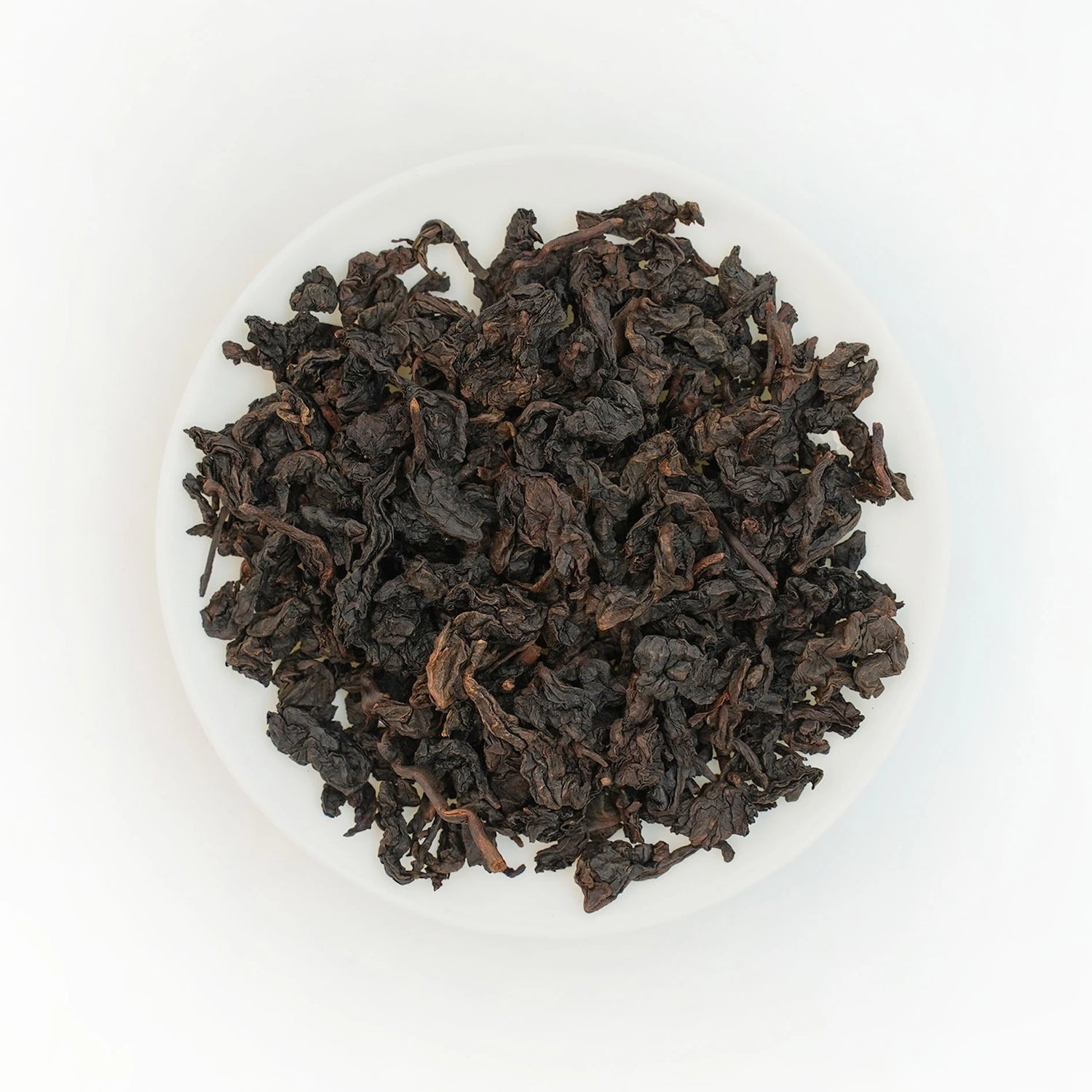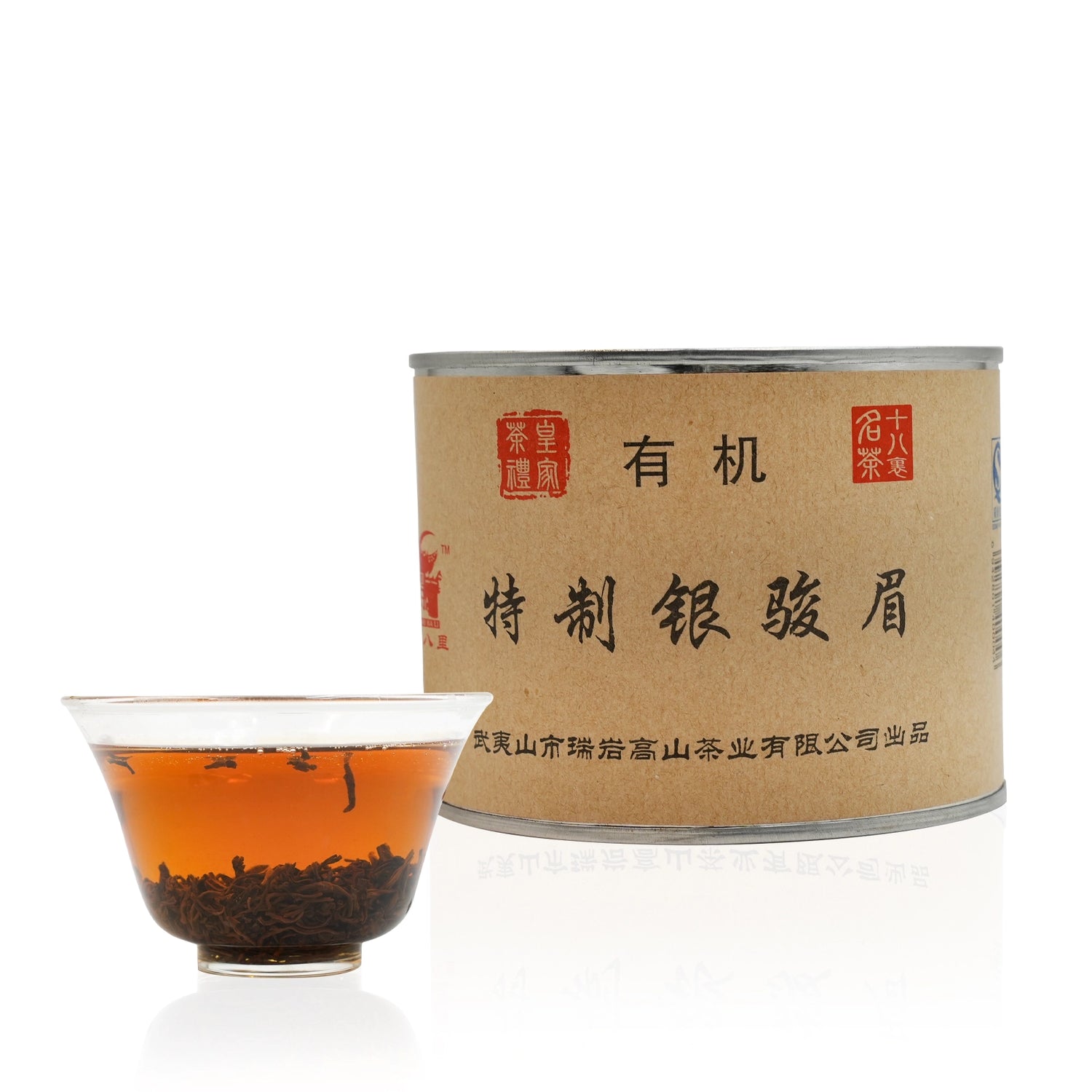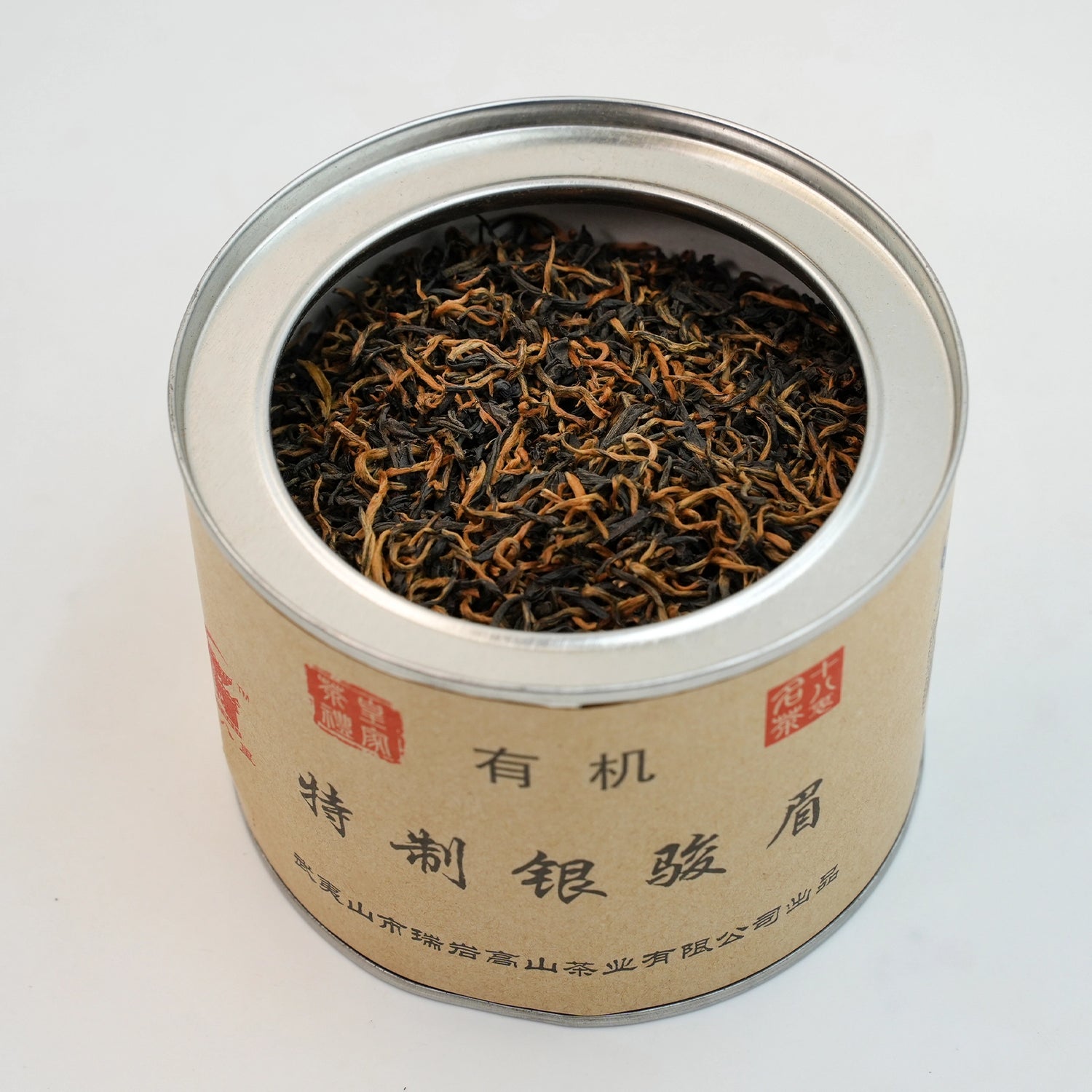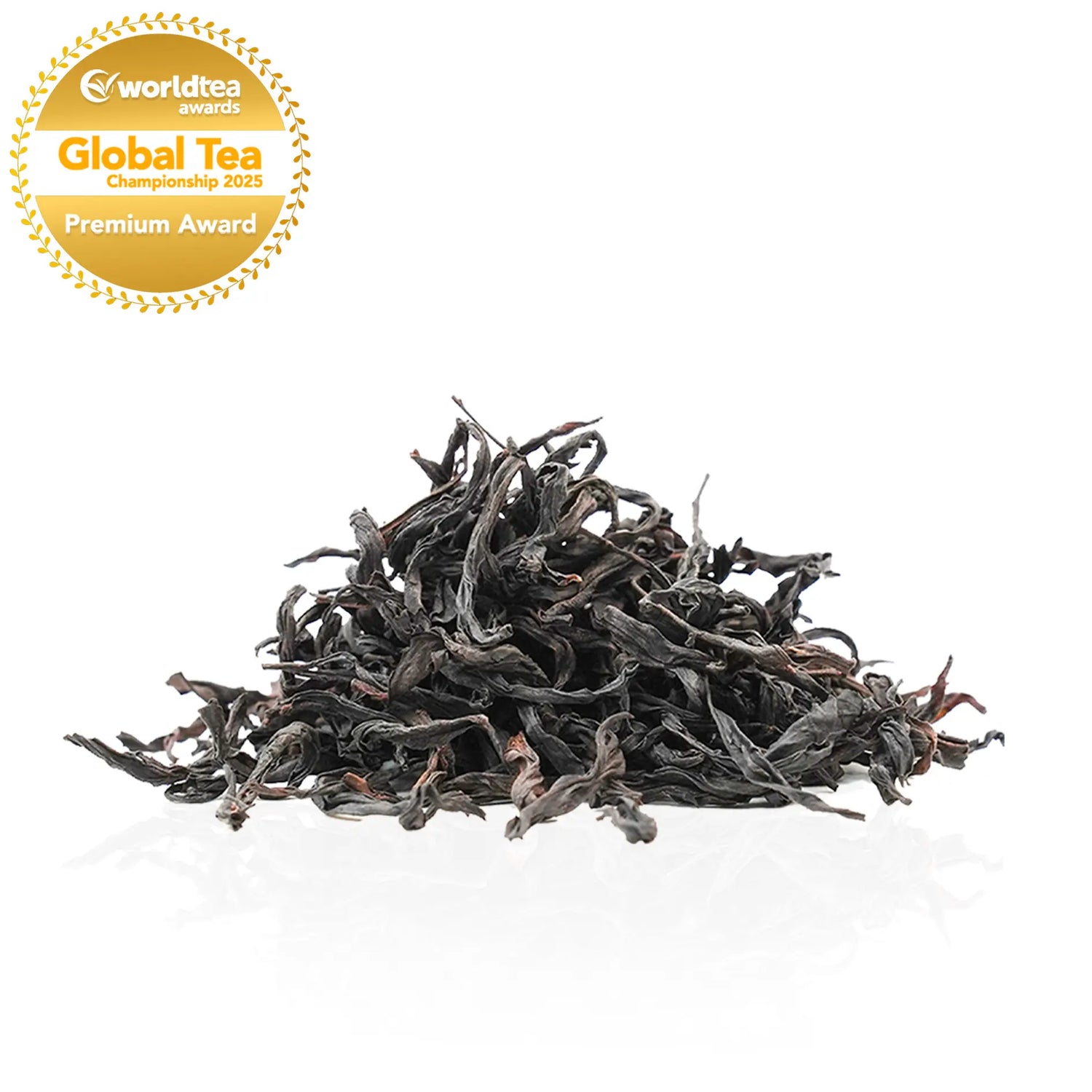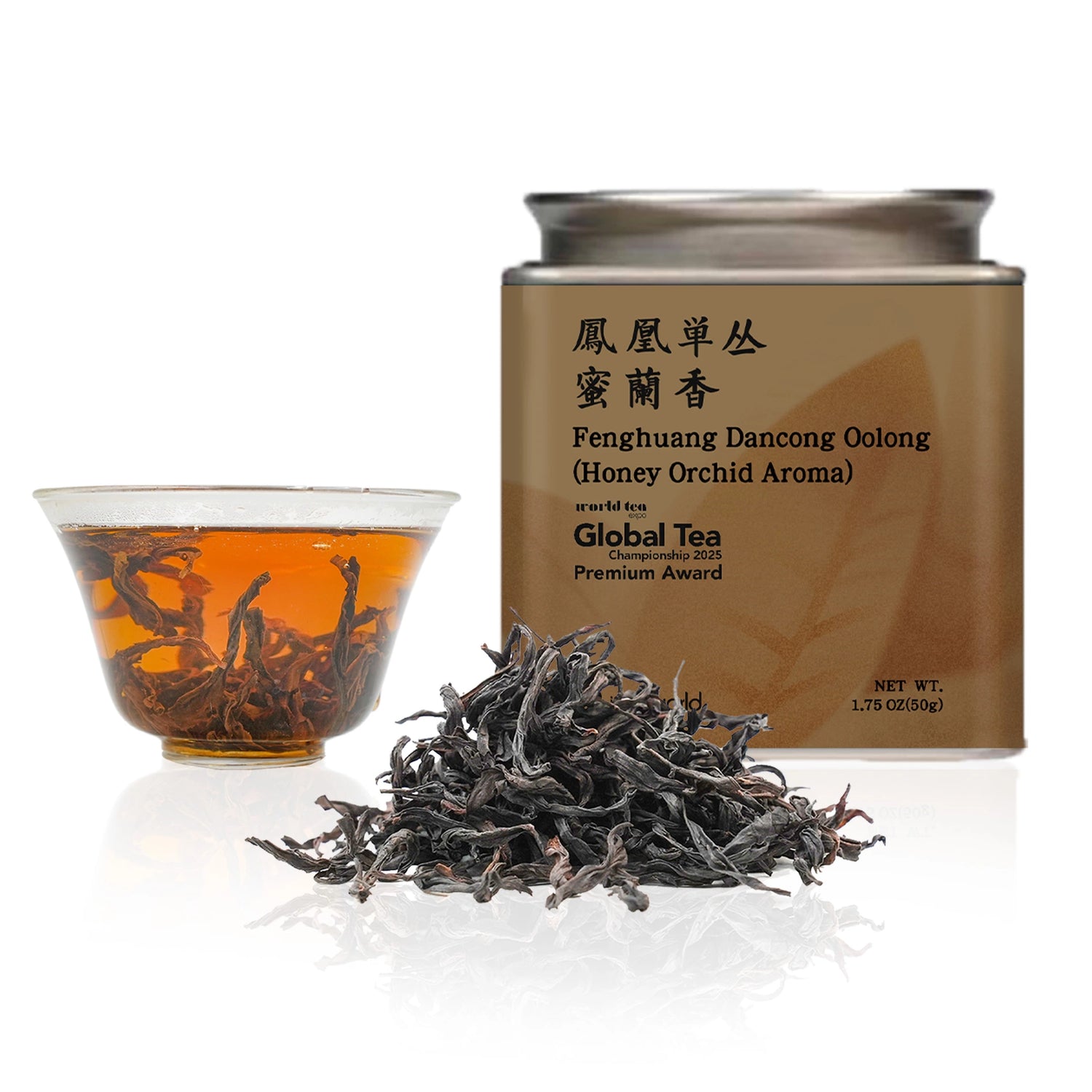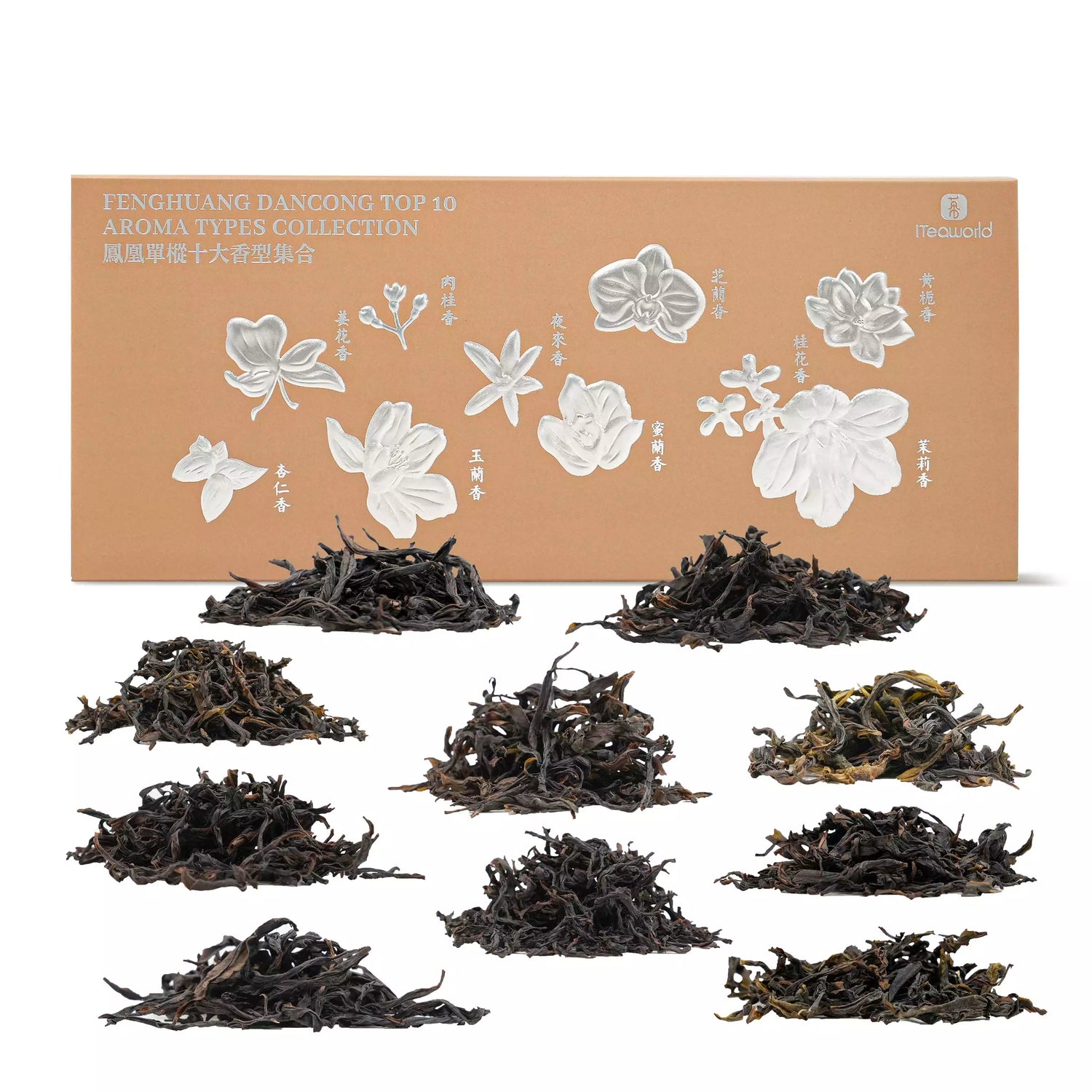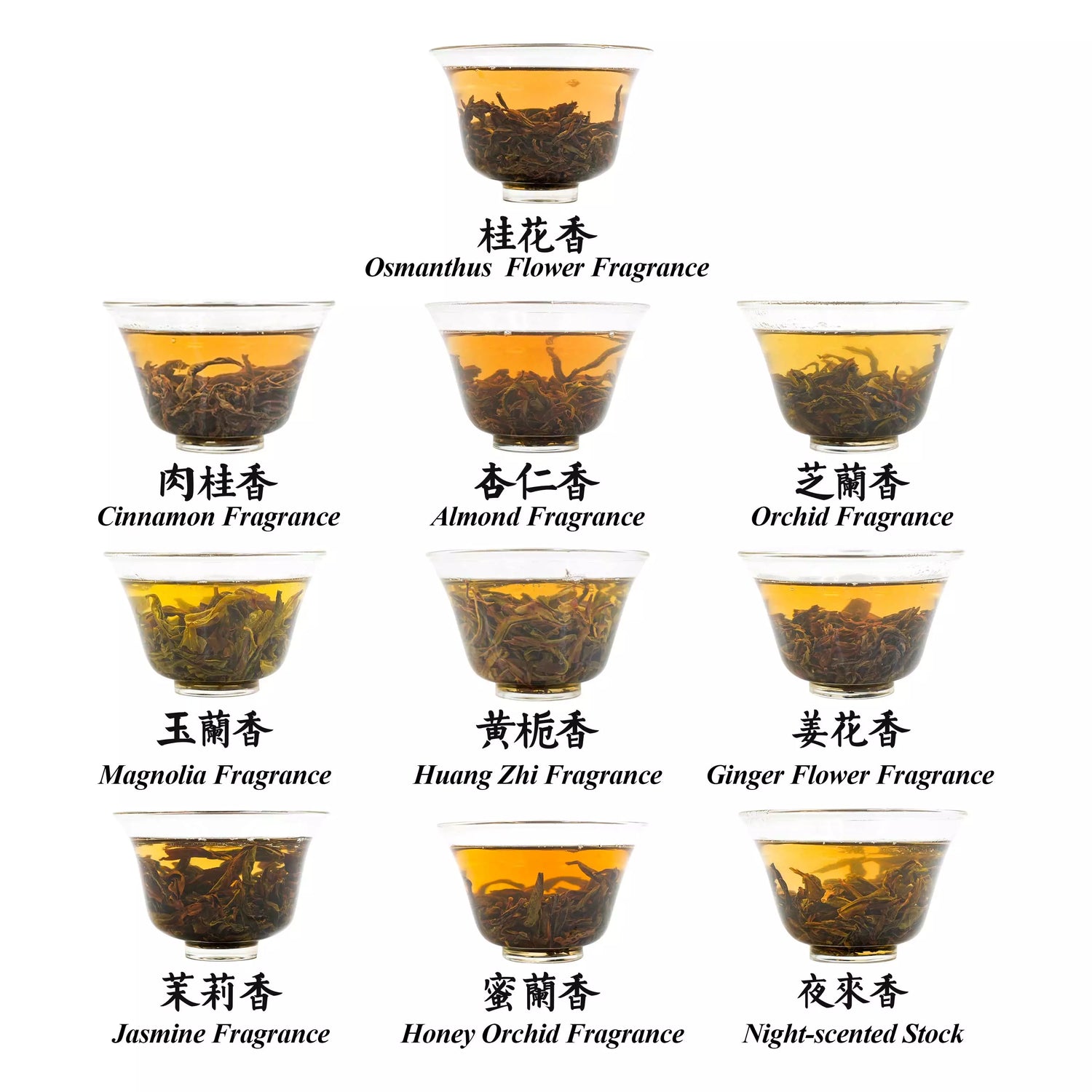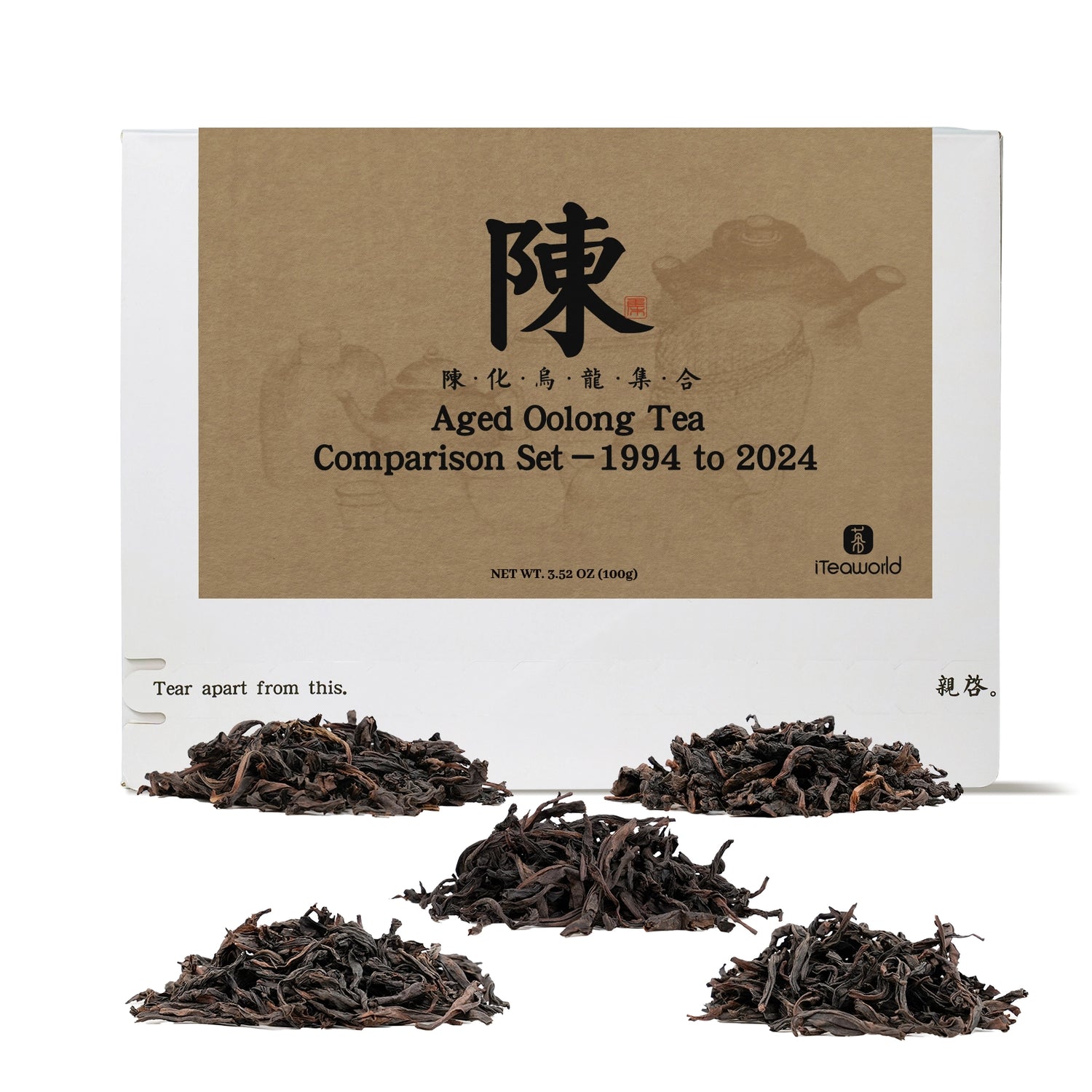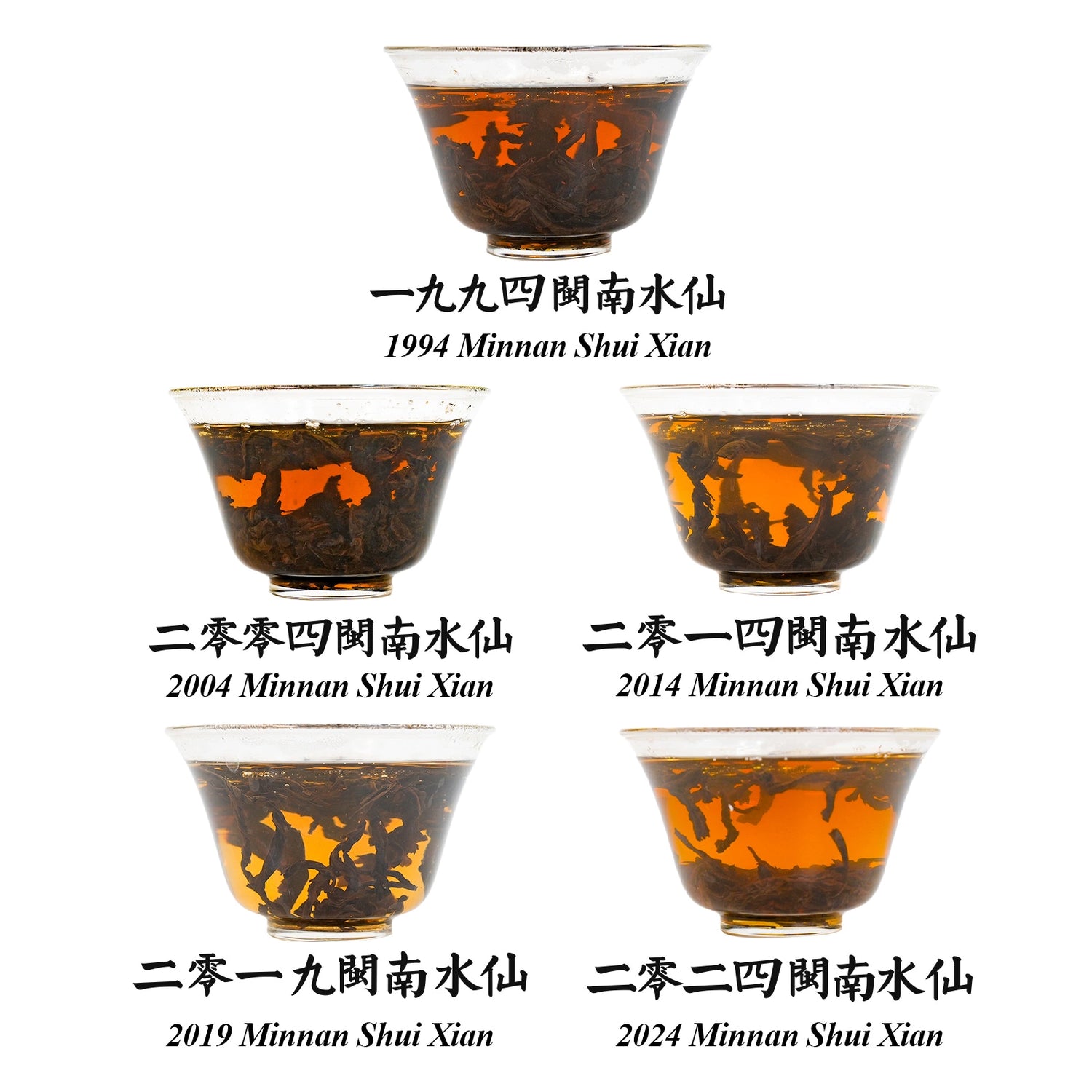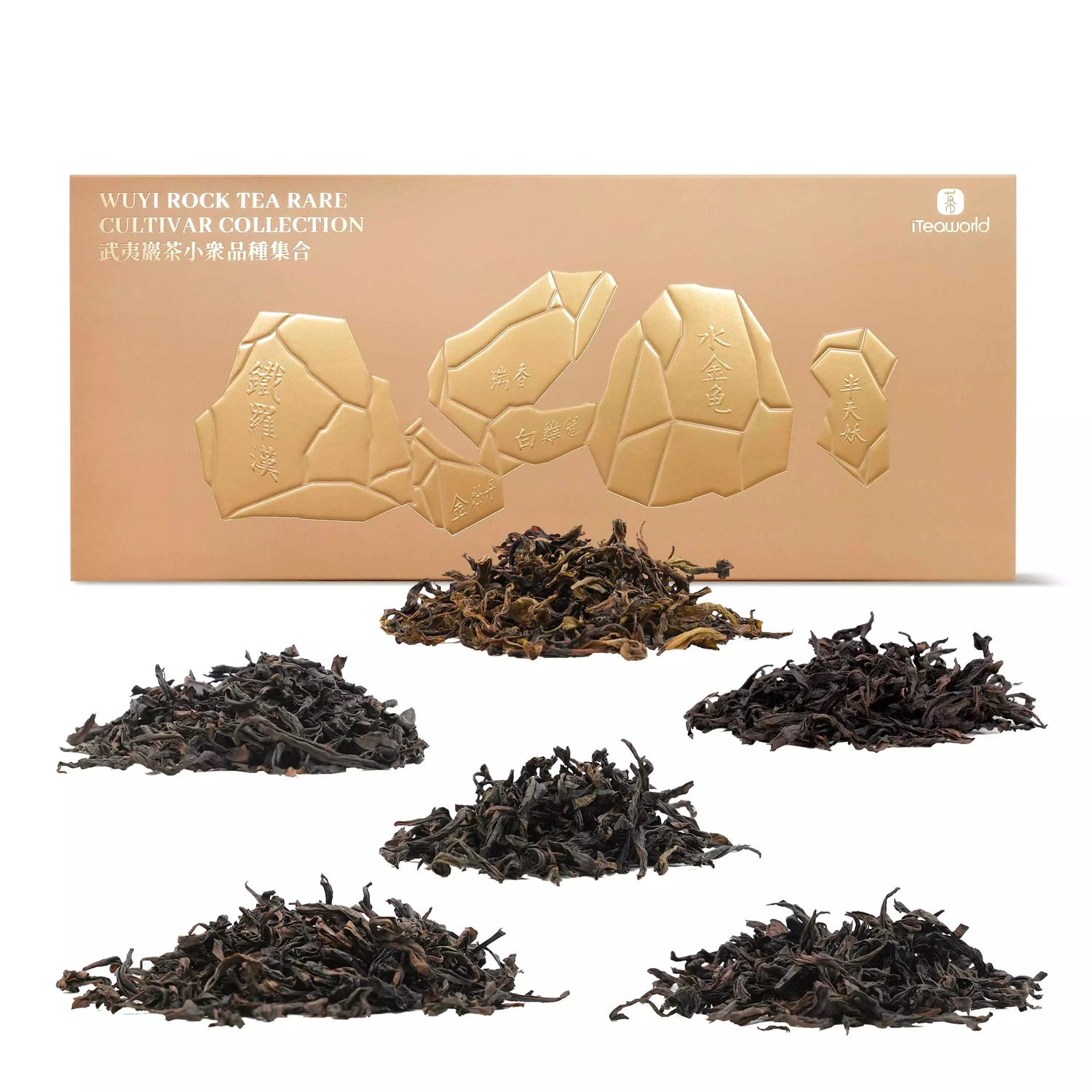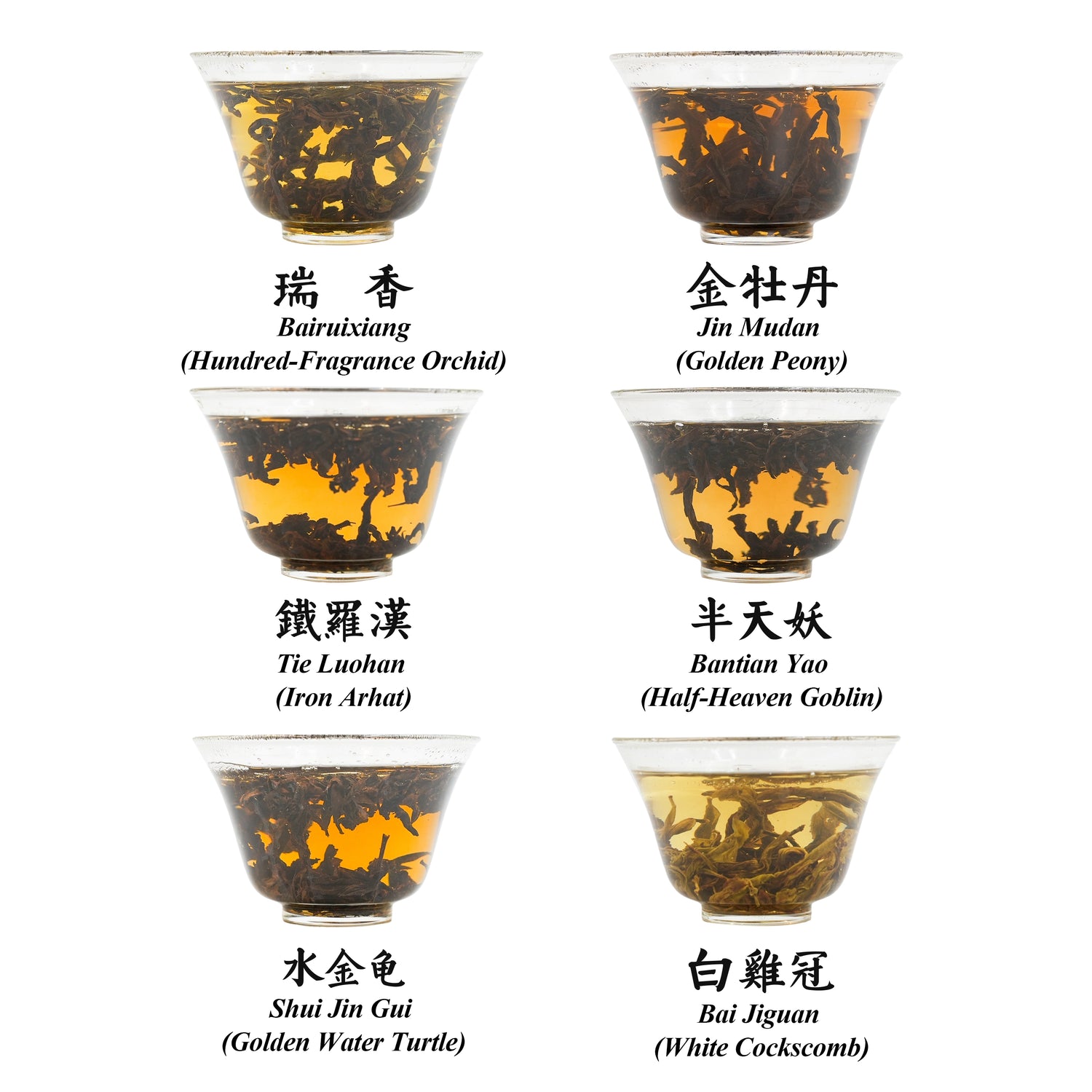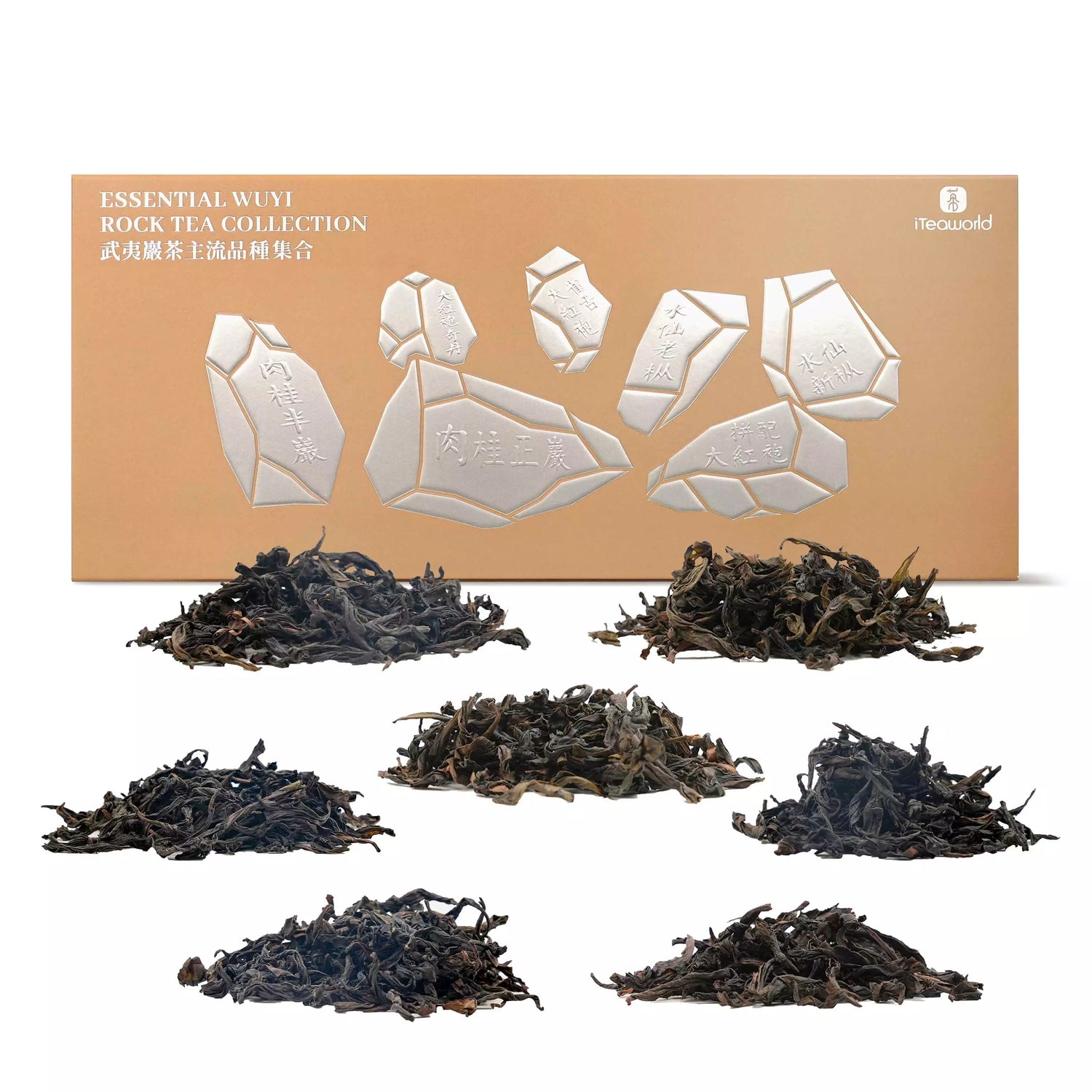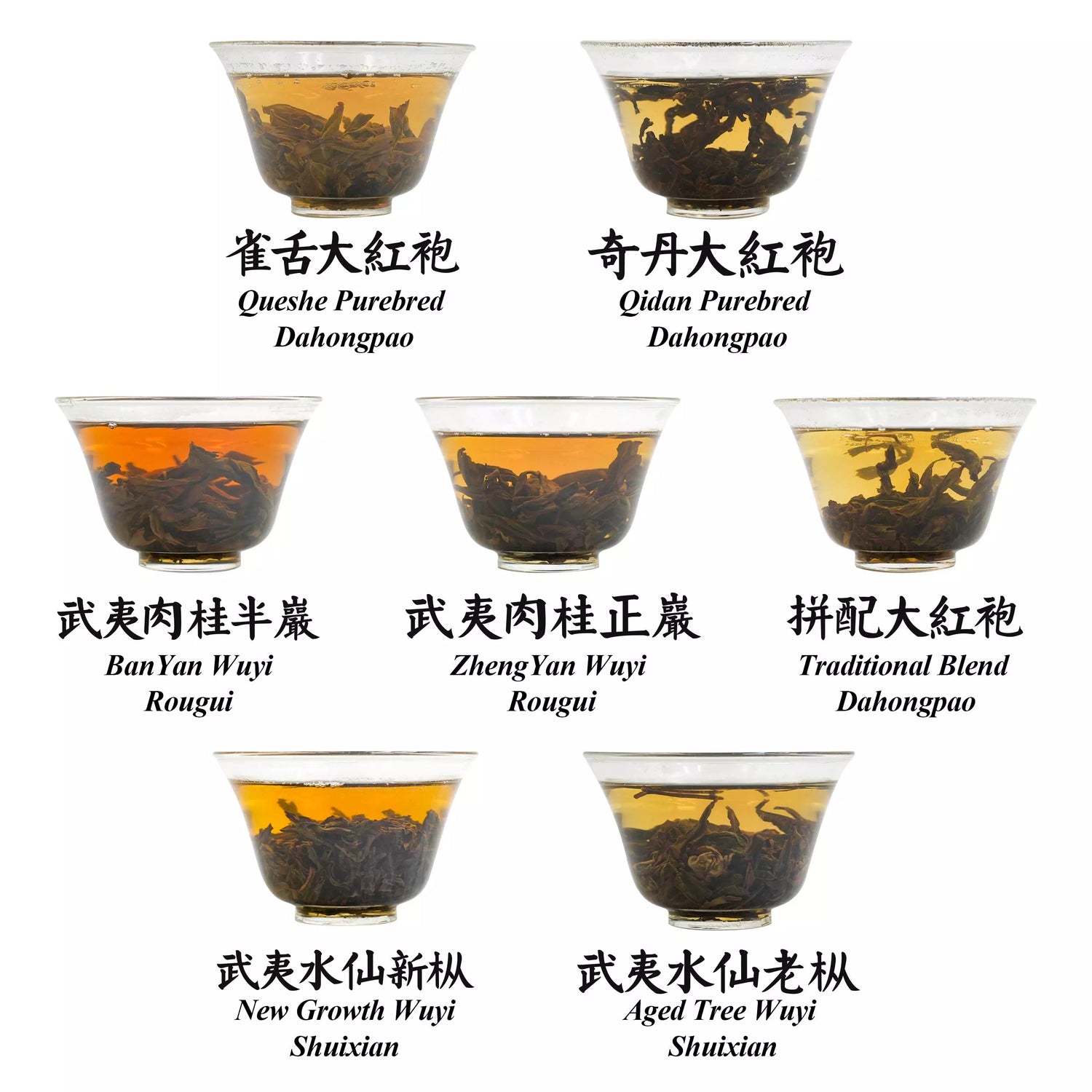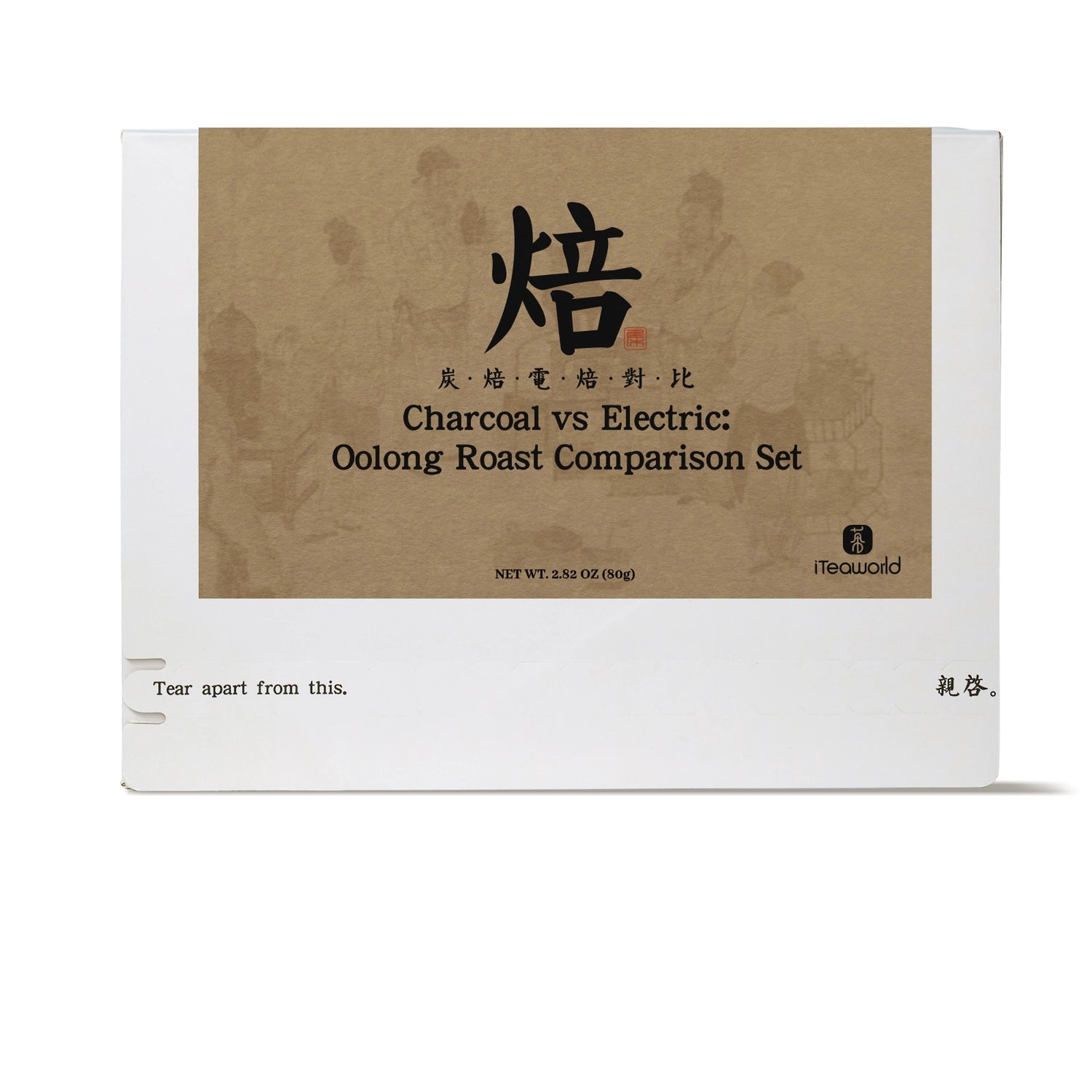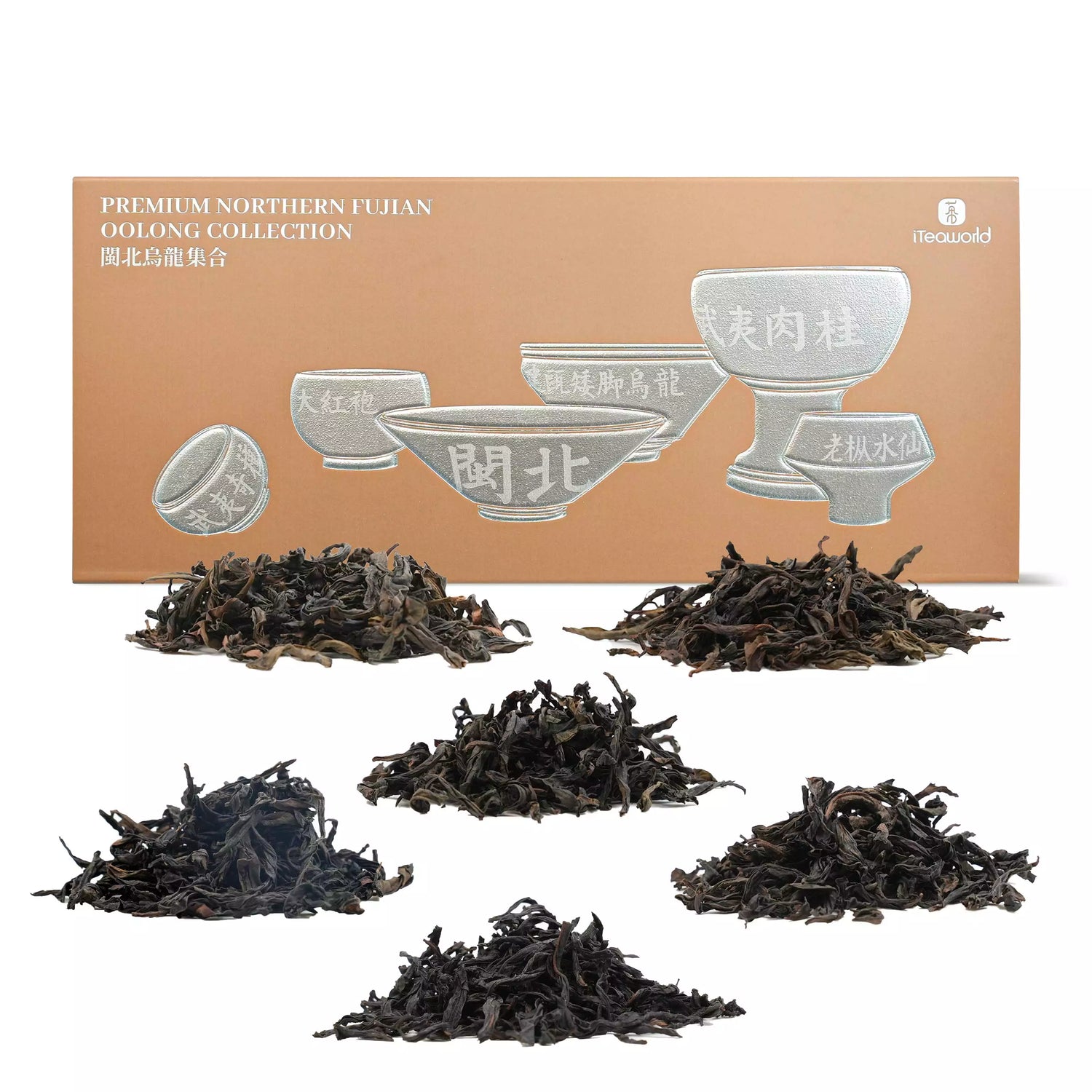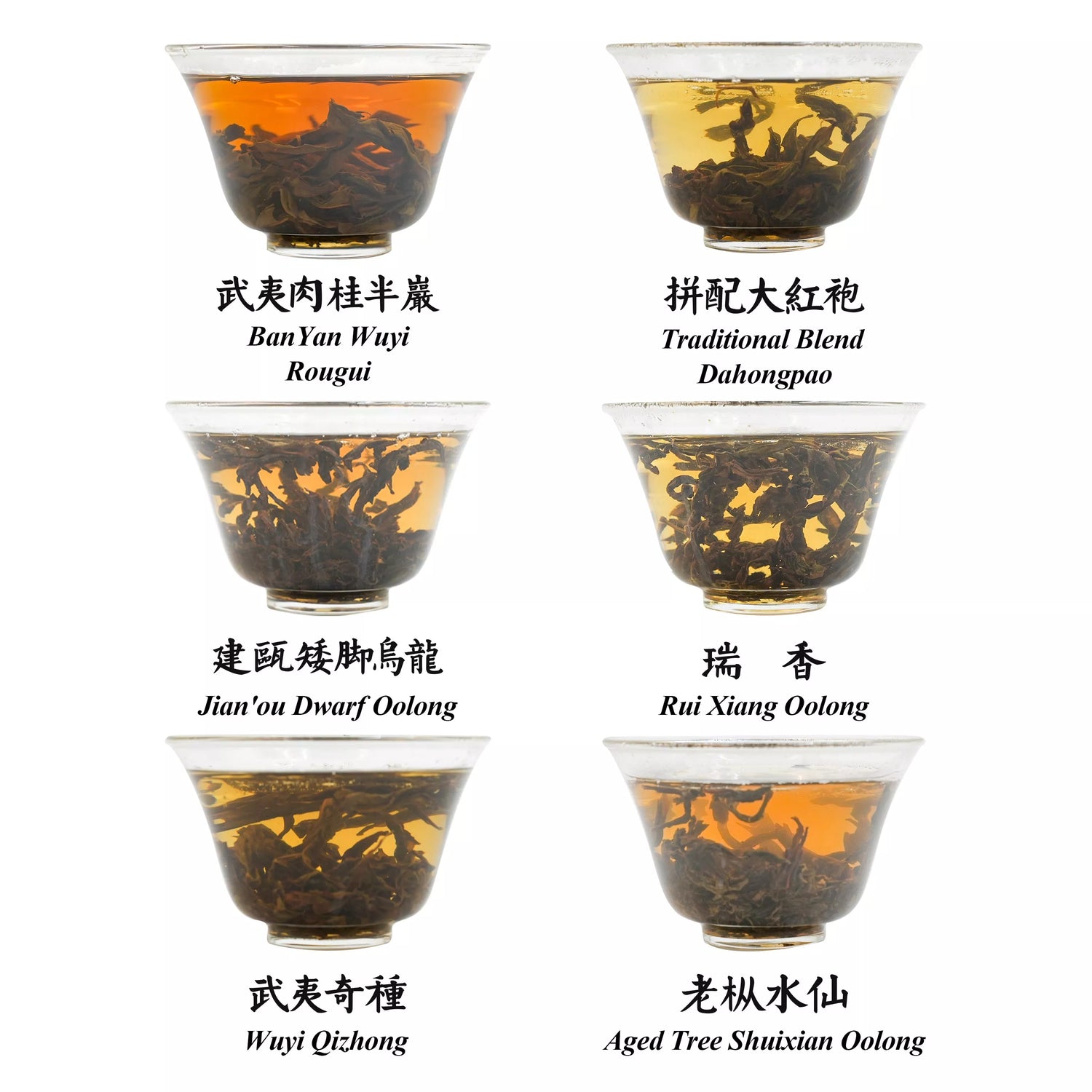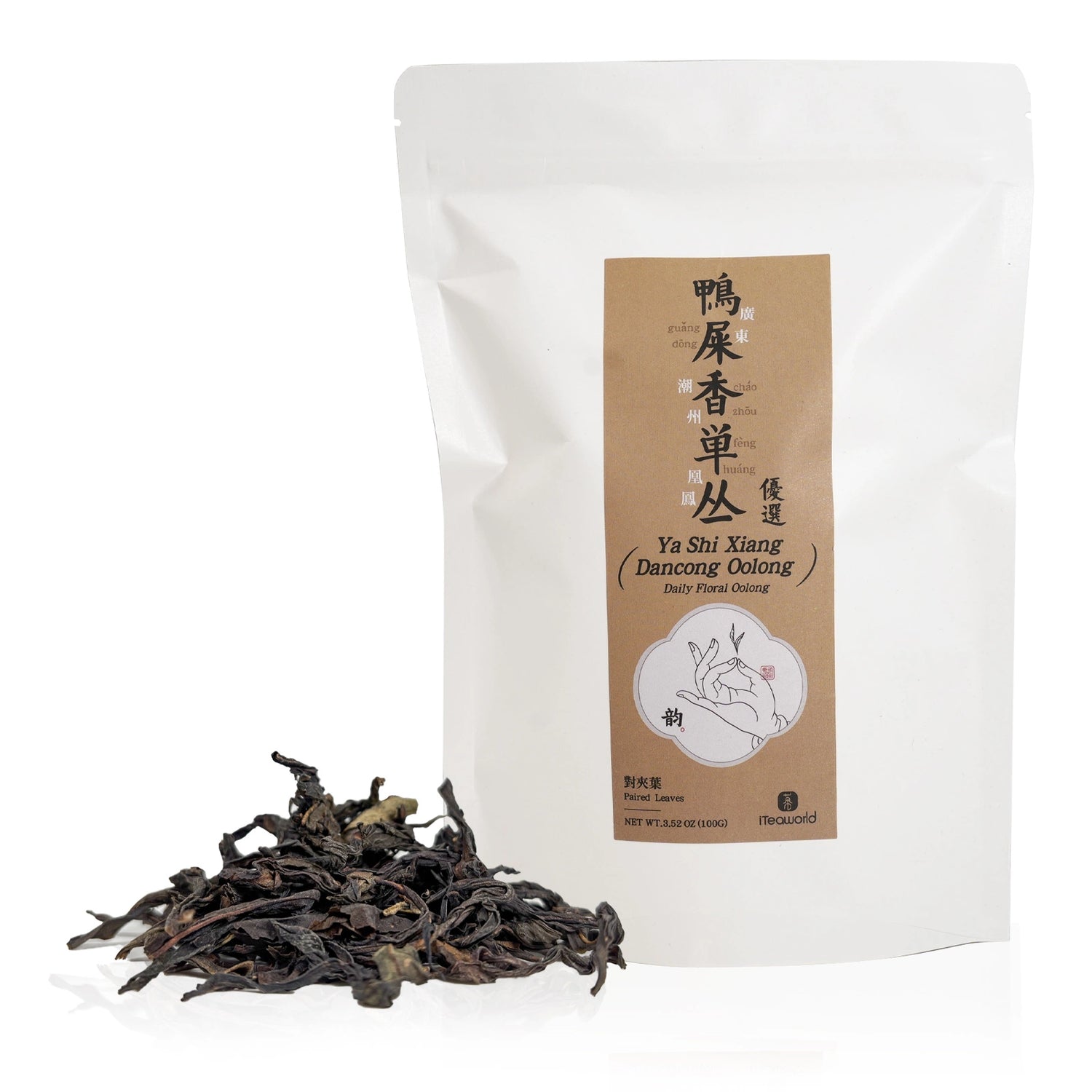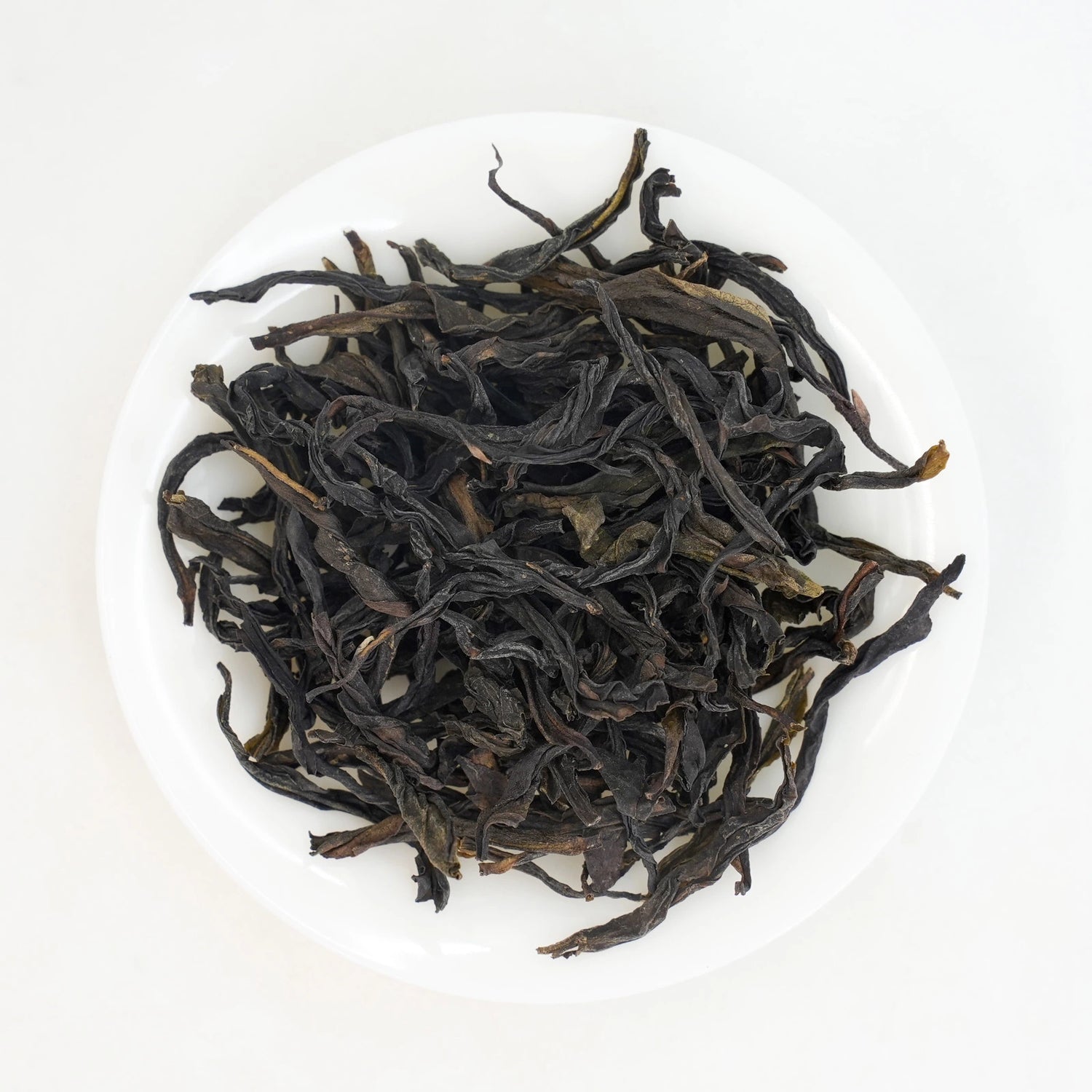Sort by:
165 products
165 products
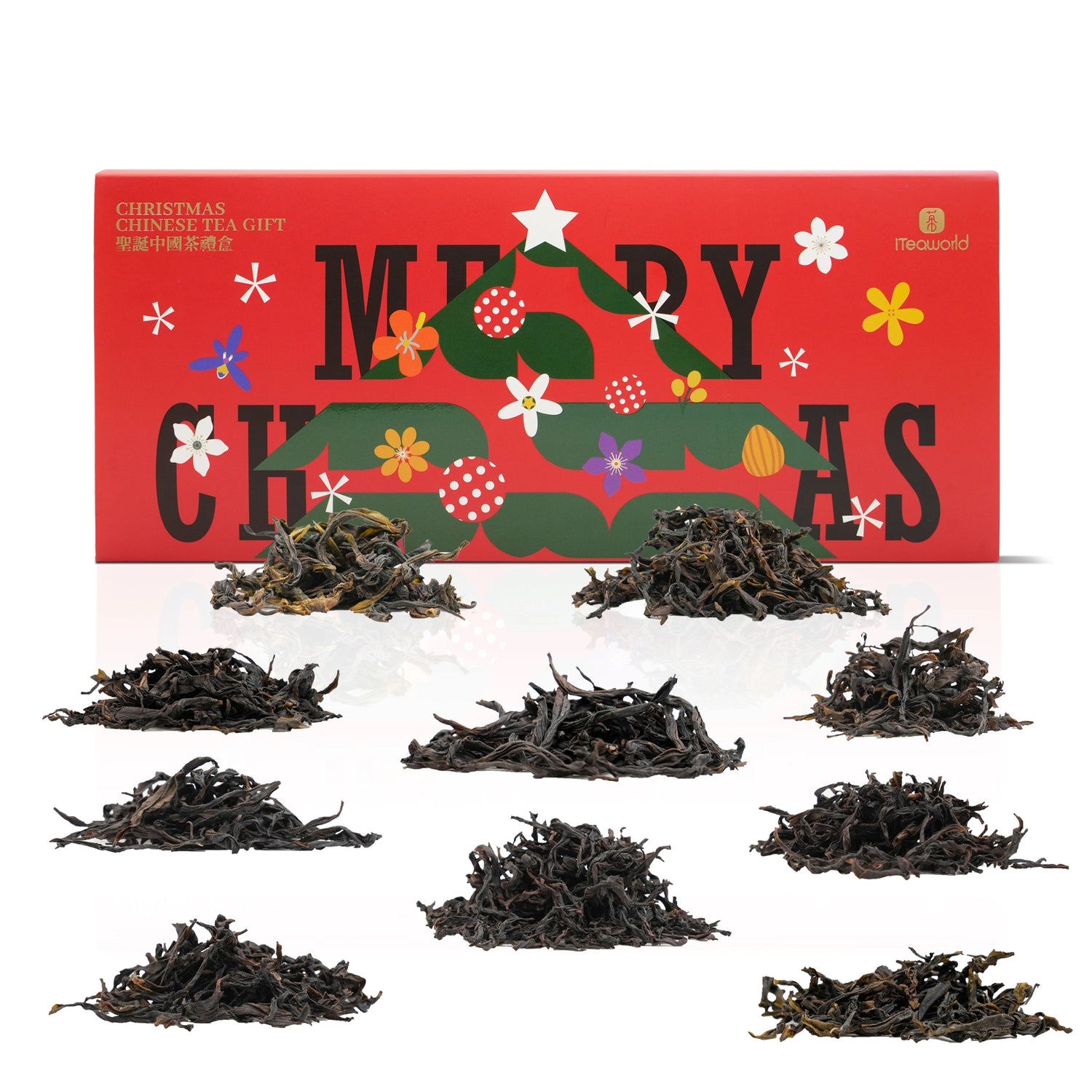

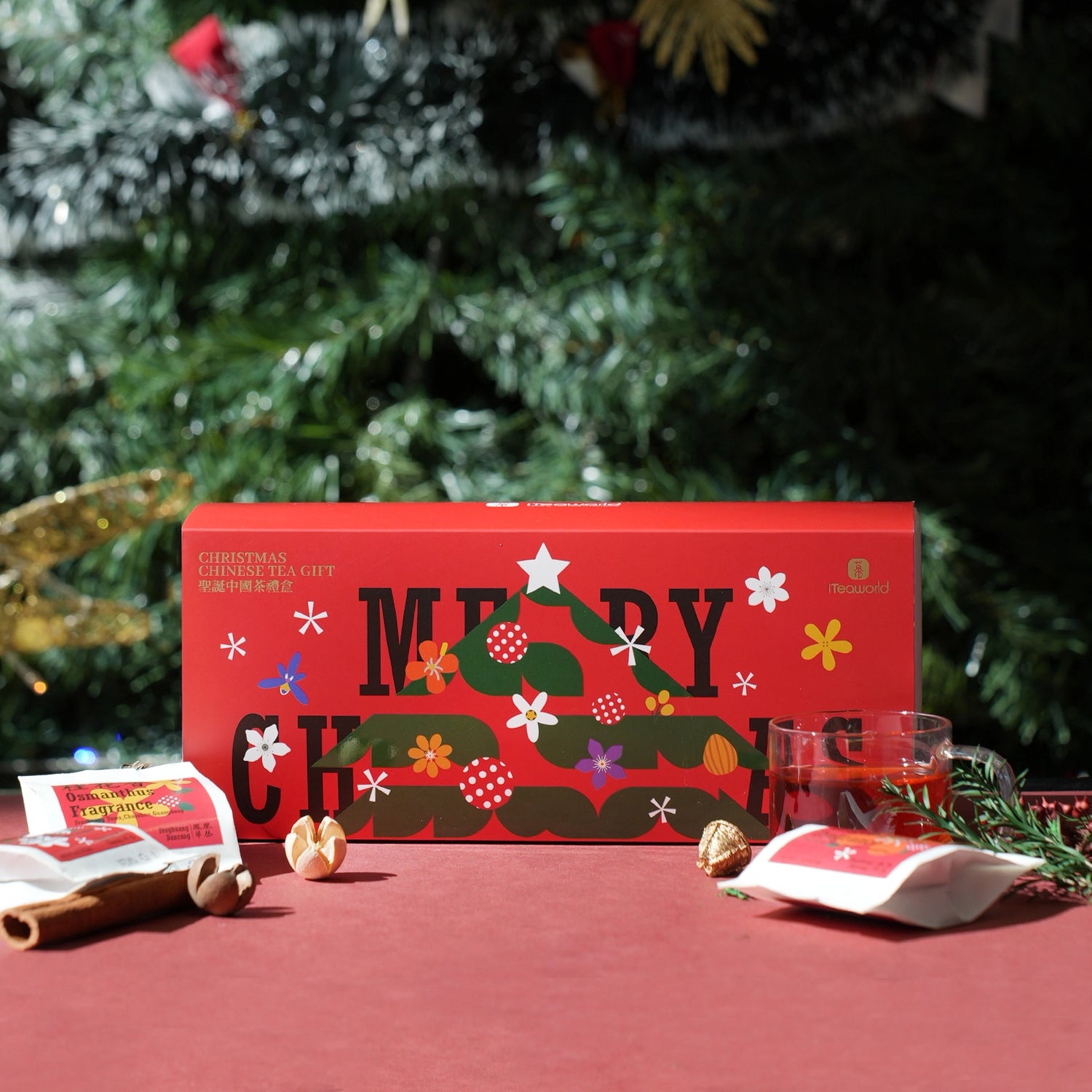
2025 Christmas Gift Box - 10 Distinct Aromas of Fenghuang Dancong Oolong Tea 100g
$79.99 USD
Unit price per2025 Christmas Gift Box - 10 Distinct Aromas of Fenghuang Dancong Oolong Tea 100g
$79.99 USD
Unit price perFenghuang Dancong 10 Aromas Collection – A Perfect Holiday Tea Gift
Discover the essence of Chinese Gongfu tea culture with this unique Fenghuang Dancong oolong tea set, featuring 10 distinct natural aromas like Jasmine, Gardenia, Honey Orchid, and more. Known as the "perfume of tea," this collection showcases the diverse flavors created by different tea bush varieties from Fenghuang Town, the heart of Dancong tea production.
Whether you’re a fan of fragrant teas, a Gongfu tea enthusiast, or simply curious about the rich aromas and flavors of oolong tea, this set offers a sensory journey you won’t forget. Beautifully curated, it’s an ideal gift for tea lovers who appreciate authentic, aromatic, and high-quality teas.
What is Fenghuang Dancong tea?
Fenghuang Dancong tea is a type of oolong tea, which is selected and bred from the Fenghuang Shuixian group. Each individual plant has its own unique shape and variety, forming its own product line, hence the name "Dancong," which means "single bush" or "single strain." This tea is mainly characterized by its ability to withstand multiple infusions, its strong aftertaste, and its high, lingering aroma. It's known as the most fragrant oolong tea due to its distinctive fragrance. Based on different aromatic types, Fenghuang Dancong is divided into various scented categories.
The product includes:
Fenghuang Dancong Oolong Tea(Huang Zhi Fragrance)2*5g
Fenghuang Dancong Oolong Tea(Orchid Fragrance)2*5g
Fenghuang Dancong Oolong Tea(Honey Orchid Fragrance)2*5g
Fenghuang Dancong Oolong Tea(Magnolia Fragrance)2*5g
Fenghuang Dancong Oolong Tea(Ginger Flower Fragrance)2*5g
Fenghuang Dancong Oolong Tea(Osmanthus Aroma)2*5g
Fenghuang Dancong Oolong Tea(Cinnamon Fragrance)2*5g
Fenghuang Dancong Oolong Tea(Almond Fragrance)2*5g
Fenghuang Dancong Oolong Tea(Night-scented Stock)2*5g
Fenghuang Dancong Oolong Tea(Jasmine Fragrance)2*5g
Origin:
Fenghuang Town, Chaozhou City, Guangdong Province.
Introduction to the Top 10 Fragrance Types of Fenghuang Dancong Tea
Fenghuang Dancong(Huang Zhi Fragrance):A high-quality single bush tea with a natural gardenia fragrance.
Fenghuang Dancong (Orchid Fragrance):Features the aroma of orchids, fresh and subtle.
Fenghuang Dancong (Honey Orchid Fragrance):The most popular type, known for its strong honey flavor combined with orchid fragrance, hence the name Milan.
Fenghuang Dancong(Magnolia Fragrance): Fresh and elegant, with the aroma of magnolia flowers.
Fenghuang Dancong(Ginger Flower Fragrance):Also known as 'Penetrating Heaven Fragrance', named for the uplifting ginger flower scent when the tea is brewed.
Fenghuang Dancong (Osmanthus aroma): Reminiscent of osmanthus flowers, sweet and lingering.
Fenghuang Dancong (Cinnamon Fragrance): Named for the tea's flavor that resembles the taste of cinnamon, a traditional Chinese medicine.
Fenghuang Dancong (Almond Fragrance):Also known as 'Sawtooth', named for the serrated edges of the leaves, with a distinct almond aroma.
Fenghuang Dancong (Night-scented Stock): Night-scented Stock Dancong is famous for its unique evening fragrance and flavor. It's mainly produced in Fengxi Dan Lake, Fenghuang Town, and is quite rare.
Fenghuang Dancong (Jasmine Fragrance): A unique fragrance type with the scent of jasmine flowers, refreshing and delightful.
Brewing Tips
Recommended Method: Traditional Gongfu style.
Best Teaware: White porcelain gaiwan or Yixing clay teapot.
Tea-to-Water Ratio: Use 5g of tea for 100ml of water.
Water Temperature: 212℉ (100℃).
Steeping Times:
First rinse: Quick pour, discard the rinse.
2nd–5th infusions: Steep for 6–8 seconds.
6th–10th infusions: Steep for 10–15 seconds.
Brewing Durability: Authentic Dancong from Chaozhou's Fenghuang region can be steeped 12–15 times.
Technique: Pour water along the edge of the gaiwan in a steady stream. Tilt the lid slightly to leave a small gap to prevent over-steaming.
Introduction:
This Hubei Dark Tea is meticulously selected from the autumn harvest of 2022. Plucked from high-altitude tea gardens in Zhaoliqiao Town, Hubei Province, it adheres to the plucking standard of one bud and three leaves. This tea is a type of Hubei Dark Tea known as "Mi Zhuan Cha" (Rice Brick Tea), renowned for its unique flavor profile. The tea liquor is rich and robust, with a slight initial bitterness that transforms into a lasting sweet aftertaste. It primarily exudes a floral and honey-like aroma, accompanied by a subtle aged fragrance.
Reasons to Recommend:
- Unique Raw Material: Mi Zhuan Cha is a specialty tea produced in Chibi City, Hubei Province, known as the "Hometown of Chinese Brick Tea." It is a compressed black tea made entirely from tea dust, which gives it the name "Rice Brick Tea."
- Distinct Appearance: The finished Mi Zhuan Cha is visually striking, with sharp edges, a smooth surface adorned with intricate patterns, and a glossy black brick color. When brewed, it produces a deep red liquor with a pure aroma and a rich, mellow taste.
- High-Mountain Tea Gardens: The tea trees grow at high altitudes, where significant daily temperature variations slow their growth. The abundant mist and moisture nourish the tea trees, enriching the leaves with nutrients and resulting in a tea with a robust flavor and strong aroma.
Oxidation Level: Wet piling followed by high-temperature steam pressing
Roasting Level: None
Tea Garden Soil: Yellow-brown soil
Processing Time: Autumn 2022
Best Before Date: Suitable for long-term storage
Tea Variety: South Hubei Group Variety
2025 Longjing First Flush Spring Tea - Limited Stock green tea
We’re thrilled to introduce our 2025 Early Spring First Flush Longjing Tea, handcrafted by the expert Master Sheng Jiangjun. With over 20 years of tea-making experience and more than 30 years specializing in Longjing tea, Master Sheng is a true guardian of traditional tea-making techniques. From 2011 to 2013, he honed his craft in the heart of the Longjing tea-producing region, Meijiawu. Later, he established his own tea workshop in Xingchang, Zhejiang, where he began crafting the distinctive Xingchang Longjing tea that we proudly present to you today.
This particular tea comes from a high-altitude tea garden in the mountains of Zhejiang’s Xingchang region, with harvesting taking place around March 25th, making it a premium first flush green tea—early-picked, tender, and rare.
Product Details
Craftmaster: Sheng Jiangjun (20 years expertise)
Tea Varietal: Xingchang Native Cultivar Group
Origin: Shengzhou, Zhejiang, China | 600-800m Elevation
Harvest: First Spring 2025 Plucking (1 bud + 1 leaf standard)
Production Date: Crafted around March 25, 2025
Limited Availability: Only 50 packages available, each 50g
Why Our Early Spring Harvest Stands Out
Discover the pinnacle of spring tea craftsmanship with our limited 2025 First Flush Longjing. Harvested in late March from the youngest buds of century-old tea bushes, these tender leaves capture the essence of the season with unmatched floral aroma and velvety smoothness.
Xinchang vs. West Lake: A Hidden Gem
We source exclusively from Xinchang, Zhejiang — a pristine mountain region 2,000+ ft above sea level. Unlike crowded West Lake plantations, our organic tea gardens thrive in crisp air and mineral-rich soil, yielding a cleaner, crisper cup with subtle honey undertones.
Old-Growth Tea Bushes: Nature’s Flavor Laboratory
Our 50+ year-old heirloom tea varietals (Longjing Quntizhong) are the OG of green tea. These hardy plants adapt to mountain microclimates, creating complex layers of flavor — think fresh chestnut notes with a lingering orchid finish. Perfect for tea connoisseurs seeking authentic, small-batch quality.
2025 Huangshan Maofeng First Flush - Seasonal Rare Tea(Pre-sale)
We’re excited to introduce the 2025 Early Spring First Pluck Huangshan Maofeng, a premium green tea from Master Yu Chengshi's tea garden in Longma Village, Yanzihe Town, Jinzhai County, Lu'an City, Anhui Province. Master Yu has over 30 years of experience in tea making, specializing in Anhui's famous teas like Maofeng and Guapian. His tea garden is located at an elevation of 800 meters, where wild Jinzhai native tea trees grow naturally. These trees thrive in the pure environment, producing tea with natural aromas and a unique flavor profile. This year’s tea was picked around March 20th, during the first pluck of the spring season, using fresh, tender buds and leaves to ensure top-notch freshness and fragrance.
Product details
Craftmaster: Yu Chengshi (30 years expertise)
Tea Varietal: Jinzhai Native Cultivar Group
Origin: Longma Village, Jinzhai, Anhui, China | 800m Elevation
Harvest: First Spring 2025 Plucking (1 bud + 1 leaf standard)
Production Date: Crafted on March 20, 2025
Limited availability: Only 50 units available, 50g per unit
Expected shipping around April 5-10
Why Choose Jinzhai Huangshan Maofeng Instead of Traditional Huangshan Maofeng?
While traditional Huangshan Maofeng is well-known, we’ve chosen Master Yu’s Jinzhai Huangshan Maofeng because it offers the same exceptional quality and unique flavor, but at a more accessible price. Jinzhai is not part of the core Huangshan region, but its natural environment makes it an ideal place for tea cultivation. The wild, native tea trees here have been growing for many years and produce tea with a flavor very similar to Huangshan Maofeng. The purity of the environment gives the tea a quality comparable to that of the famous Huangshan teas, but with a better price-to-quality ratio.
Why Choose Huangshan Maofeng Group Varieties?
We’ve selected Huangshan Maofeng made from group variety tea plants because it captures the most traditional, pure Huangshan Maofeng flavor. Group variety tea trees are grown from seeds, so they have natural genetic diversity. These trees have undergone years of natural selection, making them more stable and adaptable, which allows them to better reflect the natural flavor of the region.
Compared to modern tea plantations with clonal, asexual propagation, group variety tea trees grow in a more natural environment with deeper root systems. This results in richer, more complex tea flavors. The older age of these trees and their long exposure to the natural environment means they carry the most original tea aromas, delivering a tea with more depth and layers.
2025 Enshi Yulu First Flush - Jade Dew Limited Edition
We’re excited to bring you the 2025 Early Spring First Pluck Enshi Yulu, a premium green tea from Enshi City, Hubei Province, located in the beautiful Baiyangping Township. This tea is grown in the heart of the Enshi Yulu region at an elevation of 800-900 meters, surrounded by fresh, clean air and pristine nature—one of the core growing areas for Enshi Yulu. Master Zhang Yi, with over 20 years of tea-making experience, is a national-level senior tea master and tea evaluator. He follows in his father’s footsteps, blending traditional tea-making skills with modern techniques to craft every leaf with care. The leaves are picked around March 20th, during the first pluck of the season, when the leaves are at their freshest with a tender bud and one leaf.
Product details
Craftmaster: Zhang Yi (20 years expertise)
Tea Varietal: Enshi Cultivar Group (Entai Early Varietal)
Origin: Dabaoping Group, Baiyangping Town, Enshi City, Hubei, China | 800-900m Elevation
Harvest: First Spring 2025 Plucking (1 bud + 1 leaf standard)
Production Date: Crafted on March 20, 2025
Limited availability: Only 100 sets, each set is 100g (25g of each tea)
Expected shipping around April 5-10
Why choose Enshi’s native tea plant, the Entai Early variety?
For Enshi Yulu, we’ve selected the local Enshi native variety—Entai Early, a traditional “group variety” that’s been naturally selected and cultivated over time. This type of tea tree is more adaptable, has a longer lifespan, and offers more stable and complex flavors. It truly reflects the local environment and soil. Choosing group varieties ensures a purer, more nuanced taste profile, bringing you a natural, multi-layered tea experience.
What makes the core Enshi Yulu region special?
We’ve chosen the core tea-growing region in Enshi—Baiyangping Township in the Dabao Ping Group. This high-altitude area benefits from perfect growing conditions, with rich soil, plenty of sunlight, and a significant temperature difference between day and night. These conditions make the tea leaves grow slower and more concentrated in flavor, producing a tea with a deeper, purer taste that has both consistency and stability. Compared to other regions, Enshi Yulu from this area offers a more refined and authentic flavor.
2025 First Flush Spring Tea Collection: Biluochun, Longjing & More
We’re excited to introduce a unique tea experience: the 2025 Early Spring First Harvest Green Tea Collection. This special gift box includes four of China’s most loved and iconic first harvest green teas, giving you the chance to enjoy the different flavors of Longjing, Biluochun, Huangshan Maofeng, and Enshi Yulu all in one go.
Product Includes:
2025 First Flush Longjing - Artisan-Crafted Spring Green Tea (25g)
2025 First Flush Biluochun - Hand-Rolled Curly Green Tea (25g)
2025 First Flush Huangshan Maofeng - High-Mountain Bud Tea (25g)
2025 First Flush Enshi Yulu - Steamed Jade Dew Tea (25g)
Limited availability: Only 100 sets, each set is 100g (25g of each tea)
Why Choose This Collection?
Taste Four Classic First Harvest Teas in One Box Whether you’re a green tea enthusiast or someone wanting to dive into Chinese tea culture, this collection is the perfect choice. From Longjing’s refreshing taste, Biluochun’s floral fragrance, Huangshan Maofeng’s rich aftertaste, to Enshi Yulu’s clean and pure flavor – each tea offers a completely different tasting experience, making it a journey for your taste buds.
First Harvest Means Better Quality Each tea in this collection comes from the 2025 Early Spring First Harvest – handpicked from the youngest, freshest buds of the season, guaranteeing vibrant freshness and rich aromas. First harvest teas are especially rare and prized; once the season passes, it’s almost impossible to find them again.
Sourced from Top Tea Regions, Expertly Crafted These teas are from China’s most renowned tea-growing regions, carefully crafted by seasoned tea masters. Whether it’s the signature fragrance of Longjing, the floral notes of Biluochun, the sweetness of Huangshan Maofeng, or the refreshing taste of Enshi Yulu – each tea is a masterpiece from a tea master, grown in ideal natural conditions.
Introduction:
This 2018 Liubao tea is sourced from high-altitude tea gardens in Guilin, Guangxi, and made from high-grade one-bud-three-leaf material. After five years of aging, the tea has undergone sufficient fermentation and transformation, developing a unique flavor profile with a distinctive betel nut aroma, a bright red liquor, and a smooth, mellow taste with a slightly sweet aftertaste.
Reasons to Recommend:
- Core Production Area: Grown in Liubao Town, Wuzhou City, Guangxi, where the average annual temperature is 21.1°C, annual rainfall is 1503.6 mm, and annual sunshine duration is 1915 hours. The abundant rainfall and vast mountainous terrain create an ideal environment for tea cultivation.
- Unique Aroma: The "betel nut aroma" of Liubao tea originates from a faint "pine smoke fragrance" in newly made tea, which transforms into the distinctive "betel nut aroma" after prolonged aging. This aroma creates a lasting "cooling" sensation in the mouth.
- Rich History: Liubao tea flourished during the Tang and Song dynasties and reached its peak during the Ming and Qing dynasties. During the Jiaqing period of the Qing dynasty, it was recognized as one of China's 24 famous teas for its unique betel nut aroma.
- Dual Benefits: Liubao dark tea holds a special place in traditional Chinese medicine. It is both cooling and warming, said to eliminate excess dampness while providing warmth when needed.
Oxidation Level: None
Roasting Level: None
Tea Garden Soil: Yellow soil
Master Blender: Liu Yongqiang
Processing Time: 2018
Best Before Date: Suitable for permanent storage
Tea Variety: Guangxi Group Variety
Introduction:
This Anhua Dark Tea is meticulously selected from the autumn harvest of 2021. Plucked from wild tea gardens in Anhua County, Hunan Province, it adheres to the plucking standard of one bud and three leaves. Recognized by the global tea and medical communities as one of the healthiest beverages of the 21st century, this tea exudes a unique pine smoke aroma when brewed, offering a pure, mellow, and sweet taste with a lasting aftertaste.
Reasons to Recommend:
- Special Processing Technique: Anhua Dark Tea undergoes a unique "wet piling" (wo dui) process twice—once during the initial processing of raw tea and again during the final product processing. This process utilizes the temperature and humidity of the tea leaves after fixation, allowing microorganisms in the air to interact with the leaves, resulting in the transformation of the tea's internal compounds.
- Premium Quality: This Anhua Dark Tea (Tianjian) is considered the finest variety available on the market and was historically treasured as a tribute tea for emperors.
- Unique Aroma: A special step in the production of Anhua Dark Tea is the "Seven Star Stove" roasting. During this process, pine wood is burned beneath the stove, and the pine smoke is channeled into the tea leaves, infusing them with a distinctive pine smoke aroma while drying.
Oxidation Level: Wet piling fermentation
Roasting Level: Seven Star Stove pine smoke roasting
Tea Garden Soil: Weathered slate soil
Processing Time: 2021
Best Before Date: Suitable for long-term storage
Tea Variety: Anhua Group Variety
2025 Biluochun First Flush - Rare Reserve Spring Tea(Pre-sale)
We’re excited to offer you the 2025 Early Spring First Flush Bi Luo Chun, sourced from the tea garden of Master Zhang in Dongguan Village, Dai Bu Town, Liyang City, Jiangsu Province. Master Zhang has over 20 years of tea-making experience, having learned from his father, who has been a renowned tea master for over 40 years. Master Zhang has kept traditional tea-making methods alive, using hand-rolling, roasting, and drying techniques passed down through generations. This year's tea is picked in late March, around March 20, and features tender, fresh leaves at the "one bud, one leaf" stage, ensuring the highest quality flavor and aroma.
Product details:
Craftmaster: Zhang Hansong (30 years expertise)
Tea Varietal: Jiukeng Cultivar
Origin: Jiangdong Village, Liyang, Jiangsu, China | 300-400m Elevation
Harvest: First Spring 2025 Plucking (1 bud + 1 leaf standard)
Production Date: Crafted around March 20, 2025
Limited Availability: Only 50 packages available, each 50g
Expected shipping around April 5-10
Why We Source Biluochun from Liyang's Dai Town Instead of Lake Dongting
While Lake Dongting's Biluochun gets the hype, our Liyang Dai Town tea is the purist's pick. Think of it like craft beer vs. mass-produced lager – both quench your thirst, but one's got soul. Grown 60 miles west of Dongting in pollution-free mountain air, these old-growth tea bushes (the hardy 'Jiukeng' variety) have weathered decades to develop complex flavors. You get that classic Biluochun vibe, minus the touristy markup.
Why Handcrafted Beats Machine-Made
Master Zhang treats tea like a slow-cooked meal – no shortcuts. His hands knead each leaf to unlock natural oils (that's where the floral magic happens!), while factory machines just crush and rush. It's the difference between grandma's pie crust and frozen supermarket stuff. Want silky texture and aroma that dances on your tongue? That's the artisan craft talking.
Recommended Purchase :
This Tie Guan Yin Oolong tea, produced between 1990 and 1993, has been stored in a dry warehouse of an old tea factory for over thirty years and kept sealed. It is made from the Tie Guan Yin variety from the famous tea-growing region of Yongchun, Fujian, and was crafted by the state-owned Yongchun Kong Overseas Chinese Tea Factory, established in 1958. This tea is entirely handmade, traditionally roasted over a full fire, and comes in its original packaging. No longer available on the market, its unique "aged aroma," rich sweetness, and smooth texture make it a prized choice for connoisseurs of aged oolong tea.
Key Details about Tieguanyin :
- Production Date:1990-1993
- Grade: First grade
- Tea Cultivar: Tieguanyin
- Craftsmanship: This tea is traditionally roasted with a full fire and moderately oxidized. After over thirty years of natural aging in a dry storage environment, it is sealed in an outer paper box and packaged in an inner kraft paper bag.
- Flavor Highlights: This tea offers a rich, aged aroma with hints of woody notes. The texture is thick and smooth, with a deep, mellow flavor and a long-lasting sweet aftertaste. Its complex profile unfolds in layers, making it a truly refined experience.
What is Tieguanyin Oolong Tea? :
Tieguanyin is one of China's top ten famous teas, a semi-fermented oolong tea primarily produced in Anxi, Fujian. Its unique production process includes sun-withering, shaking, and heating, which gives the leaves a distinctive "green leaf with red edges" appearance. The tea features tightly rolled, sandy-green leaves and a golden, clear brew. It has a rich, lasting aroma with natural orchid or fruity notes, a smooth, refreshing taste, and a sweet aftertaste. Highly resistant to multiple infusions, Tieguanyin is packed with nutrients like polyphenols and amino acids, offering benefits such as boosting alertness, reducing fatigue, cooling the body, and aiding weight loss. A treasured tea and a symbol of Southern Fujian's tea culture, it is widely loved by tea enthusiasts.
Brewing and Enjoyment Tips :
This tea showcases the unique transformation brought by time. The first infusion can be used as a "tea awakening" step to activate the tea's inner qualities, resulting in a richer, smoother texture and a more pronounced sweet aftertaste. For the best experience, we recommend using longer steeping times or boiling methods to fully unlock its aged characteristics.
Recommended Brewing Methods :
-
Gaiwan Brewing
- Capacity:100ml Gaiwan
- Water Temperature:95℃-100℃
- Brewing Times:5-7 times
- Tea Water Ratio:1:15 to 1:25
- Brewing Time Once:10~20 seconds
-
Thermos Brewing
- 1g tea per 100ml (3.4oz) water.
- Use boiling water (212°F).
- Steeping Time: 1-2 hours.
- Tool: Insulated thermos.
-
Boiling Method
- Add 1g tea per 100ml (3.4fl oz) water.
- Boil for 1-2 minutes, then let sit for 2-3 minutes.
- Rebrew by boiling for 3 minutes longer with each steeping.
- Use a ceramic or glass teapot for optimal flavor.
- Enjoy up to 3-4 brews.
Storage Guidelines:
To ensure the best quality of tea, the ideal way to store it is in vacuum-sealed packaging, kept in a cool, dark, and dry place. Avoid exposure to strong odors and air. For sealed storage, using a tin can or a double-lidded metal can is recommended. For even better results, you can store the sealed tea in the refrigerator or a dry storage container.
Weight & Packaging
- Weight:3.5oz (100g)
- Packing Type : Sealed paper box with cowhide bag packaging inside
About Yongchun Beikeng Overseas Chinese Tea Factory:
Established in 1958, the state-owned Fujian Yongchun Beikeng Overseas Chinese Tea Factory carries a rich history and cultural heritage of tea production. At its peak, the factory was a bustling hub of innovation and craftsmanship, employing over 1,000 tea workers and producing millions of pounds of tea annually. Its teas, including Tieguanyin, were exported to Hong Kong, Taiwan, Japan, and Southeast Asia, earning widespread acclaim and becoming a shining symbol of Fujian's tea culture.
However, by the 1990s, the factory fell into decline, and its once-vibrant grounds grew quiet. Unable to bear seeing his life's work fade away, the veteran factory director, Huang Shenghou, took over after its privatization, dedicating himself to reviving the factory and preserving its tea-making legacy.
Today, the factory's aged Tieguanyin not only embodies decades of tea-making expertise but also continues to showcase the timeless charm of Yongchun's Tieguanyin. The story of the Fujian Yongchun Beikeng Overseas Chinese Tea Factory reflects the dedication and innovation of generations of tea artisans, and its aged Tieguanyin carries forward this remarkable legacy.
Recommended Purchase
This Yunnan Pu'er Tuo Tea, produced in 2003 and aged for 22 years in a dry northern warehouse, is crafted from Yunnan large-leaf tea varietals harvested in the region's primary tea-growing areas. It is a premium Tuo Tea produced by Menghai Tea Factory in Yunnan Province, renowned for its exquisite material selection and meticulous craftsmanship. This tea is no longer available on the market.
The tea has a unique bowl-shaped appearance, with a distinct aged aroma and a rich, complex profile. Its flavor is mellow, refreshing, and smooth, with a sweet, velvety texture and a long-lasting aftertaste. This rare and highly sought-after tea is a classic early Dayi (Menghai) masterpiece, cherished by collectors and connoisseurs alike.
Key Details about Yunnan Pu'er Tuo Tea 2003
- Origin:Xishuangbanna, Yunnan Province, China
- Production Date:2003
- Grade: First grade
- Tea Cultivar:Yunnan Large-Leaf Varietal
- Craftsmanship:Using handpicked tea leaves as the raw material, the fresh leaves are processed through withering, fixing, rolling, and sun-drying to create sun-dried tea. The sun-dried tea is then steamed and pressed into the shape of Pu'er Tuo Tea. Finally, the tea undergoes 22 years of natural aging in a dry storage environment, allowing it to develop its unique character and depth.
- Flavor Highlights :The tea exhibits a distinct aged aroma, with a rich and complex profile. Its flavor is mellow, refreshing, and smooth, with a velvety texture, high sweetness, and a long-lasting aftertaste.
What is Yunnan Pu'er Tuo Tea?
Yunnan Pu'er Tuo Tea is a traditional and distinctive tea from Yunnan Province, known for its unique shape, resembling a thick-walled bowl with a concave center. It is tightly compressed and neatly formed, made from Pu'er tea as the raw material.
Dark Tea Tuo Tea is further divided into two types:
Raw Tuo (Sheng Tuo): Compressed directly from sun-dried raw tea leaves, featuring a dark, glossy color, a fresh aroma, and a sweet aftertaste.
Ripe Tuo (Shou Tuo): Fermented through artificial pile fermentation, resulting in a reddish-brown color and a rich, mellow flavor.
Pu'er Tuo Tea has a long history, with records dating back to the Ming Dynasty in the book "Dian Lue." In 1986, the 100-gram Tuo Tea produced by Yunnan Xiaguan Tea Factory won the Golden Rooster Award in Paris, France.Modern research has confirmed its significant health benefits. Clinical trials by French and Chinese medical institutions have shown that it can reduce blood lipids and cholesterol, and assist in treating obesity, hypertension, and arteriosclerosis.The tea's liquor is known for its enduring color, aroma, and flavor, combining cultural heritage with health-promoting properties. It has gained international acclaim for its unique qualities.
Brewing and Enjoyment Tips
This tea embodies the unique transformation brought by time. The first infusion can serve as a "tea awakening" to activate the tea's inner qualities, enhancing its flavor profile.Tuo Tea is a type of compressed tea. Before brewing, use a specialized tea knife or tea pick to gently break the Tuo Tea into appropriately sized pieces. Avoid using excessive force to prevent damaging the tea leaves.
Recommended Brewing Methods
- Capacity:100ml Gaiwan
- Water Temperature:90-100℃
- Brewing Times:7-8 times
- Tea Water Ratio:around 1:20(Adjust according to your own taste)
- Brewing Time Once:10-20 seconds(Adjust according to your own taste),The first time as a wake-up tea can take 3 seconds.
Storage Guidelines
To ensure the best quality of tea, the ideal way to store it is in vacuum-sealed packaging, kept in a cool, dark, and dry place. Avoid exposure to strong odors and air. For sealed storage, using a tin can or a double-lidded metal can is recommended. For even better results, you can store the sealed tea in the refrigerator or a dry storage container.
Weight & Packaging
Weight : 3.5oz (100g)/8.8oz(250g)
Packing Type : Kraft paper packaging
About Menghai Tea Factory
Menghai Tea Factory is a benchmark enterprise in the Pu'er tea industry. Established in 1940 in Menghai County, Xishuangbanna, Yunnan—the birthplace of tea trees and a core production region for Pu'er tea—it is the oldest professional tea company in Yunnan. The factory integrates cultivation, processing, and sales, and its flagship brand, "Dayi," offers hundreds of varieties, including Pu'er tea, black tea, and green tea. Its representative products, 7572 Ripe Cake and 7542 Raw Cake, are widely recognized as the gold standard for Pu'er tea quality.
The factory has made outstanding contributions to the modern development of Pu'er tea: it pioneered and first applied artificial post-fermentation aging technology, driving innovation in Pu'er tea processing. It also led the large-scale production of Yunnan Seven Sons Cake Tea, establishing a classic form in the industry. Today, the factory owns a 380-acre modern processing facility and two 10,000-acre eco-tea garden bases in Bada and Bulang Mountain, creating a comprehensive industry chain.
With its deep historical roots and technological innovation, Menghai Tea Factory continues to lead the development of the Pu'er tea industry. Its products are highly valued for both drinking and collecting, earning global acclaim from consumers.
Recommended Purchase :
This Hei Zhuan Tea (Black Brick Tea), produced in 2011 and aged for 14 years in a dry northern warehouse, is made from authentic Gao Ma Er Xi dark raw tea through a process of steaming and compression. It is produced by Hunan Jiuyang Tea Co., Ltd. and meticulously crafted through steps including crushing, sifting, fermentation, steaming, machine pressing, and drying. This tea is no longer available on the market.
The brick features a smooth surface, clear patterns, well-defined edges, uniform thickness, and a glossy dark brown color. After years of aging, it develops a distinct aged aroma accompanied by woody notes, offering a rich, mellow flavor and a smooth, refined texture.This Hei Zhuan Tea was awarded the Special Gold Medal at the 2009 Shanghai Tea Expo, making it a classic masterpiece from Jiuyang Tea Factory.
Key Details about Hei Zhuan Tea Dark Tea :
- Origin:Anhua County, Hunan Province, China
- Production Date:2011
- Grade : First Grade
- Tea Cultivar :Gao Ma Er Xi Original Group Variety
- Craftsmanship :This Hei Zhuan Tea (Black Brick Tea) is made using Anhua dark raw tea as its base material. After the raw tea arrives at the factory, it undergoes a series of processes, including sifting, winnowing, crushing, and blending, to create a semi-finished product that meets strict standards for uniformity and purity. The semi-finished product is then further processed through steaming, pressing, roasting, and packaging to produce the final Black Brick Tea.
- Flavor Highlights :The tea exhibits a distinct aged aroma, accompanied by woody notes, with a rich, mellow flavor and a smooth, refined texture.
What is Hei Zhuan Tea Dark Tea?
Hei Zhuan Tea (Black Brick Tea) is named for its use of dark raw tea (Hei Mao Cha) as the primary material, which gives the tea its dark, glossy color, and its brick-like shape when compressed. The raw material is sourced from high-quality dark raw tea produced in tea factories in Anhua and other counties.
In the past, the raw material was divided into two types: surface tea (higher quality) and inner tea (lower quality). During compression, the lower-quality tea was pressed inside, while the higher-quality tea was used on the surface. However, since the early 1970s, the labor-intensive and time-consuming traditional process was streamlined. The tea is now blended in the appropriate ratio of surface and inner tea and compressed in a single step.
During production, the raw material is first sifted, shaped, winnowed, and cleaned. It is then blended in specific proportions. For machine pressing, the tea is sterilized using high-temperature steam, compressed under high pressure, inspected and trimmed, and slowly dried before being packaged into the final brick form.
When brewed, Hei Zhuan Tea yields a liquor the color of amber, with a rich, mellow flavor and a pure, clean aroma. Long-term consumption of this tea is believed to aid digestion, regulate metabolism, and provide health benefits and preventive effects for the body.
Brewing and Enjoyment Tips :
This tea embodies the unique transformation brought by time. The first infusion can serve as a "tea awakening" to activate the tea's inner qualities, enhancing its flavor profile. Hei Zhuan Tea (Black Brick Tea) is shaped like a brick. Before brewing, use a specialized brick tea knife or tea pick to gently break the brick into appropriately sized pieces. Avoid using excessive force to prevent damaging the tea leaves.
Recommended Brewing Methods :
Gaiwan Brewing :
- Capacity:100ml Gaiwan
- Water Temperature:100℃
- Brewing Times:5-7 times
- Tea Water Ratio:around 1:20(Adjust according to your own taste)
- Brewing Time Once:2-3 minutes(Adjust according to your own taste),The first time as a wake-up tea can take 3-5 seconds.
Boiling Method :
To brew Hei Zhuan Tea (Black Brick Tea), start with 10–15 grams of tea and 500 milliliters of water. Heat the water until it reaches a rolling boil, then add the tea. Once the water comes back to a boil, lower the heat to a gentle simmer and let it cook for 2 minutes. Turn off the heat, strain out the tea leaves, and serve it hot. If you prefer a lighter flavor, you can adjust the ratio to 1 part tea to 15 parts water (for example, 10 grams of tea to 150 milliliters of water) and follow the same steps.
For a Central Asian-inspired milk tea, brew the tea as described above. Then, mix the strained tea with milk in a 1:5 ratio (1 part milk to 5 parts tea). Add a pinch of salt to taste, stir well, and enjoy this creamy, savory drink.
Storage Guidelines :
To ensure the best quality of tea, the ideal way to store it is in vacuum-sealed packaging, kept in a cool, dark, and dry place. Avoid exposure to strong odors and air. For sealed storage, using a tin can or a double-lidded metal can is recommended. For even better results, you can store the sealed tea in the refrigerator or a dry storage container.
Weight & Packaging:
Weight : 35.3oz (1000g)
Packing Type : Original paper box sealed packaging, inner packaging made of kraft paper
About Hunan Jiuyang Tea Factory :
Hunan Jiuyang Tea Co., Ltd., founded in 1985, is rooted in Youzhou Ancient Town, the birthplace of Anhua Dark Tea. As a leading enterprise in Hunan's dark tea industry, Jiuyang has been dedicated to the dark tea sector for nearly four decades without interruption. Its headquarters is now located in Jiangnan Town, the birthplace of Qian Liang Tea (Thousand Taels Tea), and boasts over 5,000 acres of high-altitude organic tea gardens on glacial rock soil and a standardized production facility spanning more than 20,000 square meters.
Guided by the core philosophy of "heritage and innovation," Jiuyang has preserved the traditional craftsmanship of "Three Bricks" (e.g., Fu Brick, Hei Brick, Hua Brick), "Three Tips" (e.g., Tian Jian, Gong Jian, Sheng Jian), and Qian Liang Tea, while also developing over 100 modern dark tea products. The company has won numerous international and domestic quality awards and is committed to producing "premium dark tea" as a testament to its dedication to excellence. Jiuyang continues to promote Anhua Dark Tea culture on the global stage.
Recommended Purchase :
This product, originating from 2003, is a type of brick tea known as Mi Zhuan Tea, which has been stored in a dry warehouse in the north for 22 years. It is made from high-quality black tea through a process of steaming and pressing. Produced by the renowned Zhao Li Qiao Tea Factory in Hubei Province, it is meticulously crafted according to traditional processing techniques. The tea leaves used as raw material are as fine as grains of rice, hence the name "Mi Zhuan" (Rice Brick). This tea is no longer available on the market. The brick surface exhibits a dark, glossy color with exquisite patterns and distinct edges. The brewed tea presents a deep red, bright liquor with a pronounced medicinal aroma and a mellow, harmonious flavor, making it a coveted choice for enthusiasts of aged dark tea.
Key Details about Mi Zhuan Tea Dark Tea :
- Origin : Chibi City, Hubei Province, China
- Production Date :2003
- Grade : Special Grade
- Tea Cultivar :Yichang large leaf tea
- Craftsmanship : Mi Zhuan Tea is produced following the manufacturing principles of Qing Brick Tea, using finely broken black tea leaves as raw material. The process involves screening, blending, compressing, demolding, inspecting, drying, and packaging. This tea has been naturally aged for 22 years in a dry warehouse environment and is wrapped in paper packaging.
- Flavor Highlights :It exhibits a prominent medicinal aroma, with a rich, deep red liquor. The taste is mellow and smooth, offering complex and layered flavors.
What is Mi Zhuan Tea Dark Tea?
Mi Zhuan Tea (Rice Brick Tea) is a unique compressed tea produced in Yangloudong, an ancient town in Chibi City, Hubei Province, known as the "Hometown of Chinese Brick Tea." It is a type of compressed tea—specifically, a brick tea. The tea leaves used as raw material are as fine as grains of rice, hence the name "Mi Zhuan" (Rice Brick Tea).
The finished product is visually striking, with well-defined edges, elegant surface patterns, and a glossy, dark surface. When brewed, the tea yields a deep red liquor with a pure, mellow aroma and a rich, full-bodied flavor.
Traditionally, Mi Zhuan Tea was consumed by people living in cold climates due to its high vitamin content, which helps compensate for the lack of fresh fruits and vegetables during winter. It is primarily sold in Xinjiang and North China, with some exports to Russia and Mongolia. In recent years, small quantities have also made their way to Europe and America, making it a distinctive and exceptional red brick tea among Chinese brick teas.
Brewing and Enjoyment Tips
This tea embodies the unique transformation brought by time. The first infusion can serve as a "tea awakening" to activate the tea's inner qualities, enhancing its flavor profile. Mi Zhuan Tea (Rice Brick Tea) is shaped like a brick. Before brewing, use a specialized brick tea knife or tea pick to gently break the brick into appropriately sized pieces. Avoid using excessive force to prevent damaging the tea leaves.
Recommended Brewing Methods :
Gaiwan Brewing
- Capacity:100ml Gaiwan
- Water Temperature:95℃-100℃
- Brewing Times:5-7 times
- Tea Water Ratio:around 1:25(Adjust according to your own taste)
- Brewing Time Once:10~20 seconds(Adjust according to your own taste),The first time as a wake-up tea can take 3-5 seconds.
Boiling Method
Place the broken pieces of Mi Zhuan Tea (Rice Brick Tea) into a tea infuser and add them to a tea kettle. Use a tea-to-water ratio of approximately 1:150, starting with cold water. Bring the water to a boil, then let it steep for 1 to 2 minutes before drinking. Remove the tea infuser from the kettle to prevent the tea from becoming overly strong.
For subsequent infusions, follow the same method. One tea infuser can be used for 3 to 4 brews.
Storage Guidelines :
To ensure the best quality of tea, the ideal way to store it is in vacuum-sealed packaging, kept in a cool, dark, and dry place. Avoid exposure to strong odors and air. For sealed storage, using a tin can or a double-lidded metal can is recommended. For even better results, you can store the sealed tea in the refrigerator or a dry storage container.
Weight & Packaging:
Weight : 35.3oz (1000g)
Packing Type : Paper packaging
About Hubei Zhaoliqiao Tea Factory
Zhao Li Qiao Tea Factory in Hubei Province is a leading enterprise in China’s border-sale tea (brick tea) industry, with an annual production capacity exceeding 10,000 tons. Its history dates back to the Xianfeng period of the Qing Dynasty (1861), when its predecessor, Yangloudong Brick Tea Factory, gained fame for its "Dong Tea." In 1953, the factory relocated to Zhao Li Qiao Town in Chibi City and adopted its current name.
As a "Time-Honored Chinese Brand" and a "National Benchmark Enterprise," the factory has preserved centuries-old craftsmanship. It specializes in producing distinctive brick teas such as Qing Zhuan, Mi Zhuan, Fu Zhuan, and Lü Zhuan . Renowned for its high-quality raw materials and meticulous processing techniques, its products are valued for their ability to aid digestion, warm the body, and boost energy. These teas have become essential to the daily lives of ethnic minorities in regions like Inner Mongolia and Xinjiang, and are exported to countries including Russia, Mongolia, the Middle East, Europe, and the Americas.
The factory benefits from its strategic location near key transportation hubs, such as the Beijing-Guangzhou Railway, giving it a significant logistical advantage. Its products have won numerous awards at both the provincial and national levels, including gold, silver, and bronze medals at the First China Food Expo. In 2020, it was recognized as part of the Fourth Batch of National Industrial Heritage, highlighting its historical significance and social contributions to the tea industry.
As a benchmark in the tea industry, blending traditional heritage with modern capabilities, Zhao Li Qiao Tea Factory continues to promote the preservation and global dissemination of Chinese brick tea culture.
Recommended Purchase
This Southern Fujian Shui Xian Oolong Tea, produced between 1993 and 1995 and aged for over 30 years in a dry warehouse under sealed conditions, is made from the Shui Xian (Narcissus) varietal sourced from Yongchun, Fujian—the birthplace of this tea. It was jointly produced by Quanzhou Tea Import & Export Company and the State-Owned Yongchun Kong Overseas Chinese Tea Factory in Fujian.
Processed using the Yongchun Shui Xian method, this tea is a classic example of Oolong tea, preserved in its original packaging. It is no longer available on the market. The tea exhibits a distinct aged aroma, accompanied by a subtle medicinal fragrance, with a sweet, mellow flavor and a smooth texture. Its excellent aging results make it a treasured choice for enthusiasts of aged Oolong tea.
Key Details about Southern Fujian Shui Xian
- Origin:Yongchun, Fujian Province, China
- Production Date:1993-1995
- Grade: First grade
- Tea Cultivar:Shui Xian
- Craftsmanship:This tea is processed into oolong tea using the Yong Chun Shui Xian method, with moderate fermentation. It has been naturally aged in a dry storage environment for over 30 years. The tea is packaged in its original sealed cardboard box, with an inner aluminum foil layer for additional protection.
- Flavor Highlights :The tea exhibits a distinct aged aroma, accompanied by a subtle medicinal fragrance. Its flavor is sweet and mellow, with a smooth texture, showcasing excellent aging effects.
What is Southern Fujian Shui Xian Tea?
Southern Fujian Shui Xian Tea originated in Northern Fujian and was introduced to Yong Chun during the Daoguang period of the Qing Dynasty. Over time, its processing techniques evolved by blending the characteristics of Northern and Southern Fujian oolong teas, resulting in a unique method that enhances the tea's durability for multiple infusions, intensifies its orchid-like aroma, and produces a bright yellow liquor with a sweet, mellow, and refreshing flavor. Beyond its exceptional taste, Southern Fujian Shui Xian Tea offers numerous health benefits, such as activating the autonomic nervous system, reducing stress, enhancing energy metabolism, breaking down fats, and lowering cholesterol, making it a cherished choice for both tea enthusiasts and health-conscious individuals.
Brewing and Enjoyment Tips
This tea showcases the unique transformation brought by time. The first infusion can be used as a "tea awakening" step to activate the tea's inner qualities, resulting in a richer, smoother texture and a more pronounced sweet aftertaste. For the best experience, we recommend using longer steeping times or boiling methods to fully unlock its aged characteristics.
Recommended Brewing Methods
Gaiwan Brewing :
- Capacity:110ml Gaiwan
- Water Temperature:100℃
- Brewing Times:5-7 times
- Tea Water Ratio:1:22
- Brewing Time Once:For brewing, begin with a quick rinse (1-2 seconds) and discard the liquid. For the first three infusions, steep the tea for just a few seconds and pour out immediately. After that, gradually extend each subsequent infusion by 5-10 seconds to adapt to the evolving flavor profile.
Storage Guidelines
To ensure the best quality of tea, the ideal way to store it is in vacuum-sealed packaging, kept in a cool, dark, and dry place. Avoid exposure to strong odors and air. For sealed storage, using a tin can or a double-lidded metal can is recommended. For even better results, you can store the sealed tea in the refrigerator or a dry storage container.
Weight & Packaging:
Weight : 4.4oz (125g)
Packing Type : Original paper box sealed packaging, inner aluminum film sealed packaging
About Yongchun Beikeng Overseas Chinese Tea Factory
Established in 1958, the state-owned Fujian Yongchun Beikeng Overseas Chinese Tea Factory carries a rich history and cultural heritage of tea production. At its peak, the factory was a bustling hub of innovation and craftsmanship, employing over 1,000 tea workers and producing millions of pounds of tea annually. Its teas, including Tieguanyin, were exported to Hong Kong, Taiwan, Japan, and Southeast Asia, earning widespread acclaim and becoming a shining symbol of Fujian's tea culture.
However, by the 1990s, the factory fell into decline, and its once-vibrant grounds grew quiet. Unable to bear seeing his life's work fade away, the veteran factory director, Huang Shenghou, took over after its privatization, dedicating himself to reviving the factory and preserving its tea-making legacy.
Today, the factory's aged Tieguanyin not only embodies decades of tea-making expertise but also continues to showcase the timeless charm of Yongchun's Tieguanyin. The story of the Fujian Yongchun Beikeng Overseas Chinese Tea Factory reflects the dedication and innovation of generations of tea artisans, and its aged Tieguanyin carries forward this remarkable legacy.
Recommended Purchase
This Organic Silver Junmei, produced in 2007 and aged for 18 years in a sealed dry northern warehouse, is crafted from local group varietals harvested in Tongmu Village, a primary tea-growing area in Wuyi Mountain. It is produced by Wuyishan Ruiyan High Mountain Tea Co., Ltd. The tea is made from carefully selected tender buds using the traditional handmade techniques of Lapsang Souchong, ensuring the tea leaves remain intact and well-preserved. This tea is no longer available on the market.
The tea offers a long-lasting floral aroma, a rich, refreshing flavor, and a high sweetness. While it is in a transitional aging phase and may have a slightly tangy note, it remains an excellent choice for drinking and a treasured item for collectors.
Key Details about Organic Silver Junmei black tea
- Origin:Mount Wuyi, Fujian, China
- Production Date:2007
- Grade: special grade
- Tea Cultivar:Tongmu Village Local Group Varietals
- Craftsmanship:Silver Junmei is meticulously crafted using one bud and one leaf, following the traditional handmade techniques of Lapsang Souchong. The process includes picking, withering, rolling, fermenting, and drying, with a strong emphasis on precision and care. The tea is then naturally aged in a dry storage environment for 18 years, allowing it to develop its unique character and depth.
- Flavor Highlights:The tea offers a long-lasting floral aroma, a rich, refreshing flavor, and a high sweetness, though it may have a slight tanginess due to its transitional aging phase.
What is Silver Junmei black tea ?
Silver Junmei, born in 2005, is a premium-grade masterpiece among Lapsang Souchong black teas, often referred to alongside Golden Junmei as the "Twin Jewels of Black Tea." Sourced from wild tea trees growing at 1500-1800 meters above sea level in Wuyi Mountain, it is made exclusively from one bud and one leaf plucked before Grain Rain (Guyu). It takes 50,000 tender buds to produce just one pound of tea, making the raw material as rare as gold.
Crafted using traditional handmade techniques without smoking or sifting, the tea leaves are tight, slender, and eyebrow-shaped, with a silvery-gray hue and subtle golden tips. The aroma is elegant and refined, with notes of flowers and fruits. When brewed, the liquor is golden and translucent, offering a fresh, mellow, and sweet flavor with a harmonious blend of honeyed sweetness and longan aroma. The brewed leaves are even and coppery, and the tea remains flavorful even after ten infusions.
Due to its demanding production process and limited yield, Silver Junmei embodies both the wild essence of nature and the precision of masterful craftsmanship.
Brewing and Enjoyment Tips
This tea embodies the unique transformation brought by time. For the first rinse, use boiling water to quickly wash the tea leaves for no more than 5 seconds, then discard the water. This step helps awaken the tea and remove any storage-related odors. For the best experience, it is recommended to use traditional brewing methods to fully release its aged characteristics.
Recommended Brewing Methods
Gaiwan Brewing :
- Capacity:110ml Gaiwan
- Water:Mineral Water or Purified Water
- Water Temperature:95-100℃
- Brewing Times:8-10 times
- Tea Water Ratio:Around 1:22(Adjust according to your own taste)
- Brewing Time Once:For the first three infusions, steep the tea for 5-10 seconds and pour out immediately. For each subsequent infusion, increase the steeping time by 5 seconds.
Storage Guidelines
To ensure the best quality of tea, the ideal way to store it is in vacuum-sealed packaging, kept in a cool, dark, and dry place. Avoid exposure to strong odors and air. For sealed storage, using a tin can or a double-lidded metal can is recommended. For even better results, you can store the sealed tea in the refrigerator or a dry storage container.
Weight & Packaging:
Weight : 100g (3.5oz)
Packing Type : Original canned seal
Recommended Purchase
Key Details about Yiwu Raw Cake Tea
- Origin:Yiwu, Yunnan Province, China
- Production Date:2010
- Grade: First grade
- Tea Cultivar:Yunnan Large-Leaf Varietal
- Craftsmanship:This tea is made from sun-dried raw tea leaves of the Yunnan large-leaf varietal, processed through traditional methods including withering, rolling, kneading, pressing, and high-temperature steaming, to create a refined product. It is then naturally aged in a dry storage environment for 15 years, allowing it to develop its unique character and depth.
- Flavor Highlights:The tea offers a high, enduring aroma, a rich and mellow flavor, a sweet and refreshing aftertaste, and excellent durability for multiple infusions.
What is Yiwu Raw Cake Tea ?
Yiwu Raw Cake Tea is a classic masterpiece in the world of Pu'er tea. It is crafted from sun-dried raw tea leaves harvested from ecological arbor tea trees in the Yiwu tea region during the early spring season, with raw materials sourced from premium growing areas. The tea cake features a dark green to black color, with a moderate compression level, clearly visible tea strands, and a thick, soft, and evenly vibrant brewed leaf.
Yiwu Raw Cake Tea inherits generations of traditional tea-making craftsmanship, combining a delicate yet robust character with the potential to improve with age, becoming more fragrant over time. It is a timeless classic, shaped by both the passage of time and the dedication of skilled tea artisans.
Brewing and Enjoyment Tips
This tea embodies the unique transformation brought by time. The first infusion can serve as a "tea awakening" to activate the tea's inner qualities, enhancing its rich and mellow flavor. For the best experience, it is recommended to use traditional brewing methods to fully release its aged characteristics.
Recommended Brewing Methods
Gaiwan Brewing
- Capacity:100ml Gaiwan
- Water:Mineral Water or Purified Water
- Water Temperature:100℃
- Brewing Times:7-8 times
- Tea Water Ratio:Around 7:100(Adjust according to your own taste)
- Brewing Time Once:Around 5 seconds(Adjust according to your own taste)It is recommended to discard the first two infusions and start drinking from the third infusion.
Storage Guidelines
To ensure the best quality of tea, the ideal way to store it is in vacuum-sealed packaging, kept in a cool, dark, and dry place. Avoid exposure to strong odors and air. For sealed storage, using a tin can or a double-lidded metal can is recommended. For even better results, you can store the sealed tea in the refrigerator or a dry storage container.
Weight & Packaging
Weight : 12.6oz (357g)
Packing Type : Paper packaging
Aged Tree Phoenix Dancong - Honey Orchid Aroma
Winner of the 2025 World Tea Expo - Best Oolong Tea
Expected shipping around April 15-20
-
Tea Master: Chen Tianjin(陈添锦)
-
Tea Variety: Honey Orchid (Mi Lan Xiang)
-
Origin: Da’an Village, Fenghuang Town, Guangdong – 1000m elevation, core Phoenix Dancong terroir
-
Tree Age: 50-70 years
-
Harvest Time: May 2024
-
Oxidation Level: 35-40%
-
Roasting: Traditional triple charcoal roasting
-
1st roast (June 2024): 80-90°C
-
2nd roast (August 2024): 100-105°C
-
3rd roast (October 2024): 90-100°C
-
A Rare Expression of Phoenix Dancong
Sourced from Da’an Village, one of the most prestigious Phoenix Dancong growing areas, this tea comes from ancient trees 50-70 years old. Nestled in the Wu Dong Mountain range (985m-1100m elevation), this region has a 700-year-old tea-making tradition, with traditional charcoal roasting.
Why Ancient Tree Honey Orchid?
-
Incredible Longevity: Can be brewed 15+ times while maintaining full-bodied flavor
-
Richer, More Complex Aroma: Ancient trees absorb more nutrients, producing tea with intense floral fragrance and lingering sweetness
-
Deeper, Fuller Taste: Higher levels of polyphenols and amino acids create a smooth, thick mouthfeel with a strong returning sweetness
Traditional Charcoal Roasting – A True Connoisseur’s Choice
Unlike electric roasting, charcoal roasting enhances aroma and depth, removing any bitterness while preserving the tea’s unique characteristics. The process allows the leaves to absorb negative ions and far-infrared energy, creating a deeper, more complex roasted note.
Additionally, charcoal-roasted Dancong:
-
Ages gracefully, developing richer flavors over time
-
Has lower moisture content, making it easier to store
-
Requires multiple rounds of small-batch roasting to ensure perfect consistency
The result? A tea that is visually stunning, rich in flavor, highly aromatic, and naturally sweet—a stark contrast to the mild taste and cloudy appearance of electrically roasted teas.
Fenghuang Dancong 10 Aromas Collection
Discover the essence of Chinese Gongfu tea culture with this unique Fenghuang Dancong oolong tea set, featuring 10 distinct natural aromas like Jasmine, Gardenia, Honey Orchid, and more. Known as the "perfume of tea," this collection showcases the diverse flavors created by different tea bush varieties from Fenghuang Town, the heart of Dancong tea production.
Whether you’re a fan of fragrant teas, a Gongfu tea enthusiast, or simply curious about the rich aromas and flavors of oolong tea, this set offers a sensory journey you won’t forget. Beautifully curated, it’s an ideal gift for tea lovers who appreciate authentic, aromatic, and high-quality teas.
What is Fenghuang Dancong tea?
Fenghuang Dancong tea is a type of oolong tea, which is selected and bred from the Fenghuang Shuixian group. Each individual plant has its own unique shape and variety, forming its own product line, hence the name "Dancong," which means "single bush" or "single strain." This tea is mainly characterized by its ability to withstand multiple infusions, its strong aftertaste, and its high, lingering aroma. It's known as the most fragrant oolong tea due to its distinctive fragrance. Based on different aromatic types, Fenghuang Dancong is divided into various scented categories.
The product includes:
Fenghuang Dancong Oolong Tea(Huang Zhi Fragrance)2*5g
Fenghuang Dancong Oolong Tea(Orchid Fragrance)2*5g
Fenghuang Dancong Oolong Tea(Honey Orchid Fragrance)2*5g
Fenghuang Dancong Oolong Tea(Magnolia Fragrance)2*5g
Fenghuang Dancong Oolong Tea(Ginger Flower Fragrance)2*5g
Fenghuang Dancong Oolong Tea(Osmanthus Aroma)2*5g
Fenghuang Dancong Oolong Tea(Cinnamon Fragrance)2*5g
Fenghuang Dancong Oolong Tea(Almond Fragrance)2*5g
Fenghuang Dancong Oolong Tea(Night-scented Stock)2*5g
Fenghuang Dancong Oolong Tea(Jasmine Fragrance)2*5g
Origin:
Fenghuang Town, Chaozhou City, Guangdong Province.
Introduction to the Top 10 Fragrance Types of Fenghuang Dancong Tea
Fenghuang Dancong Oolong Tea(Huang Zhi Fragrance):A high-quality single bush tea with a natural gardenia fragrance.
Fenghuang Dancong Oolong Tea(Orchid Fragrance):Features the aroma of orchids, fresh and subtle.
Fenghuang Dancong Oolong Tea(Honey Orchid Fragrance):The most popular type, known for its strong honey flavor combined with orchid fragrance, hence the name Milan.
Fenghuang Dancong Oolong Tea(Magnolia Fragrance): Fresh and elegant, with the aroma of magnolia flowers.
Fenghuang Dancong Oolong Tea(Ginger Flower Fragrance):Also known as 'Penetrating Heaven Fragrance', named for the uplifting ginger flower scent when the tea is brewed.
Fenghuang Dancong Oolong Tea(Osmanthus aroma): Reminiscent of osmanthus flowers, sweet and lingering.
Fenghuang Dancong Oolong Tea(Cinnamon Fragrance): Named for the tea's flavor that resembles the taste of cinnamon, a traditional Chinese medicine.
Fenghuang Dancong Oolong Tea(Almond Fragrance):Also known as 'Sawtooth', named for the serrated edges of the leaves, with a distinct almond aroma.
Fenghuang Dancong Oolong Tea(Night-scented Stock): Night-scented Stock Dancong is famous for its unique evening fragrance and flavor. It's mainly produced in Fengxi Dan Lake, Fenghuang Town, and is quite rare.
Fenghuang Dancong Oolong Tea(Jasmine Fragrance): A unique fragrance type with the scent of jasmine flowers, refreshing and delightful.
Brewing Tips
Recommended Method: Traditional Gongfu style.
Best Teaware: White porcelain gaiwan or Yixing clay teapot.
Tea-to-Water Ratio: Use 5g of tea for 100ml of water.
Water Temperature: 212℉ (100℃).
Steeping Times:
First rinse: Quick pour, discard the rinse.
2nd–5th infusions: Steep for 6–8 seconds.
6th–10th infusions: Steep for 10–15 seconds.
Brewing Durability: Authentic Dancong from Chaozhou's Fenghuang region can be steeped 12–15 times.
Technique: Pour water along the edge of the gaiwan in a steady stream. Tilt the lid slightly to leave a small gap to prevent over-steaming.
To explore how aging changes the flavor of tea, we selected five traditionally charcoal-roasted Minnan Shuixian teas from Yongchun Beikeng Overseas Chinese Tea Factory—vintages from 1994, 2004, 2014, 2020, and 2024.
This tasting journey reveals how time transforms the rich character of Shuixian oolong. Let’s experience the evolution together.
This Set Includes:
2024 Minnan Shui Xian (Charcoal-Roasted, Rich Aroma Style)* 20 g
2019 Minnan Shui Xian (Charcoal-Roasted, Rich Aroma Style)* 20 g
2014 Minnan Shui Xian (Charcoal-Roasted, Rich Aroma Style)* 20 g
2004 Minnan Shui Xian (Charcoal-Roasted, Rich Aroma Style)* 20 g
1994 Minnan Shui Xian (Charcoal-Roasted, Rich Aroma Style)* 20 g
Flavor Evolution (For Reference)
2024 (New Tea):
Dominated by natural orchid aroma with a touch of charcoal roast. The fragrance is bright and long-lasting — when brewed with boiling water, the rising steam carries a rich floral note. The tea leaves a clear, lingering aroma in the cup. The taste is full-bodied, smooth, and sweet, with richness but no bitterness. It delivers a strong returning sweetness and a long, lingering finish. The liquor is robust yet not overly stimulating.
5-Year Aged (2020):
Orchid aroma fades, charcoal notes retreat. Hints of ripe fruit begin to emerge, along with a touch of fresh woodiness. A light acidity appears, but the tea still stimulates salivation. The overall taste becomes smoother, though slightly thinner in complexity.
10-Year Aged (2015):
Acidity lessens. Aged notes (like dry wood) blend with faint traces of orchid. The freshness is gone. The liquor becomes silky, and the returning sweetness shifts toward a rock sugar-like softness.
20-Year Aged (2005):
Dominated by aged aromas (sandalwood, herbs). The liquor turns amber, thick and rich like rice soup. The aftertaste is deep with a medicinal undertone.
30-Year Aged (1995):
A complex blend of aged and herbal notes (like ginseng and dried citrus peel). The liquor is thick, smooth, and almost oily. Sweetness is subtle and refined, with a long-lasting aftertaste reminiscent of aged liquor.
How to Brew?
Teaware:
For fresh tea, use a gaiwan or Yixing teapot.
For teas aged 5–10 years, use a Yixing teapot.
For teas aged 20+ years, use an old Yixing teapot or a coarse clay pot for boiling.
Water Temperature:
Fresh tea: 95–100°C
Aged tea: 100°C
Tea-to-Water Ratio:
1g tea per 20 ml of water
Awakening the Tea:
For teas aged 5–10 years: open the bag and let the tea breathe for about 5 minutes before brewing.
For teas aged 20+ years: open the bag and let it air out a day in advance.
Steep Time
Rinse First:
First infusion: quick 3-second rinse, discard — this is to warm up and awaken the tea.
2nd to 4th infusion: 8–15 seconds
From the 5th infusion onward: increase time by 5–10 seconds per brew
For Aged Tea (20+ years):
Can be boiled directly or brewed in a teapot for 10 infusions before boiling.
Rare Wuyi Rock Tea Cultivars: Hidden Gems from the Core of Zhengyan
While teas like Da Hong Pao, Rou Gui, and Shui Xian have become well-known representatives of Wuyi Rock Tea, the rare cultivars—such as Tie Luo Han, Bai Ji Guan, Shui Jin Gui, and Ban Tian Yao—tell a deeper, more authentic story. These teas originate from wild, heirloom tea trees that have grown for centuries in the heart of the Wuyi Mountains, shaped by natural selection and careful cultivation. They embody the original genetic heritage of Wuyi rock tea.
Grown on remote cliffs and craggy ledges in the Zhengyan core production zone—places like Guidong Cave and Sanhua Peak—these tea trees sink their roots deep into rocky crevices, drawing in rare minerals. The result is a flavor profile marked by the elusive and unmistakable "Yan Yun" (rock rhyme) that connoisseurs revere.
Who would enjoy this tea?
This collection is perfect for those who have explored the classic Wuyi rock teas and are ready to dive deeper into its rare and distinctive varieties. It includes historically renowned teas like Tie Luohan, Bàn Tiān Yāo, Bai Ji Guan, Shui Jin Gui, and Bai Rui Xiang, along with newer, highly sought-after cultivars like Rui Xiang and Jin Mudan. A journey through the diverse flavors and craftsmanship of Wuyi rock tea.
A semi-fermented oolong tea grown in the rocky crevices of Fujian’s Wuyi Mountain, renowned for its unique "rock bone floral aroma" (Yan Yun). Only tea cultivated within Wuyi City’s protected region can bear this name. Other areas (e.g., Anxi) do not produce Rock Tea.
This collection features the three most iconic Wuyi rock teas—Da Hong Pao, Shuixian, and Rougui—along with their key variations. You’ll taste the difference between blended and purebred Da Hong Pao, young and old Shuixian trees, and core vs. semi-core Rougui. A guided journey into the depth and complexity of Wuyi rock tea.
A Journey of Fire and Technology
"For centuries, Chinese oolong tea masters have debated: the slow dance of charcoal fire or the precision of electric heat? This kit invites you to explore two roasting philosophies through Phoenix Dancong and Wuyi Rock Tea – one shaped by ancestral wisdom, the other refined by technology."
Product Contains:
Charcoal-Roasted Wuyi Rougui* 20 g
Electric-Roasted Wuyi Rougui* 20 g
Charcoal-Roasted Mi Lan Xiang Dancong* 20 g
Electric-Roasted Mi Lan Xiang Dancong* 20 g
Product Information (Wuyi Rougui)
Type: Semi-Rock (Ban Yan)
Origin: Jingshui Village, Xingcun Town, Wuyishan City, Fujian Province, China
Altitude: 400m
Producer: Chen Hui
Processing Timeline: Maocha: April 2024; Initial Roasting: August 2024; Final Roasting: November 2024
Product Information (Mi Lan Xiang Dancong)
Origin: Fengxi Village, Fenghuang Town, Chaozhou City, Guangdong Province, China
Altitude: 600–800m
Tree Age: ~30 years
Producer: Lin Zhiqiang
Processing Timeline: Maocha: April 2024; Initial Roasting: August 2024; Final Roasting: November 2024
Charcoal Roasting: The Art of Traditional Oolong
Charcoal roasting is the soul of traditional oolong tea. Using slow, low heat from wood like longan or lychee, it transforms the leaves, creating a rich flavor profile with caramel sweetness, mineral notes, and a smoky depth.
This method is perfect for Wuyi Rock Tea and Phoenix Dancong, turning grassy flavors into smooth, complex profiles and bringing out caramel and fruit-like sweetness.
Compared to modern electric roasting, charcoal roasting offers:
Better texture — glossy dark brown leaves vs. greenish-brown
Richer aromas — smoky and natural tea fragrances vs. a single roasted flavor
More infusions — over 8 brews vs. 5
Longer shelf life — improves over 5+ years vs. needing to be consumed within the year
Despite challenges like higher carbon emissions, charcoal roasting is essential for high-end oolong, much like oak barrels for fine wine. It elevates tea from "fresh leaves" to a living, evolving art.
Electric Roasting: The Modern Approach to Oolong Tea
Electric roasting is a key technique in modern oolong tea production, offering significant advantages in efficiency and consistency. Using electric heating elements, the temperature is precisely controlled between 70-130°C, with roasting time typically ranging from 2-5 hours. This process improves production speed compared to traditional charcoal roasting.
One of the standout features of electric roasting is its digital temperature control, maintaining a stable temperature within ±5°C. This eliminates the uneven heat fluctuations common in charcoal roasting, making it ideal for light-fermented oolongs that preserve fresh floral and fruity aromas.
In terms of flavor, electric-roasted teas shine with vibrant floral notes and a refreshing taste. The tea is clear and bright in color. While it lacks the rich depth of charcoal-roasted teas, it meets the demand for light, refreshing tea that modern consumers crave.
How to Brew?
Teaware: Yixing teapot (preferably zhuni clay) or thick-walled gaiwan
Water Quality: Spring water or soft water (hardness < 50 mg/L)
Tea-to-Water Ratio: 5g tea / 100ml water
Water Temperature: 100°C (boiling)
Rinse: Quick rinse with boiling water (under 5 seconds); discard the first infusion
Steeping Times:
Infusions 1–3: 15 seconds each
Infusions 4–10: Mi Lan Xiang: increase by 5 seconds per infusion
Wuyi Rougui: increase by 5–10 seconds per infusion
The Northern Fujian region is considered the birthplace of Oolong tea, and the traditional crafting methods of Wuyi Rock Tea have been recognized as part of China’s intangible cultural heritage. This collection brings together iconic oolong varieties from the Song Dynasty (Wuyi Qizhong and Jian'ou Dwarf Oolong) to today (Blended Da Hong Pao, Wuyi Rougui, Aged Tree Shuixian Oolong ), along with emerging cultivars with great future potential (Rui Xiang Oolong). Each tea carries the unique craftsmanship of the region, with its own distinct story and flavor. We hope this collection will allow you to explore the diverse flavors and rich cultural heritage of Northern Fujian (Minnan) Oolong tea.
Ya Shi Xiang Dancong | 鸭屎香单丛乌龙茶
Despite its curious name, Ya Shi Xiang (Duck Shit Aroma) is one of the most beloved and accessible styles of Dancong Oolong. Grown in Wudong Mountain and harvested in April 2025, this tea is made from the original Ya Shi Xiang cultivar—famed for its lush floral aroma and golden nectar-like sweetness.
This batch comes from Fengxi Reservoir Village in Fenghuang Town, Chao'an District, Chaozhou, Guangdong. Situated at an elevation of 500–600 meters, the area is recognized as one of the premium zones for Zhongshan Dancong tea. Just above lies the mid-high mountain belt, but teas from this elevation are already regarded as top-tier among commercial-grade Dancongs, offering exceptional quality at outstanding value.
Crafted with a light roast to preserve its signature perfume, it offers a silky-smooth texture, vibrant floral notes, and a lingering sweet finish.
Origin: Fengxi Reservoir, Phoenix Town, Chaozhou, Guangdong
Tea Maker: Liu Chengpeng, a second-generation tea artisan with over 20 years of tea-making experience in a family that has crafted Dancong tea for generations.
Cultivar: Ya Shi Xiang (Duck Shit Aroma)
Harvest: April 2025 (Spring)
Elevation: 500-600m
Oxidation: Medium (40–50%)
Roast: Light (traditional charcoal finishing)
Shelf Life: 3 years
Storage: Store in an airtight container in a cool, dry, and odor-free place. For light-roasted Dancong, refrigeration is recommended to preserve its floral aroma.
Flavor
Aroma: Intensely floral—gardenia, magnolia, and honey
Taste: Lush, nectar-like sweetness with smooth body and soft mineral notes
Aftertaste: Long-lasting, floral-sweet with cooling effect in the throat
Brewing
Vessel: Porcelain gaiwan / Chaozhou clay pot
Water: 95°C | 203°F
Gaiwan Method:
5-7g per 100ml,1nd–3th: 8–12s | 4th+: add 5–8s per steep|Up to 9 infusions
Cold Brew Instructions:
Use 3–5g of tea with 500ml (about 17 oz) of water.
Water tip: Spring water or purified soft water is best.
Seal in a container and place in the refrigerator (39–46°F / 4–8°C).
Let it steep for 6–8 hours (ideal to brew before bed and enjoy in the morning).
Note: Too short a steep may result in weak aroma; over 10 hours may cause slight bitterness.
Occasions
Perfect for introducing friends to Dancong oolong
Uplifting afternoon companion with sweet, floral lift
A crowd-pleaser—great for casual or focused tasting
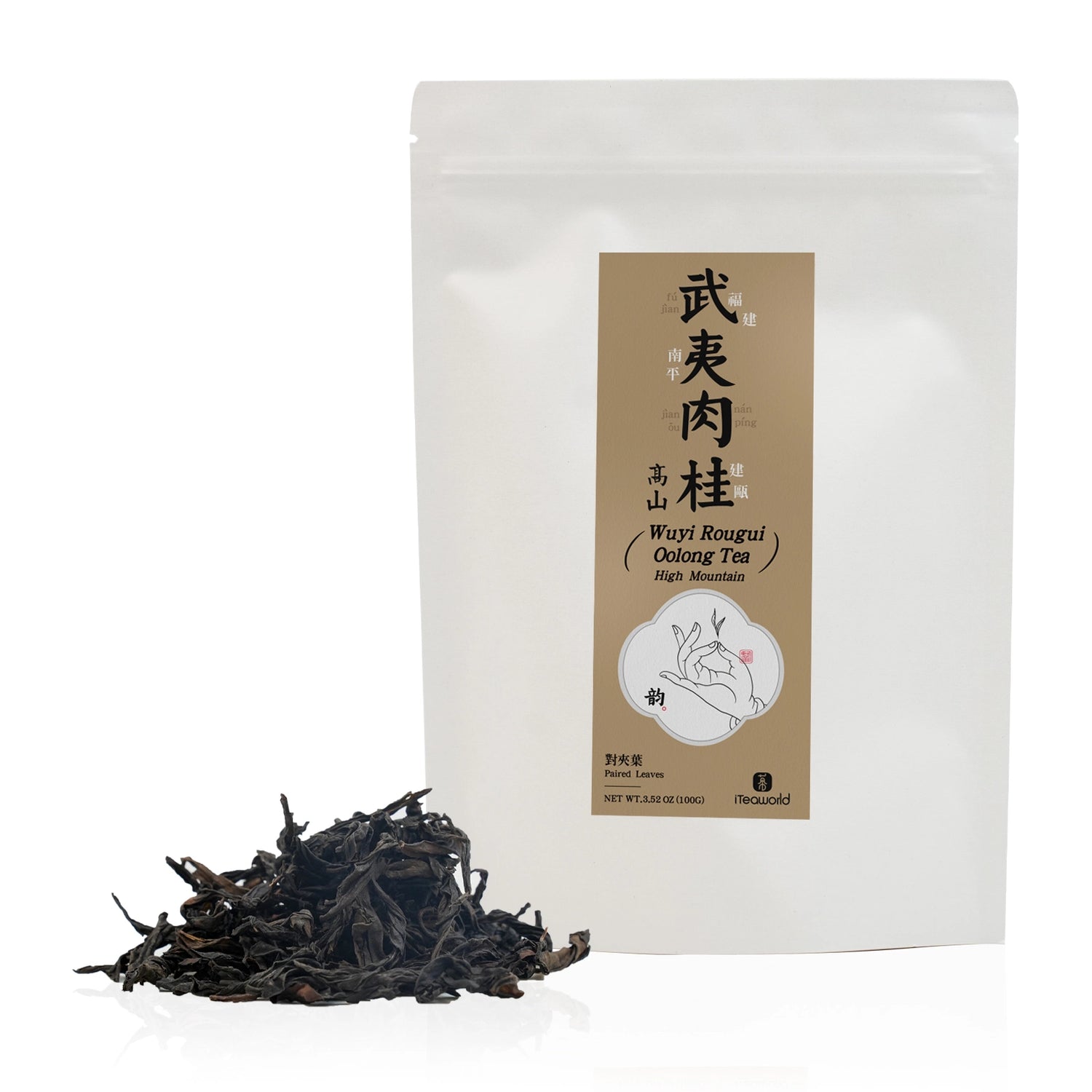

Jian’ou Wuyi Rou Gui (High Mountain) Oolong – Daily Friendly(Spring 2025)
From $1.99 USD
Unit price perJian’ou Wuyi Rou Gui (High Mountain) Oolong – Daily Friendly(Spring 2025)
From $1.99 USD
Unit price perWuyi Rou Gui (High Mountain Cinnamon Rock Oolong) | 武夷高山肉桂
Introduction
Rou Gui is one of the most iconic Wuyi rock oolongs, known for its bold, spicy character and its signature cinnamon-like aroma. Grown in rocky, mineral-rich soils and charcoal-roasted to perfection, it delivers a complex, full-bodied cup with layered notes of roasted spice, dark fruit, and wet stone.
This tea is sourced from Baizhang Village in Xiaoqiao Town, located just outside the Wuyishan core scenic area. Though not within the official “Zheng Yan” zone, Baizhang boasts over 1,000 years of tea-making history and was once a producer of imperial tribute teas. At 730m elevation, its high-mountain terroir—misty climate, sandy-gravel soils, and rich mineral content—meets the classic criteria for producing exceptional rock oolong at outstanding value.
After extensive tasting of Rou Gui from across Wuyi’s top areas, we selected this tea for its exceptional balance of flavor, structure, and price—making it our top choice for a daily drinking Rou Gui with true character.
This tea was freshly roasted on September 3 and is recommended to be stored for a period of time before drinking.
Why shouldn’t freshly roasted Oolong tea be consumed right away?
Right after roasting, the tea has a strong charcoal aroma that can mask its natural fragrance and flavor. It also retains a certain “fiery” quality — caffeine and tea polyphenols remain high, making the taste slightly harsh or astringent and potentially irritating to the throat or stomach. Drinking it too soon can also lead to a feeling of internal heat, especially for those prone to “heatiness” or during dry seasons, known in traditional Chinese medicine as “shang huo” (excess internal heat). These symptoms quickly subside once consumption stops.
To avoid discomfort, let the tea rest before drinking. This allows the fire taste to fade (“tui huo”) and the tea’s components to stabilize. Once rested, the tea becomes smoother and more balanced in both aroma and flavor. Lightly roasted teas need about 1–2 months to rest, while medium to heavily roasted ones require around 6 months.
Origin: Baizhang Village, Xiaoqiao Town, Jianou City, Fujian, China | 730m
Roasting: Traditional charcoal roasting (briquetting method)
Tea Maker: Zheng Xiongqing, veteran tea artisan from a multi-generation tea-making family
Cultivar: Rou Gui
Harvest: 2025 (Spring)
Oxidation: Medium-high (50–60%)
Roast: Medium-Heavy (charcoal roasted)
Shelf Life: 3 years
Storage: Store in an airtight container in a cool, dry, odor-free place. For longer storage or to encourage aging, avoid frequent air exposure.
Brewing
-
Vessel: Porcelain gaiwan / clay teapot
-
Water: 100ml spring/pure water : 5g tea | 100°C / 212°F
-
Steeping:
-
1st–3rd infusions: 10–15 seconds
-
Subsequent infusions: Add 5–7 seconds each round
-
Suitable for up to 8–10 infusions
-
Flavor
-
Aroma: Roasted spice, cinnamon, mineral-rich
-
Taste: Bold and warming, with dark fruit and rock minerality
-
Mouthfeel: Thick, structured, with long-lasting resonance
-
Aftertaste: Lingering “rock rhyme” (岩韵) with spicy finish
Occasions
-
Morning focus (stimulating and grounding)
-
Post-meal clarity (cuts through heaviness)
-
Ideal daily Wuyi oolong for bold flavor lovers
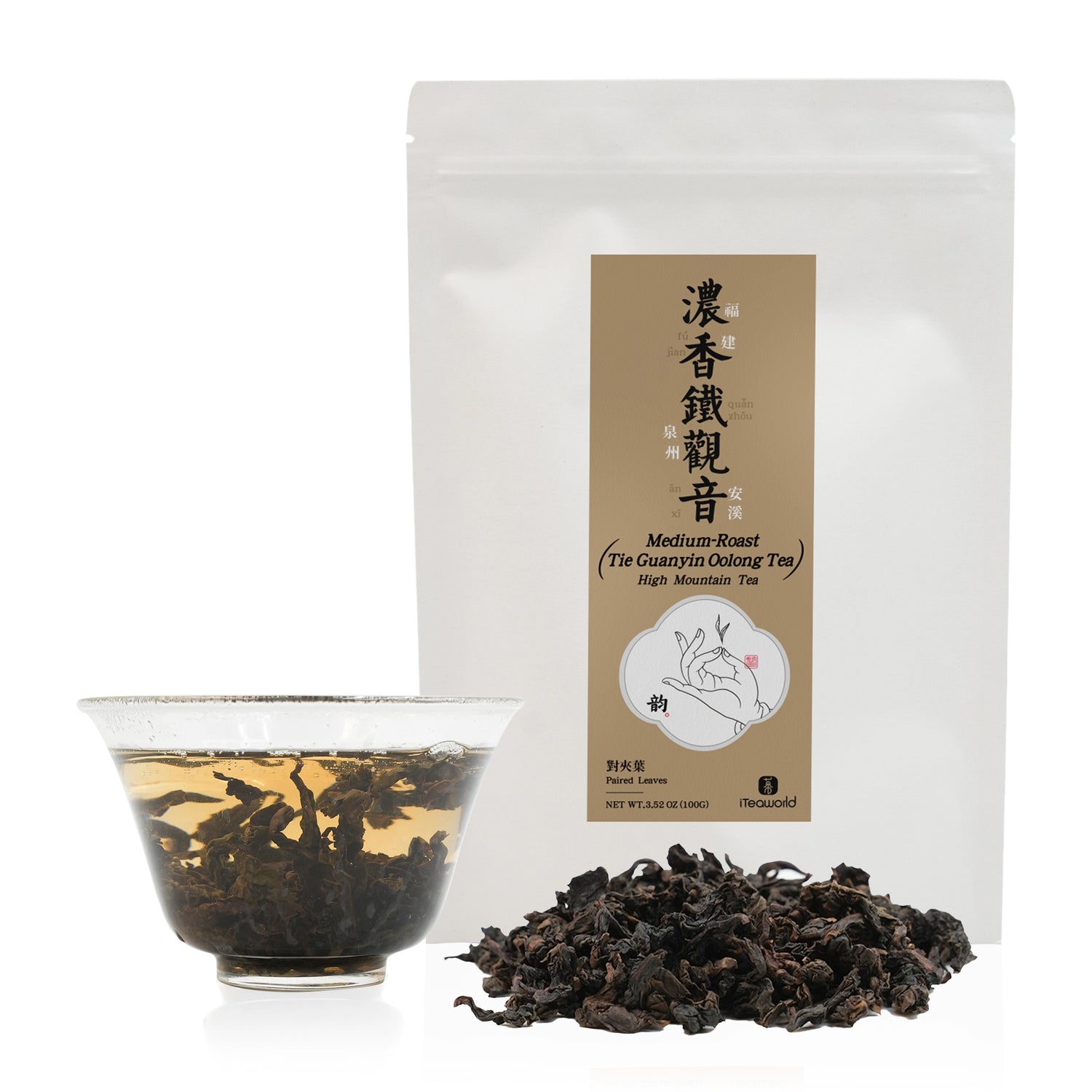
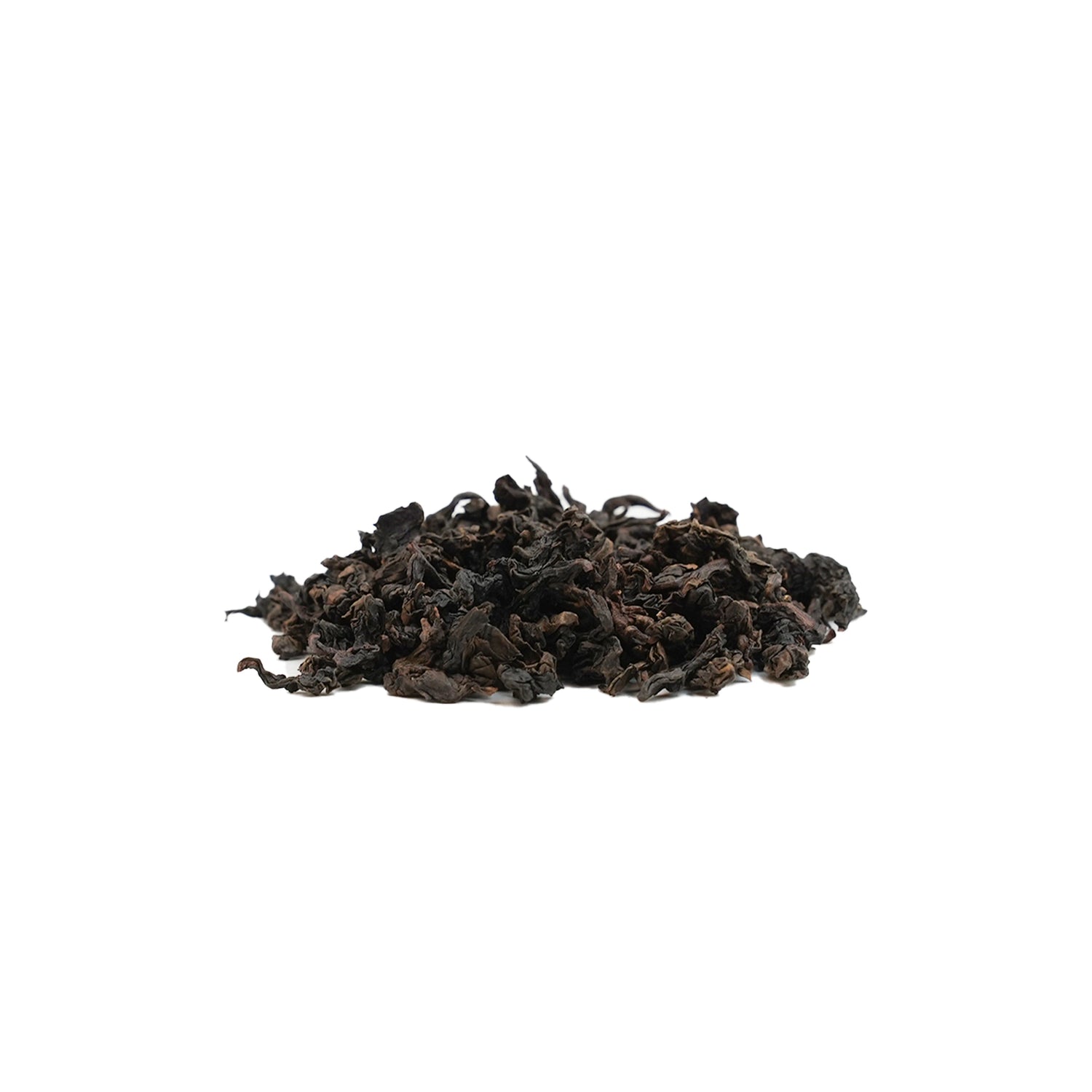
Anxi Tie Guan Yin (Traditional Charcoal-Roasted Oolong) for Daily Enjoyment
$18.99 USD
Unit price perAnxi Tie Guan Yin (Traditional Charcoal-Roasted Oolong) for Daily Enjoyment
$18.99 USD
Unit price perTie Guan Yin (Traditional Charcoal-Roasted Oolong) | 浓香型铁观音(炭焙)
Introduction
Tie Guan Yin is one of the most iconic oolong teas from China’s Fujian province. While its light-roast counterpart is known for floral fragrance, this traditional roasted style highlights a different spectrum—mellow body, dried fruit depth, and layered complexity.
This tea comes from Longjuan Village in Anxi, grown at 800–1000m elevation in sandy, well-drained soils surrounded by frequent mists. The region is known for producing small-batch charcoal-roasted Tie Guan Yin with strong aging potential and rich aroma.
Crafted by Wang Zhiyuan, a veteran tea maker, this 2024 spring harvest features tightly rolled leaves, roasted over low charcoal heat. Expect caramel sweetness, notes of longan and jujube, and a honeyed aftertaste. It’s a refined yet accessible choice for those who enjoy structure, warmth, and endurance in their oolongs.
Origin: Longjuan Village, Longjuan Township, Anxi County, Fujian, China | 800–1000m
Roasting: Traditional charcoal roasting (light-medium fire)
Tea Maker: Wang Zhiyuan, seasoned tea artisan with local acclaim
Cultivar: Tie Guan Yin
Harvest: Autumn Tea, 2024
Oxidation: Medium (45–55%)
Roast: Light to medium (Charcoal roasted)
Suitable for: Daily drinking, cooler seasons, or fans of roasted, full-bodied oolong
Shelf Life: 3–5 years
Storage: Store in an airtight container away from light, heat, and moisture. Best consumed within 1–2 years for peak aroma; suitable for slow mellowing.
Brewing
Vessel: Yixing clay teapot or porcelain gaiwan
Water: 100ml spring/pure water : 5g tea | 100°C / 212°F
Steeping:
-
1st–3rd infusions: 10 seconds
-
Later infusions: Add 5–10 seconds per steep
-
Can be brewed up to 8–10 times
Flavor Profile
Aroma: Caramel, roasted rice, longan, jujube, hint of smoke
Taste: Full-bodied and mellow, with sweet dried fruit and subtle char
Mouthfeel: Silky and rounded, with thick liquor and soft finish
Aftertaste: Honeyed, clean, and slightly mineral—lingers on the palate
Best Enjoyed When...
-
You’re looking for a warming, cozy oolong for cooler days
-
You enjoy roasted teas with depth, but not too much bitterness
-
You want a red wine–like oolong: structured, smooth, and complex


Jian’ou Wuyi Shui Xian (High Mountain, 30-50 years Old Bush) Oolong for Daily 2025
From $1.99 USD
Unit price perJian’ou Wuyi Shui Xian (High Mountain, 30-50 years Old Bush) Oolong for Daily 2025
From $1.99 USD
Unit price perWuyi Shui Xian (High Mountain, Old Bush)
Wuyi Shui Xian is one of the signature cultivars of Wuyi rock oolong. it combines rich floral aroma with a thick, velvety liquor. Originating in the Qing dynasty, Shui Xian is the only semi-arbor cultivar among Wuyi teas. Old bush (lao cong) trees—typically 50+ years—produce deeper, smoother infusions with forest-like clarity, woodsy depth, and signature “cong” flavor. Compared to newer bushes, old trees yield higher amino acids and lower bitterness, making them more enduring in brews and suitable for medium charcoal roast.
This tea is sourced from Baizhang Village in Xiaoqiao Town, just outside the Wuyishan core scenic area. With a 1,000-year legacy of tea production and imperial tribute history, Baizhang sits at 730m elevation in the southeast Wuyi Mountains. The terroir—constant mist, gravelly soil, and rich minerals—creates optimal conditions for deep, layered teas at a more accessible price point.
We compared several Shui Xian teas from within the Wuyi core and selected this high-mountain, old-bush version for its mature flavor, authentic craftsmanship, and outstanding value. With a taste profile reminiscent of 40–50-year-style Shui Xian, this tea is not only beginner-friendly but also worthy of daily storage and long-term appreciation by seasoned drinkers.
Origin: Baizhang Village, Xiaoqiao Town, Jian ou City, Fujian, China | Elevation: 730m
Roasting: Traditional charcoal roasting
Tea Maker: Zheng Xiongqing, veteran tea artisan from a multi-generation tea family
Cultivar: Shui Xian (approx. 30-50 year-old bushes)
Harvest: Spring 2025
Oxidation: Medium (40–50%)
Roast: Medium (charcoal roasted)
Suitable for: Daily drinking, mellow-flavor lovers, aged bush oolong enthusiasts
Shelf Life & Storage
Shelf Life: 5+ years (aging possible but not required)
Storage: Store in an airtight container in a cool, dry, odor-free place. No refrigeration needed. For longer-term storage, avoid frequent air exposure.
Brewing Guidelines
-
Vessel: Porcelain gaiwan or clay teapot
-
Water: 5g tea : 100ml spring or filtered water | 100°C / 212°F
-
Steeping:
-
Infusions 1–3: 10–15 seconds
-
Add 5–7 seconds per infusion thereafter
-
Yields 8–10 infusions
-
Flavor Profile
-
Aroma: Toasted wood, orchid, subtle aged sweetness
-
Taste: Smooth and clean, with soft florals, wood, and a gentle roasted finish
-
Mouthfeel: Round and mellow, light astringency
-
Aftertaste: Light and lasting, with a comforting warmth; “rock rhyme” (Yan Yun) is subtle
Best Enjoyed When...
-
You prefer a softer, more approachable Wuyi oolong
-
You want a daily tea with the depth of older bushes
-
You’re exploring non-Zhengyan teas with high value and honest craftsmanship
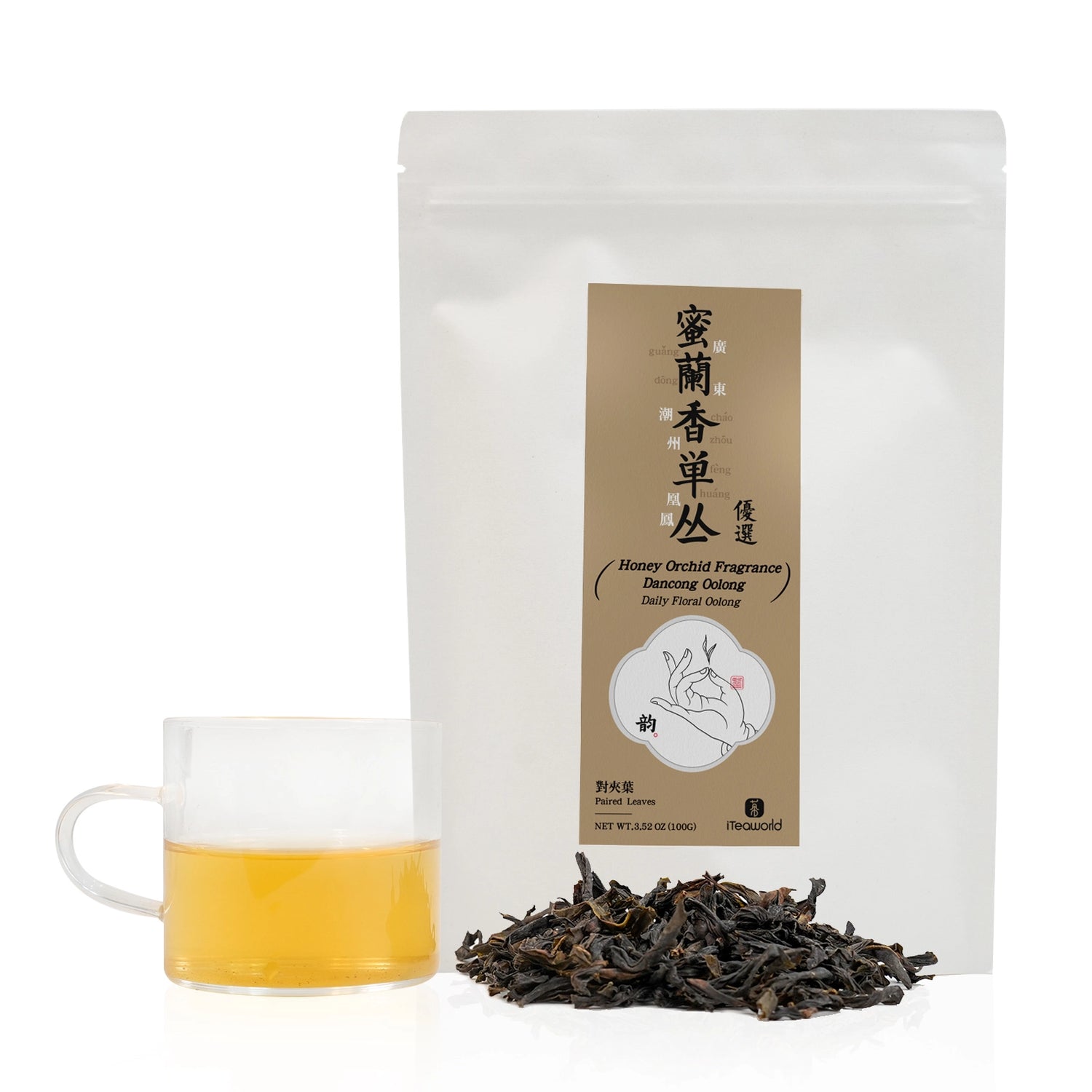
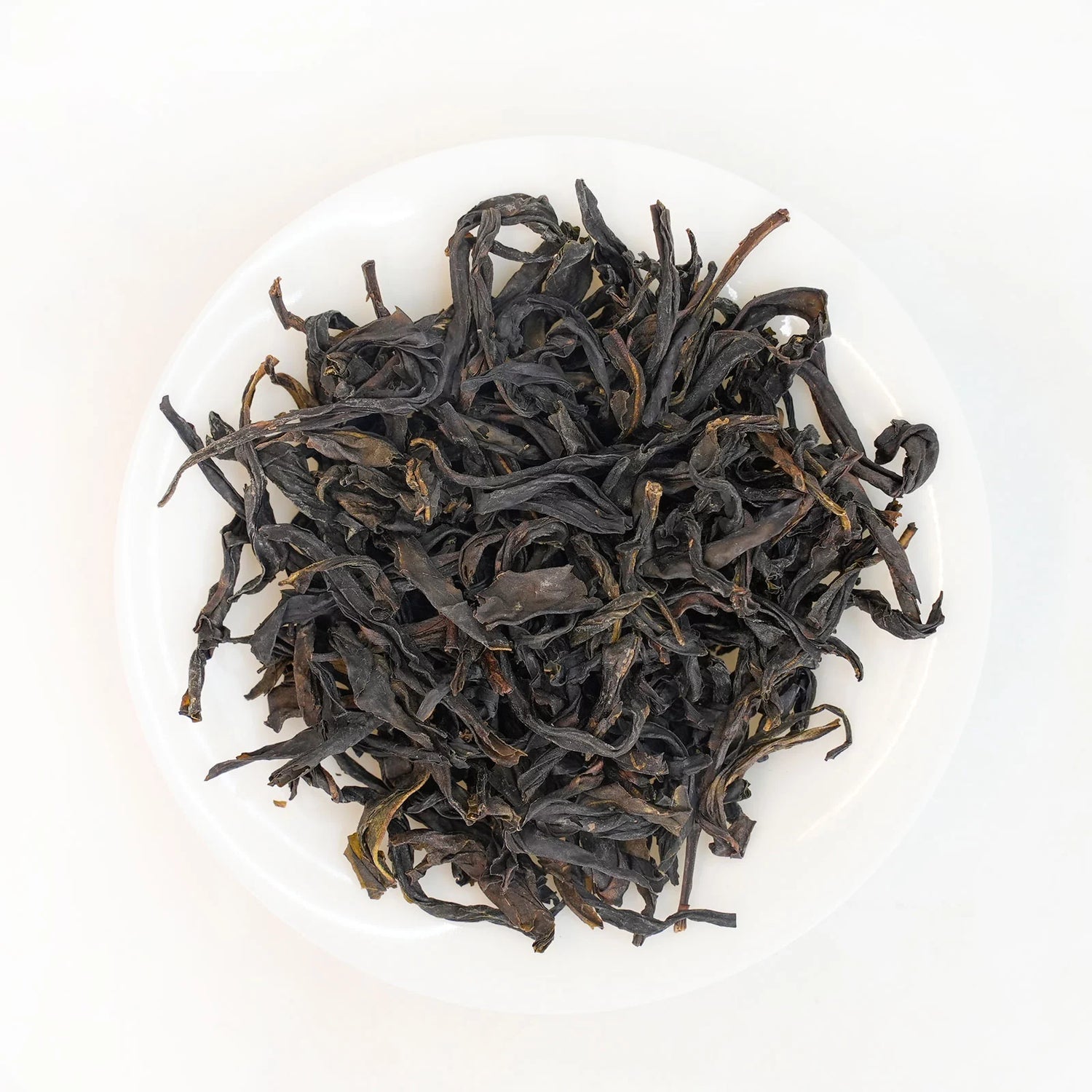
Mi Lan Xiang Dancong (Honey Orchid Aroma) oolong tea 100g for daily use (2025 spring)
$24.99 USD
Unit price perMi Lan Xiang Dancong (Honey Orchid Aroma) oolong tea 100g for daily use (2025 spring)
$24.99 USD
Unit price perFenghuang Dancong (Mi Lan Xiang)|凤凰单枞蜜兰香
Introduction
Mi Lan Xiang Dancong is one of the most celebrated Phoenix Dancong oolongs, known for its naturally rich honey-orchid aroma. The medium-twisted, dark dry leaves brew into a golden amber liquor, offering a full-bodied taste with layers of floral and fruity sweetness. Its nectar-like smoothness lingers across multiple infusions, with a refreshing aftertaste that deepens as you brew.
This tea comes from a village located in one of the premium zones for Zhongshan Dancong—an area recognized by locals as the gateway to the high-mountain growing region. Teas from this zone are considered top-grade among commercial Dancongs, offering exceptional quality for the price. The tea is crafted by a seasoned tea maker from a family with a long tradition of tea-making, with over 20 years of hands-on experience.
Origin: Fengxi Village, Fenghuang Town, Guangdong | 500m
Oxidation: 40-50% | Roast: Medium (100-120°C, 6-10h)
Tea Maker: Liu Chengpeng, a second-generation tea artisan with over 20 years of tea-making experience in a family that has crafted Dancong tea for generations.
Cultivar: Mi Lan Xiang Dancong
Harvest: April 2025 (Spring)
Elevation: 500-600m
Oxidation: Medium (40–50%)
Roast: Light (traditional charcoal finishing)
Shelf Life: 3 years
Storage: Store in an airtight container in a cool, dry, and odor-free place. For light-roasted Dancong, refrigeration is recommended to preserve its floral aroma.
Brewing
Vessel: Porcelain gaiwan / thin clay pot
Water: Spring/pure, 100ml : 5g tea, 100°C|212°F
Steeping: 1st-3rd: 8-12s; 4th-7th: +5-10s per steep
Flavor
Aroma: Orchid (main), honey, ripe fruit notes
Taste: Thick like honey | Smooth as nectar
Aftertaste: Lingering >1min, cooling floral finish
Occasions
Morning indulgence (energizing yet smooth)
Afternoon relaxation (floral aroma soothes the mind)
Cold brew (4°C, 2h; enhances fruity notes)


Premium Lingtou Dancong (Honey Orchid) The Everyday Honey-Sweet Oolong 100g 2025
$24.99 USD
Unit price perPremium Lingtou Dancong (Honey Orchid) The Everyday Honey-Sweet Oolong 100g 2025
$24.99 USD
Unit price perLingtou Dancong | The Everyday Honey-Sweet Oolong
A smooth, affordable, and incredibly drinkable oolong with long-lasting honeyed sweetness—perfect for daily sipping and afternoon tea.
If you're looking for a "universal" tea that’s easy to love, pairs beautifully with desserts, and delivers consistent quality without breaking the bank—Lingtou Dancong is the one. Known for its mellow honey character and exceptional value, this tea could become the next “sweet icon” of Chinese tea, right after jasmine.
Tea Details
-
Cultivar: Bai Ye Dancong (White Leaf Dancong)
-
Harvest: Spring 2025
-
Origin: Lingtou Village, Fubin Town, Raoping County, Chaozhou, Guangdong
-
Elevation: 500–700m
-
Tree Age: Under 30 years
-
Roast: Traditional charcoal roast
Why You Need to Try It
-
Love sweet tea? Its thick honey note rivals most oolongs—and even some black teas.
-
Seeking value? This is one of the most affordable yet flavorful Dancong oolongs.
-
Exploring the diversity of Guangdong oolong? Lingtou is a classic, but outside the better-known Phoenix Dancong system.
Origin & Story: Sweetness Born in the Mountains
Lingtou Dancong, also called Bai Ye Dancong (White Leaf Dancong), comes from Lingtou Village in Raoping County, Chaozhou, Guangdong. First cultivated in 1961, it was selected from wild Phoenix Shui Xian trees and now accounts for over 50% of tea garden area in Guangdong.
-
Cultivar: Small-tree, large-leaf type
-
Elevation: 500–700m
-
Soil: Mountain red clay with good drainage
-
Climate: Warm, misty, ideal for floral and honey aroma development
Flavor Profile: Rich Honey, Soft Floral, Easy to Love
Lingtou Dancong offers a bright, golden infusion with high floral aroma and a distinctive “mi yun” (honey rhyme)—a signature note prized by Chaozhou tea drinkers. It’s:
-
Sweet and smooth, never bitter
-
Medium-thick in body, with a lingering aftertaste
-
Great for pairing with pastries, fruit, or just a peaceful afternoon
Flavor Comparison:
-
Lingtou Mi Lan Xiang (Honey Orchid): Emphasizes honey, subtle florals
-
Phoenix Mi Lan Xiang: Emphasizes orchid, with lighter honey undertone
“A honey-sweet tea you can drink every day and never get tired of.”
Brewing Recommendations
Gongfu Style:
-
5g per 100ml gaiwan
-
95-100°C water
-
Quick rinse, then infuse 6–8+ times starting from 10 seconds
Western Brewing:
-
2g per 200ml
-
Steep at 95–100°C for 1–3 minutes
-
Can re-steep 2–3 times
-
Ya Shi Xiang (Duck Shit) Dan cong Oolong | The Icon of Guangdong Tea
The most famous Dancong oolong from Phoenix Mountain—misleading name, unforgettable taste.
Ya Shi Xiang, literally “Duck Shit Aroma,” is arguably the most well-known Phoenix Dancong oolong internationally. Despite its name, this tea is anything but unpleasant. In fact, it’s often referred to as the “calling card” of Guangdong oolongs, thanks to its bold floral fragrance, silky mouthfeel, and memorable backstory.
Tea Details
-
Cultivar: Ya Shi Xiang (Duck Shit )
-
Harvest: Spring 2025
-
Origin: DingYao Village, Fenghuang Town, Chaozhou, Guangdong, China
-
Elevation: 500-600m
-
Roasting: Traditional charcoal roast
A Legendary Tea with a Mysterious Name
This cultivar got its odd name from the mineral-rich yellow soil where it was originally planted—called “duck shit soil” (鸭屎土) by locals to discourage theft due to the tree’s extraordinary fragrance. Others say the name also comes from the leaf shape, which resembles the leaves of a local tree known as “duck foot wood.”
The original mother tree, now over 300 years old, grows at Pingkengtou Village (坪坑头) at 900m elevation in Phoenix Mountain, Chaozhou. Today, Pingtou is considered the most prestigious origin of Ya Shi Xiang.
Our selection comes from Dingdongjiao, a nearby village sharing the same terroir, altitude, and tree lineage—but with more accessible pricing.
Flavor Profile: Golden Honeysuckle, Orchid, and Ripe Peach
Officially categorized as “Yin Hua Xiang” (Honeysuckle Aroma), Ya Shi Xiang carries a fragrant bouquet of:
-
Orchid and honeysuckle (dominant)
-
Peach nectar or creamy vanilla (in higher grades)
-
Light bitterness on entry that melts into a long, sweet aftertaste
Its flavor is bright, floral, and juicy, making it one of the most beginner-friendly teas in the Dancong family—especially for those who love high-aroma oolongs.
“A tea with a silly name, but serious elegance.”
Brewing Recommendations
Gongfu Style (Recommended):
Teaware: Gaiwan or small teapot (100–150ml)
Tea Amount: 5g
Water Temp: 95-100℃/203-212℉
Infusion Time: Start at 10–15 seconds; can go 7+ infusions
Western-style Brewing:
2g per 100ml
1-3 minutes,95-100℃/203-212℉
Re-steep 2–3 times
Recently viewed products
Chat with fellow tea lovers, ask questions, and share your tea moments.
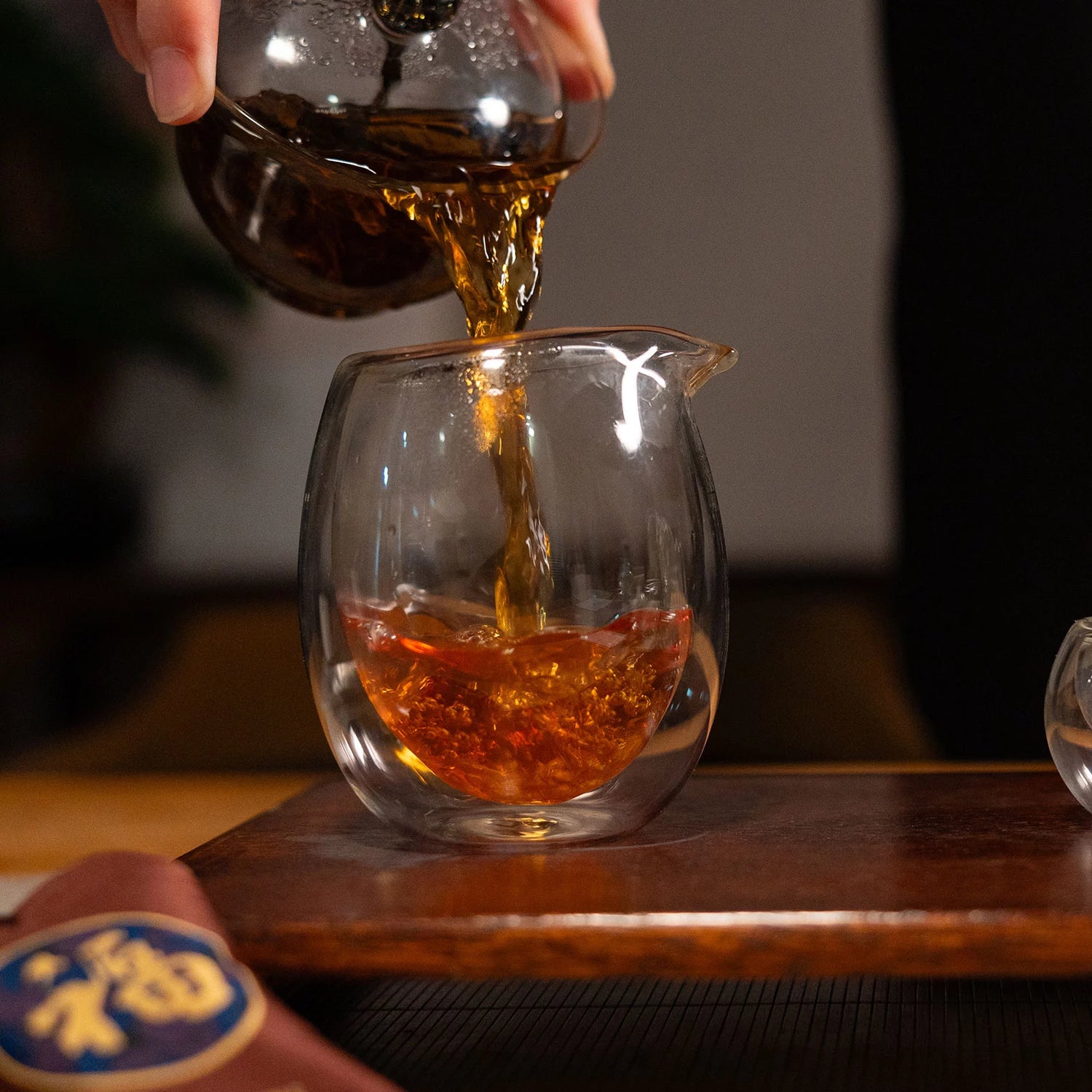
FAQs
Certainly! Here's a list of the types of Chinese teas we offer:
Black Tea
We have a black tea sampler, including Yingde Black Tea, Yunnan Black Tea and Souchong Black Tea.
Oolong Tea
We have special premium oolong tea sampler, as well as introductory oolong tea sampler, and individual teas such as Fenghuang Dancong, Da hong pao, Tieguanyin, and more!
Green Tea
You'll love the premium Green Tea Sampler, featuring six Chinese green teas, all the best green teas!
Jasmine Tea
For those who love jasmine tea, don't miss our Chinese jasmine tea sampler, which contains four different jasmine tea samplers, all fresh jasmine flowers blended with green tea!
Cold Brew Tea
We have selected the best Chinese teas for cold brewing to make a cold brew tea sampler.
This is our very best tea sampler! It contains the six main types of Chinese teas, and you get a representative variety of each type of tea, perfect for all tea lovers!
Remember, drinking good tea is not as good as drinking the right tea!
iTeaworld offers an extensive selection of Chinese teas, all available as loose leaf tea varieties. Our range includes black tea, green tea, oolong tea, cold brew tea, jasmine tea, and puerh teas, among others. A standout feature is our tea sampler, each thoughtfully curated to embody the rich cultural heritage of China.
Classic Tea Sampler is ideal for beginners.
If you have a higher budget, you can choose the Chinese Tea Sampler for $39.99. It contains six types of Chinese teas, including oolong tea, black tea, green tea, yellow tea, white tea, and black tea.
Chinese tea is unique due to its long history, diverse varieties and traditional production methods. It is usually handmade and undergoes specific processing techniques to produce a wide range of flavors and aromas.
Chinese tea is usually a tea without any additives or extra sugar. It is a healthier alternative to coffee.
Chinese tea is usually one of the best loose leaf teas, which has a stronger flavor.
Chinese tea usually has many health benefits, such as lowering blood lipids for dark tea, nourishing the stomach for black tea, and antioxidant for green tea.
There are many different types of Chinese loose leaf tea, each with its own unique flavor and aroma. The most common types of Chinese loose leaf tea include:
Black tea: Black tea is the most processed type of Chinese tea and has a strong, robust flavor. Some popular black teas include Lapsang Souchong, Keemun, and Yunnan.
Green tea: Green tea is the least processed type of Chinese tea and has a fresh, grassy flavor. Some popular green teas include Longjing, Bi Luo Chun, and Gunpowder.
Oolong tea: Oolong tea is a type of tea that is partially oxidized, resulting in a flavor that falls between green tea and black tea. Some popular oolong teas include Tieguanyin, Da Hong Pao, and Dong Ding.
White tea: White tea is a type of tea that is made from young tea leaves and has a delicate, floral flavor. Some popular white teas include Silver Needle, White Peony, and Long Jing.
Pu-erh tea: Pu-erh tea is a type of fermented tea that has a strong, earthy flavor. Some popular pu-erh teas include Shu Pu-erh and Sheng Pu-erh.





